Because we're obsessed with lists, and because, what the heck, it's fun, I've ranked my Top 112 (or so) films noir here. "But Noirharajah," you might well say, "why did you make a list of your favorite noirs that totally ignores some movies you've rated highly on your Nattering Nabob of Noir page?" The answer is, because I'm the Noirharajah, and I can. There are simply some film noirs (Mean Streets by Martin Scorsese comes to mind) that demand to be highly rated because they had great influence on films that followed. I recognize their genius. That doesn't mean I particularly enjoy watching them more than once. THIS list is for those films that I can watch over and over and over again without getting bored. These are my favorites. No more, no less. Of course, the whole thing is a completely cockamamie exercise, beauty being in the eye of the beholder (or B-movie holder), but here it is anyway. Ask me tomorrow and this list could be quite different. But, for today, this is what I've got:
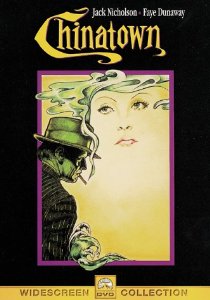
1. CHINATOWN (1974)
Directed by Roman Polanski. Starring: Jack Nicholson, Faye Dunaway.
It doesn't get more exquisitely noir than Roman Polanski's hauntingly beautiful and devastating indictment of corruption in early 20th century L.A. Jack Nicholson stars as Jake Gittes, a sleazy bedroom dick investigating what seems at first like an adultery case, but instead leads to murder and conspiracy involving the city's water supply. Polanski flawlessly directs Robert Towne's brilliant screenplay, and Jerry Goldsmith's score provides a beautifully-layered background. Faye Dunaway and John Huston are excellent as the beguiling femme fatale (or is she just a victim?) Evelyn Mulwray and her father. Top notch on every level. *****
Directed by Roman Polanski. Starring: Jack Nicholson, Faye Dunaway.
It doesn't get more exquisitely noir than Roman Polanski's hauntingly beautiful and devastating indictment of corruption in early 20th century L.A. Jack Nicholson stars as Jake Gittes, a sleazy bedroom dick investigating what seems at first like an adultery case, but instead leads to murder and conspiracy involving the city's water supply. Polanski flawlessly directs Robert Towne's brilliant screenplay, and Jerry Goldsmith's score provides a beautifully-layered background. Faye Dunaway and John Huston are excellent as the beguiling femme fatale (or is she just a victim?) Evelyn Mulwray and her father. Top notch on every level. *****
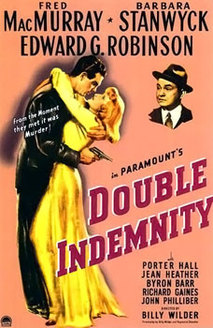
2. DOUBLE INDEMNITY (1944)
Directed by Billy Wilder. Starring: Barbara Stanwyck, Fred MacMurray, Edward G. Robinson.
The consummate noir, based on the novel by James M. Cain. This is the film that set the standard by which all other noirs are measured. Barbara Stanwyck takes Fred MacMurray straight down the line, and the last stop is the cemetery, much to Edward G. Robinson's chagrin. Stanwyck is brilliant as Phyllis Didrickson, the quintessential femme fatale, blonde, sexy, and evil; MacMurray, as insurance salesman Walter Neff, is perfect as the sharp shlub who's out of his depth but doesn't realize it until it's too late; and Edward G. Robinson nearly steals the show as Keyes, the brilliant insurance investigator with the little man inside him that gnaws at the pit of his stomach. Oh, yeah, and Billy Wilder directed and co-wrote with some guy named Raymond Chandler. What more do you want in a noir? *****
Directed by Billy Wilder. Starring: Barbara Stanwyck, Fred MacMurray, Edward G. Robinson.
The consummate noir, based on the novel by James M. Cain. This is the film that set the standard by which all other noirs are measured. Barbara Stanwyck takes Fred MacMurray straight down the line, and the last stop is the cemetery, much to Edward G. Robinson's chagrin. Stanwyck is brilliant as Phyllis Didrickson, the quintessential femme fatale, blonde, sexy, and evil; MacMurray, as insurance salesman Walter Neff, is perfect as the sharp shlub who's out of his depth but doesn't realize it until it's too late; and Edward G. Robinson nearly steals the show as Keyes, the brilliant insurance investigator with the little man inside him that gnaws at the pit of his stomach. Oh, yeah, and Billy Wilder directed and co-wrote with some guy named Raymond Chandler. What more do you want in a noir? *****
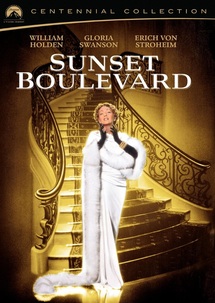
3. SUNSET BOULEVARD(1950)
Directed by Billy Wilder. Starring: William Holden, Gloria Swanson.
If anyone tries to tell you this isn't noir, point out the fact that the story is told in flashback by a guy who -- at the beginning of the film -- is found floating face down in the fancy Hollywood swimming pool he always wanted, and sold his soul to get. Top-notch writing and Billy Wilder's uncanny direction, a powerhouse performance for the ages by Gloria Swanson, plus great work from the rest of the cast, led by William Holden. And I didn't even mention the monkey funeral. A classic of American cinema. *****
Directed by Billy Wilder. Starring: William Holden, Gloria Swanson.
If anyone tries to tell you this isn't noir, point out the fact that the story is told in flashback by a guy who -- at the beginning of the film -- is found floating face down in the fancy Hollywood swimming pool he always wanted, and sold his soul to get. Top-notch writing and Billy Wilder's uncanny direction, a powerhouse performance for the ages by Gloria Swanson, plus great work from the rest of the cast, led by William Holden. And I didn't even mention the monkey funeral. A classic of American cinema. *****
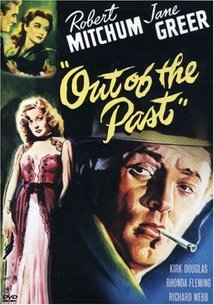
4. OUT OF THE PAST (1947)
Directed by Jacques Tourneur. Starring: Robert Mitchum, Jane Greer.
Quintessential noir, featuring perhaps noir's quintessential leading man: Robert Mitchum at his "Baby I don't care!" best. Look up "femme fatale" in the dictionary and you'll find an etching of Jane Greer's Kathy Moffat. Add Kirk Douglas (in just his second film role) as the slick heavy, a deliciously dark and convoluted storyline based on James M. Cain's novel Build My Gallows High, Nicholas Musuraca's dark cinematography, and Jacques Tourneur's direction, and it equals near noir perfection. A must. ****1/2
Directed by Jacques Tourneur. Starring: Robert Mitchum, Jane Greer.
Quintessential noir, featuring perhaps noir's quintessential leading man: Robert Mitchum at his "Baby I don't care!" best. Look up "femme fatale" in the dictionary and you'll find an etching of Jane Greer's Kathy Moffat. Add Kirk Douglas (in just his second film role) as the slick heavy, a deliciously dark and convoluted storyline based on James M. Cain's novel Build My Gallows High, Nicholas Musuraca's dark cinematography, and Jacques Tourneur's direction, and it equals near noir perfection. A must. ****1/2
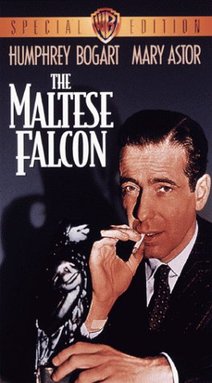
5. THE MALTESE FALCON (1941)
Directed by John Huston. Starring: Humphrey Bogart, Mary Astor, Peter Lorre.
Based on Dashiell Hammett's extraordinary novel, this was screen legend John Huston's directorial debut. Humphrey Bogart (thanks to George Raft for turning it down) is flawless as tough and cynical San Francisco P.I. Sam Spade, the role that redefined the Private Eye in movies. Spade is hired -- along with his leering partner, Miles Archer -- by the attractive and seemingly naïve Brigid O'Shaughnessy (Mary Astor, great as one of noir's classic femme fatales) to follow a man named Floyd Thursby. When Archer ends up dead with a bullet in his pump, the pressure is on Spade to unravel the ever-deepening mystery. Yes, it's a bit talky, but this early noir still holds up as one of the classic mysteries of all time, with a deliciously dark ending and great performances from a great cast, including Peter Lorre, Sydney Greenstreet (in his film debut), and Elisha Cook, Jr. Simply splendid, or, as Sam Spade might say, "The stuff that dreams are made of." ****1/2
Directed by John Huston. Starring: Humphrey Bogart, Mary Astor, Peter Lorre.
Based on Dashiell Hammett's extraordinary novel, this was screen legend John Huston's directorial debut. Humphrey Bogart (thanks to George Raft for turning it down) is flawless as tough and cynical San Francisco P.I. Sam Spade, the role that redefined the Private Eye in movies. Spade is hired -- along with his leering partner, Miles Archer -- by the attractive and seemingly naïve Brigid O'Shaughnessy (Mary Astor, great as one of noir's classic femme fatales) to follow a man named Floyd Thursby. When Archer ends up dead with a bullet in his pump, the pressure is on Spade to unravel the ever-deepening mystery. Yes, it's a bit talky, but this early noir still holds up as one of the classic mysteries of all time, with a deliciously dark ending and great performances from a great cast, including Peter Lorre, Sydney Greenstreet (in his film debut), and Elisha Cook, Jr. Simply splendid, or, as Sam Spade might say, "The stuff that dreams are made of." ****1/2
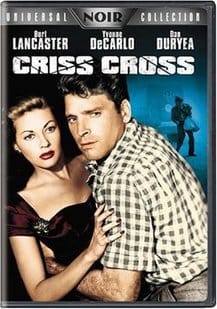
6. CRISS CROSS (1949)
Directed by Robert Siodmak. Starring: Burt Lancaster, Yvonne De Carlo, Dan Duryea.
This often overlooked noir gets better and more powerful with each viewing. Reuniting with director Siodmak after their success with The Killers, Burt Lancaster plays Steve Thompson, another sad sap, who seals his dark fate when he returns to Los Angeles after two years on the drift, eager to rekindle his relationship with his ex-wife Anna (Yvonne De Carlo) against all better judgment. From the incredible opening aerial shot (perfected by cinematographer Franz Planer), where the camera zooms in over the L.A. cityscape to the desperate lovers embracing in a nightclub parking lot, you know you're in for something special. Listen closely to the way screenwriter Daniel Fuchs' dialogue repeats itself, giving it a subtle, almost poetic quality. With a cast filled with great noir character actors -- most notably Dan Duryea, even better than usual in a wonderful performance as slick hood Slim Dundee, and the toadlike Percy Helton as Frank the bartender -- this is a tense tour de force of noir. While the plot eventually centers itself around an armored-car heist (the heist itself is an eerie, metaphysical Siodmak masterpiece), the film is really about obsessive love, fate, and betrayal, which ultimately lead to one of the classic and most cynical film noir endings of them all. ****1/2
Directed by Robert Siodmak. Starring: Burt Lancaster, Yvonne De Carlo, Dan Duryea.
This often overlooked noir gets better and more powerful with each viewing. Reuniting with director Siodmak after their success with The Killers, Burt Lancaster plays Steve Thompson, another sad sap, who seals his dark fate when he returns to Los Angeles after two years on the drift, eager to rekindle his relationship with his ex-wife Anna (Yvonne De Carlo) against all better judgment. From the incredible opening aerial shot (perfected by cinematographer Franz Planer), where the camera zooms in over the L.A. cityscape to the desperate lovers embracing in a nightclub parking lot, you know you're in for something special. Listen closely to the way screenwriter Daniel Fuchs' dialogue repeats itself, giving it a subtle, almost poetic quality. With a cast filled with great noir character actors -- most notably Dan Duryea, even better than usual in a wonderful performance as slick hood Slim Dundee, and the toadlike Percy Helton as Frank the bartender -- this is a tense tour de force of noir. While the plot eventually centers itself around an armored-car heist (the heist itself is an eerie, metaphysical Siodmak masterpiece), the film is really about obsessive love, fate, and betrayal, which ultimately lead to one of the classic and most cynical film noir endings of them all. ****1/2
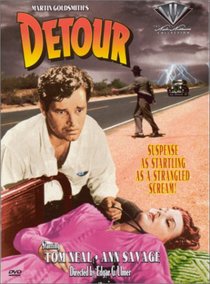
7. DETOUR (1945)
Directed by Edgar G. Ulmer. Starring: Tom Neal, Ann Savage.
Fate puts the finger on Tom Neal in Edgar G. Ulmer’s Poverty Row classic. Neal plays Al Roberts, a down-on-his-luck New York piano player trying to hitchhike his way across country to get to his girlfriend in L.A., but, as Al laments, whichever way he turns, fate sticks out a foot to trip him. Most notably, that foot belongs to femme fatale Vera (Ann Savage), a hard-bitten cookie with a heart like an ice cube. Neal’s road trip gone bad is a bit one-note, but that one note sings, particularly through the haunting, fatalistic script and Savage’s bitter performance. Principle photography was done in six days, and it shows, with the shaky background projection behind Al's doomed convertible ride, but there's more atmosphere in each of the 68 minutes of Detour than there is in films with twice the running time and a thousand times the budget. As Roger Ebert wrote: "Detour is a movie so filled with imperfections that it would not earn the director a passing grade in film school. This movie ... shot in six days, filled with technical errors and ham-handed narrative, starring a man who can only pout and a woman who can only sneer, should have faded from sight soon after it was released in 1945. And yet it lives on, haunting and creepy, an embodiment of the guilty soul of film noir. No one who has seen it has easily forgotten it." ****1/2
Directed by Edgar G. Ulmer. Starring: Tom Neal, Ann Savage.
Fate puts the finger on Tom Neal in Edgar G. Ulmer’s Poverty Row classic. Neal plays Al Roberts, a down-on-his-luck New York piano player trying to hitchhike his way across country to get to his girlfriend in L.A., but, as Al laments, whichever way he turns, fate sticks out a foot to trip him. Most notably, that foot belongs to femme fatale Vera (Ann Savage), a hard-bitten cookie with a heart like an ice cube. Neal’s road trip gone bad is a bit one-note, but that one note sings, particularly through the haunting, fatalistic script and Savage’s bitter performance. Principle photography was done in six days, and it shows, with the shaky background projection behind Al's doomed convertible ride, but there's more atmosphere in each of the 68 minutes of Detour than there is in films with twice the running time and a thousand times the budget. As Roger Ebert wrote: "Detour is a movie so filled with imperfections that it would not earn the director a passing grade in film school. This movie ... shot in six days, filled with technical errors and ham-handed narrative, starring a man who can only pout and a woman who can only sneer, should have faded from sight soon after it was released in 1945. And yet it lives on, haunting and creepy, an embodiment of the guilty soul of film noir. No one who has seen it has easily forgotten it." ****1/2
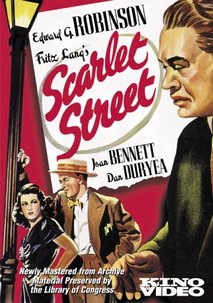
8. SCARLET STREET (1945)
Directed by Fritz Lang. Starring: Edward G. Robinson, Joan Bennett, Dan Duryea.
Edward G. Robinson is mesmerizing as middle-aged milquetoast Chris Cross, a lowly henpecked clerk and amateur painter who falls for gorgeous, heartless prostitute Kitty (Joan Bennett). The more Chris gives her, the more she leads him on, steered from the shadows by Johnny, her sleazy, brutish pimp/lover (the fantastic Dan Duryea). As the pressure builds on Chris to satisfy the scheming Kitty (and Johnny), he plunges headlong into a whirlpool of lust, larceny, and revenge. Full of delicious twists and turns, this is an uncompromising, groundbreaking noir. ****1/2
Directed by Fritz Lang. Starring: Edward G. Robinson, Joan Bennett, Dan Duryea.
Edward G. Robinson is mesmerizing as middle-aged milquetoast Chris Cross, a lowly henpecked clerk and amateur painter who falls for gorgeous, heartless prostitute Kitty (Joan Bennett). The more Chris gives her, the more she leads him on, steered from the shadows by Johnny, her sleazy, brutish pimp/lover (the fantastic Dan Duryea). As the pressure builds on Chris to satisfy the scheming Kitty (and Johnny), he plunges headlong into a whirlpool of lust, larceny, and revenge. Full of delicious twists and turns, this is an uncompromising, groundbreaking noir. ****1/2
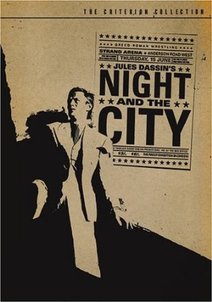
9. NIGHT AND THE CITY (1950)
Directed by Jules Dassin. Starring: Richard Widmark, Gene Tierney.
If Charles Dickens had to make some extra cash by writing Hollywood B-movies in the '40s and '50s, he might have come up with something like Night and the City. Set against the seedy backdrop of London’s wrestling scene, Jules Dassin’s tale of an ambitious hustler whose plans just keep going wrong is noir heaven. Richard Widmark soars as snakebitten conman Harry Fabian, who’d sell out his own mother for a buck, yet somehow gets you to root for him. Gene Tierney is all shiny and radiant as the woman who loves him, despite everything. One of the classic noir endings. ****1/2
Directed by Jules Dassin. Starring: Richard Widmark, Gene Tierney.
If Charles Dickens had to make some extra cash by writing Hollywood B-movies in the '40s and '50s, he might have come up with something like Night and the City. Set against the seedy backdrop of London’s wrestling scene, Jules Dassin’s tale of an ambitious hustler whose plans just keep going wrong is noir heaven. Richard Widmark soars as snakebitten conman Harry Fabian, who’d sell out his own mother for a buck, yet somehow gets you to root for him. Gene Tierney is all shiny and radiant as the woman who loves him, despite everything. One of the classic noir endings. ****1/2
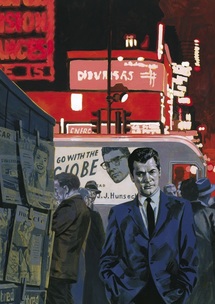
10. SWEET SMELL OF SUCCESS (1957)
Directed by Alexander Mackendrick. Starring: Burt Lancaster, Tony Curtis.
There are no guns, bullets, or blood in Sweet Smell of Success; no shootouts and no dead bodies. But no film is more dark or cruel or filled with the hateful, spiteful, vicious ways in which people treat each other. Tony Curtis gave his best performance as Sidney Falco, a sleazy PR man who will do anything to get publicity for his clients, which means currying favor with powerful, amoral, Walter Winchell-like columnist J.J. Hunsecker (Burt Lancaster -- never better). Hunsecker has 60 million readers and an obsession with his little sister, Suzy (Susan Harrison). When Suzy falls for jazz guitarist Steve Dallas (Martin Milner), Hunsecker will do anything to squash the affair, including smearing Dallas. To that end, he uses the fawning Falco. The screenplay by Clifford Odets and Ernest Lehmann crackles with razor-sharp dialog, and James Wong Howe's black and white photography is dazzling. Add the jazzy score by Elmer Bernstein, which hits all the right notes, and you have one of Hollywood's most intelligent masterpieces. ****1/2
Directed by Alexander Mackendrick. Starring: Burt Lancaster, Tony Curtis.
There are no guns, bullets, or blood in Sweet Smell of Success; no shootouts and no dead bodies. But no film is more dark or cruel or filled with the hateful, spiteful, vicious ways in which people treat each other. Tony Curtis gave his best performance as Sidney Falco, a sleazy PR man who will do anything to get publicity for his clients, which means currying favor with powerful, amoral, Walter Winchell-like columnist J.J. Hunsecker (Burt Lancaster -- never better). Hunsecker has 60 million readers and an obsession with his little sister, Suzy (Susan Harrison). When Suzy falls for jazz guitarist Steve Dallas (Martin Milner), Hunsecker will do anything to squash the affair, including smearing Dallas. To that end, he uses the fawning Falco. The screenplay by Clifford Odets and Ernest Lehmann crackles with razor-sharp dialog, and James Wong Howe's black and white photography is dazzling. Add the jazzy score by Elmer Bernstein, which hits all the right notes, and you have one of Hollywood's most intelligent masterpieces. ****1/2
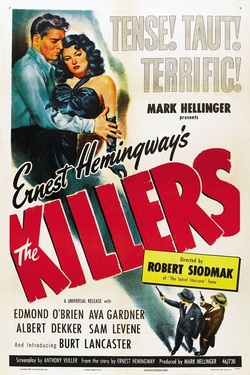
11. THE KILLERS (1946)
Directed by Robert Siodmak. Starring: Burt Lancaster, Ava Gardner, Edmond O'Brien.
As this explosive noir opens, two hired killers swoop menacingly through a small New Jersey town, on a mission to kill an anonymous filling station attendant known as The Swede (Burt Lancaster in his film debut). When The Swede is warned by one of his coworkers, he refuses to run, instead accepting his fate quietly, choosing to wait for the killers to come to his dingy apartment and gun him down. When his friend asks why the two men want to kill him, The Swede -- one of noir's most melancholy fall guys -- says only, "I did something wrong -- once." Based on a short story by Ernest Hemingway, The Killers is told in a series of flashbacks that lead insurance investigator Jeff Reardon (Edmond O'Brien) to an unsolved hat factory heist, a dizzying series of doublecrosses, and one of noir's most alluring femme fatales -- Kitty Collins (Ava Gardner, in her breakout performance). Great performances abound -- including William Conrad and gravel-voiced noir god Charles McGraw as the two ruthless hitmen, Albert Dekker as Big Jim Colfax, the leader of the heist gang, and Sam Levene as an old police lieutenant who's known The Swede from the time they were kids together in the old neighborhood. This is noir to its core. ****1/2
Directed by Robert Siodmak. Starring: Burt Lancaster, Ava Gardner, Edmond O'Brien.
As this explosive noir opens, two hired killers swoop menacingly through a small New Jersey town, on a mission to kill an anonymous filling station attendant known as The Swede (Burt Lancaster in his film debut). When The Swede is warned by one of his coworkers, he refuses to run, instead accepting his fate quietly, choosing to wait for the killers to come to his dingy apartment and gun him down. When his friend asks why the two men want to kill him, The Swede -- one of noir's most melancholy fall guys -- says only, "I did something wrong -- once." Based on a short story by Ernest Hemingway, The Killers is told in a series of flashbacks that lead insurance investigator Jeff Reardon (Edmond O'Brien) to an unsolved hat factory heist, a dizzying series of doublecrosses, and one of noir's most alluring femme fatales -- Kitty Collins (Ava Gardner, in her breakout performance). Great performances abound -- including William Conrad and gravel-voiced noir god Charles McGraw as the two ruthless hitmen, Albert Dekker as Big Jim Colfax, the leader of the heist gang, and Sam Levene as an old police lieutenant who's known The Swede from the time they were kids together in the old neighborhood. This is noir to its core. ****1/2
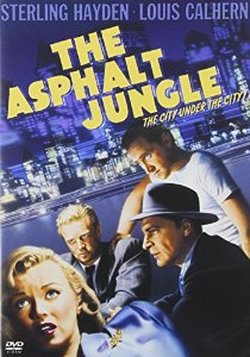
12. THE ASPHALT JUNGLE (1950)
Directed by John Huston. Starring: Sterling Hayden, Sam Jaffe, Louis Calhern.
Perhaps the greatest heist film ever made. Director and co-writer John Huston's simplicity of style and lack of a musical score ratchet up the tension in this powerful tale of a million-dollar jewel robbery. The crooks are masterminded by Doc Reidenschneider (Sam Jaffe), fresh out of the big house. His crew consists of "box man" (safecracker) Louie Ciavelli (Anthony Caruso), hunchbacked diner owner/getaway driver Gus Minissi (James Whitmore), and "hooligan" Dix Handley (Sterling Hayden), who wants the dough to buy back the Kentucky horse farm his father lost during the Depression. Doll Conovan (Jean Hagen) is the simple, big-hearted gal who loves him. Slick and shady lawyer Alonzo Emmerich (Louis Calhern) -- who is dallying behind his sickly wife's back with a young-enough-to-be-his-granddaughter Marilyn Monroe -- provides the $50 grand to front the heist, and promises to buy the jewels after the job is done. Of course, it all goes wrong and then it's each man/woman for himself as the doublecrosses mount. Every element is fantastic in this noir masterpiece. ****
Directed by John Huston. Starring: Sterling Hayden, Sam Jaffe, Louis Calhern.
Perhaps the greatest heist film ever made. Director and co-writer John Huston's simplicity of style and lack of a musical score ratchet up the tension in this powerful tale of a million-dollar jewel robbery. The crooks are masterminded by Doc Reidenschneider (Sam Jaffe), fresh out of the big house. His crew consists of "box man" (safecracker) Louie Ciavelli (Anthony Caruso), hunchbacked diner owner/getaway driver Gus Minissi (James Whitmore), and "hooligan" Dix Handley (Sterling Hayden), who wants the dough to buy back the Kentucky horse farm his father lost during the Depression. Doll Conovan (Jean Hagen) is the simple, big-hearted gal who loves him. Slick and shady lawyer Alonzo Emmerich (Louis Calhern) -- who is dallying behind his sickly wife's back with a young-enough-to-be-his-granddaughter Marilyn Monroe -- provides the $50 grand to front the heist, and promises to buy the jewels after the job is done. Of course, it all goes wrong and then it's each man/woman for himself as the doublecrosses mount. Every element is fantastic in this noir masterpiece. ****
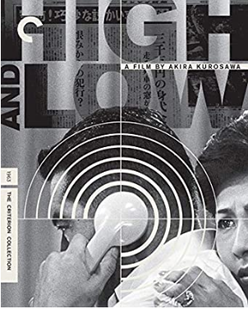
13. HIGH AND LOW (1963)
Directed by Akira Kurosawa. Starring: Toshiro Mifune, Tatsuya Nakadai
Akira Kurosawa's masterpiece is one of the greatest -- if not the greatest -- police procedurals ever made, but it is much more than that. It's a profound social commentary and character study. Kurosawa's Japanese title translates literally to "Heaven and Hell," -- a much more descriptive moniker for this searing noir than the English translation. The film unfolds in thirds. The first act is stagey, taking place almost entirely in the living room of powerful shoe tycoon Kingo Gondo (played magnificently by Toshiro Mifune), who is closing in on a deal to take over control of his company. The deal, however, has put Gondo in debt right down to his sofa and chairs. Then comes the phone call that suddenly turns his world upside down. The call is a ransom demand from a kidnapper who thinks he's put the snatch on Gondo's son, but in reality has grabbed the chauffeur's boy by mistake. As Gondo wrestles with whether or not to secure the boy's release -- which means financial ruin for him and his family -- we learn that the kidnapper is watching their every move. Gondo's house, complete with floor-to-ceiling windows -- looks down on the rest of Yokohama like a king's castle lording it over the peasants in their industrial wasteland below. High and low. Heaven and hell.
Once Gondo decides he must pay the ransom, we move swiftly to the thrilling second act, starting on a bullet train, from which Gondo must throw his money literally out the window, while the cops scramble to take photos of the boy and his kidnappers as the train hurtles past. This is followed by pure procedural, as the police meticulously use every method at their disposal to track the kidnapper. The final act, however, is what elevates High and Low to its lofty place amongst the truly great films of noir. Once the police zero in on their suspect, Kurosawa takes us on an extended ride through the teeming, fetid streets of Yokohama and into a sordid sin market -- a hell, really -- filled with grime-covered peasants, cat-eyed party girls, gyrating party boys (many of whom are American), and drug-ravaged zombies. The sequence is trumpeted by an astonishing plume of pink smoke -- marking the first time Kurosawa used color in film -- signalling an opening into the pit. It culminates brilliantly, to the twinkly strains of the 1960 Elvis Presley hit "It's Now or Never." And then finally, the denouement, in a scene that echoes the brutal, final shot of The Maltese Falcon. It's an ending that ranks with the most powerful of noir, and one that will haunt you long after the screen fades to black. ****
Directed by Akira Kurosawa. Starring: Toshiro Mifune, Tatsuya Nakadai
Akira Kurosawa's masterpiece is one of the greatest -- if not the greatest -- police procedurals ever made, but it is much more than that. It's a profound social commentary and character study. Kurosawa's Japanese title translates literally to "Heaven and Hell," -- a much more descriptive moniker for this searing noir than the English translation. The film unfolds in thirds. The first act is stagey, taking place almost entirely in the living room of powerful shoe tycoon Kingo Gondo (played magnificently by Toshiro Mifune), who is closing in on a deal to take over control of his company. The deal, however, has put Gondo in debt right down to his sofa and chairs. Then comes the phone call that suddenly turns his world upside down. The call is a ransom demand from a kidnapper who thinks he's put the snatch on Gondo's son, but in reality has grabbed the chauffeur's boy by mistake. As Gondo wrestles with whether or not to secure the boy's release -- which means financial ruin for him and his family -- we learn that the kidnapper is watching their every move. Gondo's house, complete with floor-to-ceiling windows -- looks down on the rest of Yokohama like a king's castle lording it over the peasants in their industrial wasteland below. High and low. Heaven and hell.
Once Gondo decides he must pay the ransom, we move swiftly to the thrilling second act, starting on a bullet train, from which Gondo must throw his money literally out the window, while the cops scramble to take photos of the boy and his kidnappers as the train hurtles past. This is followed by pure procedural, as the police meticulously use every method at their disposal to track the kidnapper. The final act, however, is what elevates High and Low to its lofty place amongst the truly great films of noir. Once the police zero in on their suspect, Kurosawa takes us on an extended ride through the teeming, fetid streets of Yokohama and into a sordid sin market -- a hell, really -- filled with grime-covered peasants, cat-eyed party girls, gyrating party boys (many of whom are American), and drug-ravaged zombies. The sequence is trumpeted by an astonishing plume of pink smoke -- marking the first time Kurosawa used color in film -- signalling an opening into the pit. It culminates brilliantly, to the twinkly strains of the 1960 Elvis Presley hit "It's Now or Never." And then finally, the denouement, in a scene that echoes the brutal, final shot of The Maltese Falcon. It's an ending that ranks with the most powerful of noir, and one that will haunt you long after the screen fades to black. ****
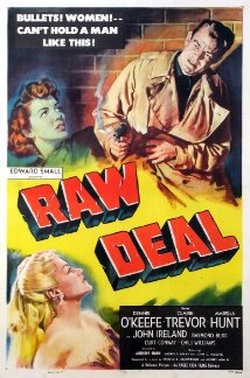
14. RAW DEAL (1948)
Directed by Anthony Mann. Starring: Dennis O'Keefe, Claire Trevor, Marsha Hunt
The visual storytelling is off the charts in Anthony Mann's beautiful, fatalistic, intense noir, shot by famed noir cinematographer John Alton. Joe Sullivan (Dennis O'Keefe), in prison after taking the fall for his sadistic, pyromaniacal boss, chubby dynamo Rick Coyle (Raymond Burr), busts out with the help of his girlfriend, Pat (Claire Trevor). Unbeknownst to either Joe or Pat, however, Coyle has facilitated the escape as a set-up to have Joe killed to avoid paying him the 50 grand he owes him. But Joe manages to escape anyway, which causes Coyle to send his hired killer Fantail (John Ireland) to finish the job. Meanwhile, Joe kidnaps Ann (Marsha Hunt), a social worker who's been visiting Joe in prison in an attempt to reform him, setting up one of noir's great doomed love triangles. The cast is uniformly great, but it's Trevor's melancholic voice-over -- a rarity in noir films for a woman -- that stands out and undercurrents the story. Unusual, dreamlike crime thriller with a powerful finale. ****
Directed by Anthony Mann. Starring: Dennis O'Keefe, Claire Trevor, Marsha Hunt
The visual storytelling is off the charts in Anthony Mann's beautiful, fatalistic, intense noir, shot by famed noir cinematographer John Alton. Joe Sullivan (Dennis O'Keefe), in prison after taking the fall for his sadistic, pyromaniacal boss, chubby dynamo Rick Coyle (Raymond Burr), busts out with the help of his girlfriend, Pat (Claire Trevor). Unbeknownst to either Joe or Pat, however, Coyle has facilitated the escape as a set-up to have Joe killed to avoid paying him the 50 grand he owes him. But Joe manages to escape anyway, which causes Coyle to send his hired killer Fantail (John Ireland) to finish the job. Meanwhile, Joe kidnaps Ann (Marsha Hunt), a social worker who's been visiting Joe in prison in an attempt to reform him, setting up one of noir's great doomed love triangles. The cast is uniformly great, but it's Trevor's melancholic voice-over -- a rarity in noir films for a woman -- that stands out and undercurrents the story. Unusual, dreamlike crime thriller with a powerful finale. ****
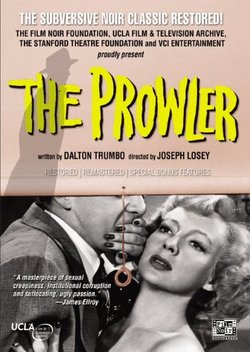
15. THE PROWLER (1951)
Directed by Joseph Losey. Starring: Van Heflin, Evelyn Keyes.
Top-notch noir that’s a twist on Double Indemnity – in this one it’s the man who seduces the wife into an affair. Cop Van Heflin falls for housewife Evelyn Keyes while investigating a prowler at her house. He woos her, and concocts a murder scheme to do away with her husband – without her knowledge. But there’s a catch, and it’s a doozy. Heflin’s gotten Keyes pregnant. The two get married and head for the desert to have the baby without anyone knowing. Only, of course, things go horribly wrong for poor Heflin. Terrific performances by the two leads and a fantastic script cowritten by blacklisted screenwriter Dalton Trumbo (uncredited, natch). A truly great and subversive noir. ****
Directed by Joseph Losey. Starring: Van Heflin, Evelyn Keyes.
Top-notch noir that’s a twist on Double Indemnity – in this one it’s the man who seduces the wife into an affair. Cop Van Heflin falls for housewife Evelyn Keyes while investigating a prowler at her house. He woos her, and concocts a murder scheme to do away with her husband – without her knowledge. But there’s a catch, and it’s a doozy. Heflin’s gotten Keyes pregnant. The two get married and head for the desert to have the baby without anyone knowing. Only, of course, things go horribly wrong for poor Heflin. Terrific performances by the two leads and a fantastic script cowritten by blacklisted screenwriter Dalton Trumbo (uncredited, natch). A truly great and subversive noir. ****
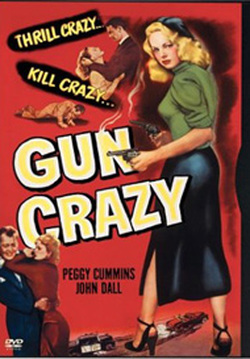
16. GUN CRAZY (1950)
Directed by Joseph H. Lewis. Starring: Peggy Cummins, John Dall.
Fascinating story about a pair of sharpshooting lovebirds who go on a crime spree. One of the most overtly erotic films of the post-WWII era. John Dall and Peggy Cummins are both terrific as the fugitive couple on the run. Dall's Bart is at heart a decent guy who finds out too late that the girl he's fallen for is a psychopath. Screenplay by McKinley Kantor and uncredited blacklisted writer Dalton Trumbo (credit was instead given to Millard Kaufman) is awash with symbolism in this magnificently enjoyable noir. ****
Directed by Joseph H. Lewis. Starring: Peggy Cummins, John Dall.
Fascinating story about a pair of sharpshooting lovebirds who go on a crime spree. One of the most overtly erotic films of the post-WWII era. John Dall and Peggy Cummins are both terrific as the fugitive couple on the run. Dall's Bart is at heart a decent guy who finds out too late that the girl he's fallen for is a psychopath. Screenplay by McKinley Kantor and uncredited blacklisted writer Dalton Trumbo (credit was instead given to Millard Kaufman) is awash with symbolism in this magnificently enjoyable noir. ****
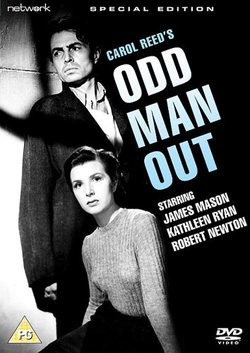
17. ODD MAN OUT (1947)
Directed by Carol Reed. Starring: James Mason, Kathleen Ryan.
If James Joyce had gone to Hollywood to write a crime film, he might have come up with something like Odd Man Out, a transcendent and heartbreaking noir set amongst Northern Ireland's troubles. Most people know the director Carol Reed for The Third Man, but for my money, this is Reed's more powerful film. James Mason is luminous as wounded IRA fighter Johnny McQueen, trying desperately to navigate his way to safety after a botched heist. Kathleen Ryan is the pure-of-heart Irish lass who loves him. "It's a long way, Johnny, but I'm coming with you!" One of the most exquisite noir endings ever. ****
Directed by Carol Reed. Starring: James Mason, Kathleen Ryan.
If James Joyce had gone to Hollywood to write a crime film, he might have come up with something like Odd Man Out, a transcendent and heartbreaking noir set amongst Northern Ireland's troubles. Most people know the director Carol Reed for The Third Man, but for my money, this is Reed's more powerful film. James Mason is luminous as wounded IRA fighter Johnny McQueen, trying desperately to navigate his way to safety after a botched heist. Kathleen Ryan is the pure-of-heart Irish lass who loves him. "It's a long way, Johnny, but I'm coming with you!" One of the most exquisite noir endings ever. ****
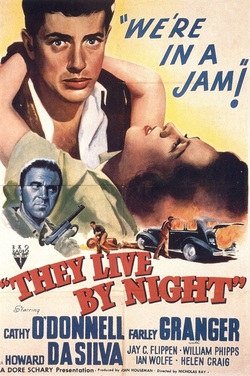
18. THEY LIVE BY NIGHT (1948)
Directed by Nicholas Ray. Starring: Farley Granger, Cathy O'Donnell, Howard Da Silva.
Nicholas Ray emerged on the scene with a bang with this, his debut feature about two lovers on the run. Farley Granger is Bowie, a young kid wrongly convicted of murder who escapes from prison with a pair of older, hardened convicts, Chicamaw (Howard Da Silva) and T-Dub (Jay C. Flippen). Bowie, injured in a car wreck, is nursed to health by Keechie (Cathy O'Donnell), the sensitive, scruffy-at-first, then luminous daughter of the owner of a gas station. The two fall in love, marry, and plan to live an honest life. But Chicamaw and T-Dub return, demanding that Bowie go with them on one last job -- a bank robbery, which, of course, goes horribly wrong. A melancholic beauty, this is one of the most poignant and unforgettable noirs ever made. ****
Directed by Nicholas Ray. Starring: Farley Granger, Cathy O'Donnell, Howard Da Silva.
Nicholas Ray emerged on the scene with a bang with this, his debut feature about two lovers on the run. Farley Granger is Bowie, a young kid wrongly convicted of murder who escapes from prison with a pair of older, hardened convicts, Chicamaw (Howard Da Silva) and T-Dub (Jay C. Flippen). Bowie, injured in a car wreck, is nursed to health by Keechie (Cathy O'Donnell), the sensitive, scruffy-at-first, then luminous daughter of the owner of a gas station. The two fall in love, marry, and plan to live an honest life. But Chicamaw and T-Dub return, demanding that Bowie go with them on one last job -- a bank robbery, which, of course, goes horribly wrong. A melancholic beauty, this is one of the most poignant and unforgettable noirs ever made. ****
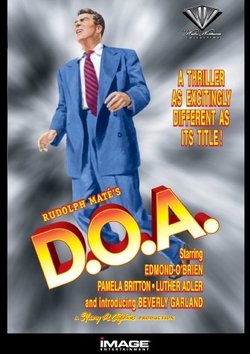
19. D.O.A. (1950)
Directed by Rudolph Mate. Starring: Edmond O'Brien, Pamela Britton.
Uniquely and perversely entertaining, this low budget classic holds a special place in the dark hearts of noir lovers. The film is largely driven by noir stalwart Edmond O'Brien's frenetic performance as Frank Bigelow, an everyman who, while on vacation in San Francisco from his job as a small-town businessman, finds himself in a deliciously nightmarish noir situation: he's been murdered -- poisoned with "luminous toxin." Given just a few days at most to live, Bigelow -- incredulous, exhausted, and reeling from his terminal diagnosis -- sets out to untangle the events behind his impending death. As deliriously eccentric a noir as you're likely to find. ****
Directed by Rudolph Mate. Starring: Edmond O'Brien, Pamela Britton.
Uniquely and perversely entertaining, this low budget classic holds a special place in the dark hearts of noir lovers. The film is largely driven by noir stalwart Edmond O'Brien's frenetic performance as Frank Bigelow, an everyman who, while on vacation in San Francisco from his job as a small-town businessman, finds himself in a deliciously nightmarish noir situation: he's been murdered -- poisoned with "luminous toxin." Given just a few days at most to live, Bigelow -- incredulous, exhausted, and reeling from his terminal diagnosis -- sets out to untangle the events behind his impending death. As deliriously eccentric a noir as you're likely to find. ****
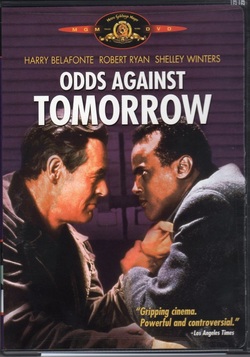
20. ODDS AGAINST TOMORROW (1959)
Directed by Robert Wise. Starring: Harry Belafonte, Robert Ryan, Ed Begley.
Gritty and superb heist film with racial overtones features Harry Belafonte in a powerhouse performance as a nightclub singer desperate for cash. Belafonte is Johnny Ingram, whose gambling addiction has left him in hock to gangsters. With an ex-wife he still pines for and a young daughter he dotes on, Ingram is one of noir’s most sympathetic leads. Or, co-leads, as he teams here with ex-cop David Burke (Ed Begley, superb) and racist ex-con Earl Slater (Robert Ryan, ditto) to pull off a bank heist in a small New York town. Of course, this being noir, it all goes spectacularly wrong. Shelley Winters is the hard-working gal who loves Ryan no matter what, and Gloria Grahame is their sexy neighbor. Belafonte’s performance, including Johnny’s fantastic nightclub act, make this one a can’t miss. The last great noir of the classic period. ****
Directed by Robert Wise. Starring: Harry Belafonte, Robert Ryan, Ed Begley.
Gritty and superb heist film with racial overtones features Harry Belafonte in a powerhouse performance as a nightclub singer desperate for cash. Belafonte is Johnny Ingram, whose gambling addiction has left him in hock to gangsters. With an ex-wife he still pines for and a young daughter he dotes on, Ingram is one of noir’s most sympathetic leads. Or, co-leads, as he teams here with ex-cop David Burke (Ed Begley, superb) and racist ex-con Earl Slater (Robert Ryan, ditto) to pull off a bank heist in a small New York town. Of course, this being noir, it all goes spectacularly wrong. Shelley Winters is the hard-working gal who loves Ryan no matter what, and Gloria Grahame is their sexy neighbor. Belafonte’s performance, including Johnny’s fantastic nightclub act, make this one a can’t miss. The last great noir of the classic period. ****
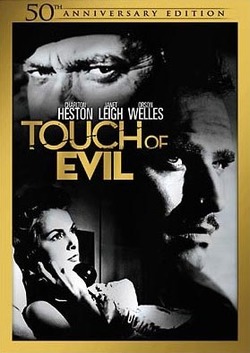
21. TOUCH OF EVIL (1958)
Directed by Orson Welles. Starring: Charlton Heston, Janet Leigh, Orson Welles.
Orson Welles wrote, directed, and co-stars in this typically stylish story of corruption and morally-compromised obsession. The only false note? Charlton Heston playing a Mexican -- Miguel "Mike" Vargas, a drug enforcement official in the Mexican government. Vargas, along with his wife (Janet Leigh) gets drawn into a murder investigation in a town on the Mexican-American border, a chaotic place run by the very corrupt and very large police captain Hank Quinlan (Welles). Welles bravura mise en scene, along with Russel Metty's brilliant black-and-white lighting/camerawork, make this a standout. Of particular note is the famous (and deservedly so) long opening tracking shot that opens the film. ****
Directed by Orson Welles. Starring: Charlton Heston, Janet Leigh, Orson Welles.
Orson Welles wrote, directed, and co-stars in this typically stylish story of corruption and morally-compromised obsession. The only false note? Charlton Heston playing a Mexican -- Miguel "Mike" Vargas, a drug enforcement official in the Mexican government. Vargas, along with his wife (Janet Leigh) gets drawn into a murder investigation in a town on the Mexican-American border, a chaotic place run by the very corrupt and very large police captain Hank Quinlan (Welles). Welles bravura mise en scene, along with Russel Metty's brilliant black-and-white lighting/camerawork, make this a standout. Of particular note is the famous (and deservedly so) long opening tracking shot that opens the film. ****
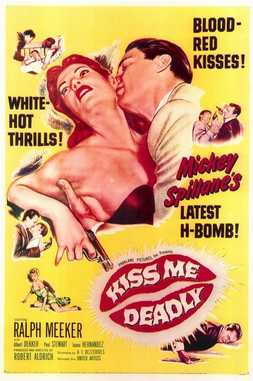
22. KISS ME DEADLY (1955)
Directed by Robert Aldrich. Starring: Ralph Meeker, Cloris Leachman.
Director Robert Aldrich and screenwriter A.I. Bezzerides turn Mickey Spillane's novel on its head in this hardboiled Mike Hammer mystery. While driving down a lonely road late one night, Hammer (Ralph Meeker) picks up a beautiful blonde hitchhiker (Cloris Leachman), dressed in nothing but a raincoat. Hammer soon learns that the terrified girl has escaped from "the laughing house." Then he and the girl are abducted and tortured by well-dressed thugs. The girl is killed, and to cover up the crime, she and Hammer are placed in Hammer's sports car and pushed over a cliff. Somehow, Hammer survives, and tries to discover the secret behind the girl's murder. All clues lead to a mysterious box -- the "Great Whatsit," as Hammer's sexy secretary, Velda (Maxine Cooper) describes it. The apocalyptic climax is one of noir's wackier endings, and this weird, wonderful pulp masterpiece is one of its more cynical and brutal films. ****
Directed by Robert Aldrich. Starring: Ralph Meeker, Cloris Leachman.
Director Robert Aldrich and screenwriter A.I. Bezzerides turn Mickey Spillane's novel on its head in this hardboiled Mike Hammer mystery. While driving down a lonely road late one night, Hammer (Ralph Meeker) picks up a beautiful blonde hitchhiker (Cloris Leachman), dressed in nothing but a raincoat. Hammer soon learns that the terrified girl has escaped from "the laughing house." Then he and the girl are abducted and tortured by well-dressed thugs. The girl is killed, and to cover up the crime, she and Hammer are placed in Hammer's sports car and pushed over a cliff. Somehow, Hammer survives, and tries to discover the secret behind the girl's murder. All clues lead to a mysterious box -- the "Great Whatsit," as Hammer's sexy secretary, Velda (Maxine Cooper) describes it. The apocalyptic climax is one of noir's wackier endings, and this weird, wonderful pulp masterpiece is one of its more cynical and brutal films. ****
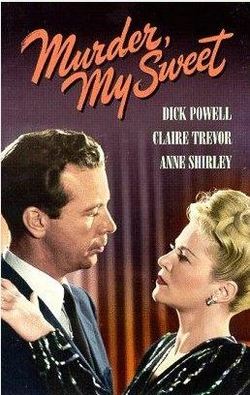
23. MURDER, MY SWEET (1944)
Directed by Edward Dmytryck. Starring: Dick Powell, Claire Trevor, Anne Shirley.
Dick Powell reinvented himself from 1930s light comedy and musical star to glib tough guy, and is stunning in this stark and unyielding adaptation of Chandler's Farewell, My Lovely. Mike Mazurki is fine as Moose Malloy -- a giant, brutish ex-con who hires L.A. gumshoe Philip Marlowe to find Velma, his lost flame, unaware that she's morphed into a dangerously duplicitous femme fatale (Claire Trevor in yet another fine performance). From its strongly accented camera angles and darkness-drenched nighttime ambience to Powell's hard-boiled narration, this is pure Detective Noir 101. This taut thriller is probably the best attempt at bringing Raymond Chandler to the screen. ****
Directed by Edward Dmytryck. Starring: Dick Powell, Claire Trevor, Anne Shirley.
Dick Powell reinvented himself from 1930s light comedy and musical star to glib tough guy, and is stunning in this stark and unyielding adaptation of Chandler's Farewell, My Lovely. Mike Mazurki is fine as Moose Malloy -- a giant, brutish ex-con who hires L.A. gumshoe Philip Marlowe to find Velma, his lost flame, unaware that she's morphed into a dangerously duplicitous femme fatale (Claire Trevor in yet another fine performance). From its strongly accented camera angles and darkness-drenched nighttime ambience to Powell's hard-boiled narration, this is pure Detective Noir 101. This taut thriller is probably the best attempt at bringing Raymond Chandler to the screen. ****
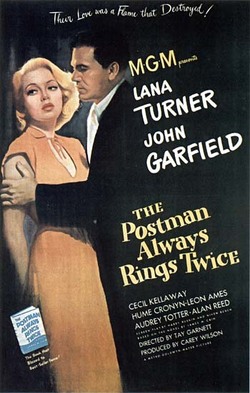
24. THE POSTMAN ALWAYS RINGS TWICE (1946)
Directed by Tay Garnett. Starring: John Garfield, Lana Turner.
Iconic noir (based on the James M. Cain novel) in which Lana Turner causes John Garfield to burn his hamburger. The film was a breakthrough in the battle against censorship. The Production Code Administration (PCA) had kept Cain's novel off the screen for 12 years, but green-lighted this version despite its sizzling love scenes and a world full of moral corruption. Platinum blonde Turner is Cora, a restless sexpot stuck in a roadside diner and married to the much older Nick (Cecil Kellaway). When handsome drifter Frank Chambers (Garfield) blows her way, it's lust at first sight, a rapacious desire that neither can break off, and before you know it, Frank and Cora are having an affair and plotting to do away with jolly old Nick. But in the wicked world of Cain, nothing is that easy. Garnett's visual approach is subdued compared to the more expressionistic film noir of the period, but he's at no loss when he films the luminous Turner in her milky-white wardrobe (designed to make Cora and the film more palatable to the censors). Hume Cronyn nearly runs off with the show with his portrayal of a sleazy lawyer, and Leon Ames plays the suspicious D.A. Watch for noir siren Audrey Totter as a hash-slinger who nearly steals Garfield away from Turner, and listen for Alan Reed -- the voice of Fred Flintstone -- as a crooked private eye. ****
Directed by Tay Garnett. Starring: John Garfield, Lana Turner.
Iconic noir (based on the James M. Cain novel) in which Lana Turner causes John Garfield to burn his hamburger. The film was a breakthrough in the battle against censorship. The Production Code Administration (PCA) had kept Cain's novel off the screen for 12 years, but green-lighted this version despite its sizzling love scenes and a world full of moral corruption. Platinum blonde Turner is Cora, a restless sexpot stuck in a roadside diner and married to the much older Nick (Cecil Kellaway). When handsome drifter Frank Chambers (Garfield) blows her way, it's lust at first sight, a rapacious desire that neither can break off, and before you know it, Frank and Cora are having an affair and plotting to do away with jolly old Nick. But in the wicked world of Cain, nothing is that easy. Garnett's visual approach is subdued compared to the more expressionistic film noir of the period, but he's at no loss when he films the luminous Turner in her milky-white wardrobe (designed to make Cora and the film more palatable to the censors). Hume Cronyn nearly runs off with the show with his portrayal of a sleazy lawyer, and Leon Ames plays the suspicious D.A. Watch for noir siren Audrey Totter as a hash-slinger who nearly steals Garfield away from Turner, and listen for Alan Reed -- the voice of Fred Flintstone -- as a crooked private eye. ****
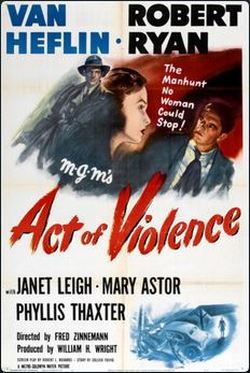
25. ACT OF VIOLENCE (1948)
Directed by Fred Zinneman. Starring: Van Heflin, Robert Ryan, Janet Leigh.
Robert Ryan as embittered World War II vet Joe Parkson out to destroy former fellow POW Van Heflin, who he blames for the deaths of the rest of their comrades in a German POW camp. Ryan is terrific, as usual, as he limps his way across the country to the California town where Heflin's character, Frank Enley, is revered. Janet Leigh is Enley's loyal and lovely wife, and Mary Astor delivers a typically bravura performance as a past-her-prime prostitute who gives the panicked Heflin shelter during his wild flight from fate. Profound, nuanced drama that sees the world through grown-up eyes courtesy of director Fred Zinnemann's textured worldview, which he earned the hard way (Fred and his brother escaped their native Austria in 1938 but both of their parents perished in Nazi concentration camps while waiting for U.S. visas that never came). Mature, art-film noir. ****
Directed by Fred Zinneman. Starring: Van Heflin, Robert Ryan, Janet Leigh.
Robert Ryan as embittered World War II vet Joe Parkson out to destroy former fellow POW Van Heflin, who he blames for the deaths of the rest of their comrades in a German POW camp. Ryan is terrific, as usual, as he limps his way across the country to the California town where Heflin's character, Frank Enley, is revered. Janet Leigh is Enley's loyal and lovely wife, and Mary Astor delivers a typically bravura performance as a past-her-prime prostitute who gives the panicked Heflin shelter during his wild flight from fate. Profound, nuanced drama that sees the world through grown-up eyes courtesy of director Fred Zinnemann's textured worldview, which he earned the hard way (Fred and his brother escaped their native Austria in 1938 but both of their parents perished in Nazi concentration camps while waiting for U.S. visas that never came). Mature, art-film noir. ****
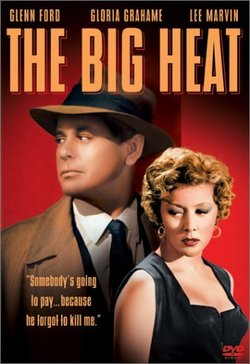
26. THE BIG HEAT (1953)
Directed by Fritz Lang. Starring: Glenn Ford, Gloria Grahame, Lee Marvin.
Fritz Lang's powerful, often brutal story of a cop (Glenn Ford) determined to bust the crime ring that killed his wife in a car bomb meant for him. Lee Marvin cements his place as one of noir's great heavies with the famous hot coffee-tossing scene in which he scalds the face of moll Gloria Grahame. Lang's visuals - in particular his trademark use of shadows - bring the punchy material to life in a film that deservedly ranks among the best of noir, and it's certainly one of the more memorably violent pictures of the `50s. ****
Directed by Fritz Lang. Starring: Glenn Ford, Gloria Grahame, Lee Marvin.
Fritz Lang's powerful, often brutal story of a cop (Glenn Ford) determined to bust the crime ring that killed his wife in a car bomb meant for him. Lee Marvin cements his place as one of noir's great heavies with the famous hot coffee-tossing scene in which he scalds the face of moll Gloria Grahame. Lang's visuals - in particular his trademark use of shadows - bring the punchy material to life in a film that deservedly ranks among the best of noir, and it's certainly one of the more memorably violent pictures of the `50s. ****
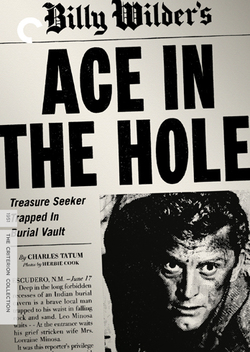
27. ACE IN THE HOLE (1951)
Directed by Billy Wilder. Starring: Kirk Douglas, Jan Sterling.
The third of Billy Wilder’s three great noirs, after Double Indemnity and Sunset Boulevard. Kirk Douglas gives one of his best over-the-top, powerhouse performances as the thoroughly despicable Chuck Tatum, a former big-time New York reporter who’ll stop at nothing to get back on top. After talking his way into a job on the small-potatoes Albuquerque Sun-Bulletin -- figuring he’ll only be there long enough to get the scoop that will punch his ticket back to the big stage -- Tatum instead finds himself stuck in the sticks. Then one day he’s given an assignment to cover a rattlesnake hunt in the boondocks. On his way there, he stumbles onto a story that, with a little manipulation on his part, can become the big scoop he’s been waiting for. A local treasure hunter, Leo Minosa, has become trapped in a cave-in while digging for Indian relics to sell in his roadside diner/trading post. Tatum convinces the corrupt sheriff to drag out the rescue while Tatum gins the story into a national sensation. Soon, the place is crawling with so many rubberneckers and big-city reporters that it’s literally become a carnival. Tatum’s lurid plot includes keeping Leo’s floozy of a wife, Lorraine, from running away from her dreary desert life – and Leo – until the story’s played out and he’s on his way back to the big time. In a performance that should have been star-making, Jan Sterling plays Lorraine as chillingly indifferent to the plight of her husband. This is a terrific stop on Wilder’s tour of the rattlesnake-and-vulture-infested post-war American landscape. ****
Directed by Billy Wilder. Starring: Kirk Douglas, Jan Sterling.
The third of Billy Wilder’s three great noirs, after Double Indemnity and Sunset Boulevard. Kirk Douglas gives one of his best over-the-top, powerhouse performances as the thoroughly despicable Chuck Tatum, a former big-time New York reporter who’ll stop at nothing to get back on top. After talking his way into a job on the small-potatoes Albuquerque Sun-Bulletin -- figuring he’ll only be there long enough to get the scoop that will punch his ticket back to the big stage -- Tatum instead finds himself stuck in the sticks. Then one day he’s given an assignment to cover a rattlesnake hunt in the boondocks. On his way there, he stumbles onto a story that, with a little manipulation on his part, can become the big scoop he’s been waiting for. A local treasure hunter, Leo Minosa, has become trapped in a cave-in while digging for Indian relics to sell in his roadside diner/trading post. Tatum convinces the corrupt sheriff to drag out the rescue while Tatum gins the story into a national sensation. Soon, the place is crawling with so many rubberneckers and big-city reporters that it’s literally become a carnival. Tatum’s lurid plot includes keeping Leo’s floozy of a wife, Lorraine, from running away from her dreary desert life – and Leo – until the story’s played out and he’s on his way back to the big time. In a performance that should have been star-making, Jan Sterling plays Lorraine as chillingly indifferent to the plight of her husband. This is a terrific stop on Wilder’s tour of the rattlesnake-and-vulture-infested post-war American landscape. ****
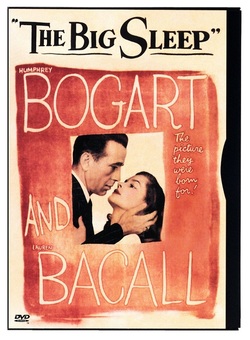
28. THE BIG SLEEP (1946)
Directed by Howard Hawks. Starring: Humphrey Bogart, Lauren Bacall.
Sure, the plot's nearly indecipherable, and the studio's trying a little too hard to cash in on the Bogie-Bacall craze, but who cares? There's still an awful lot to love about this Howard Hawks adaptation of Raymond Chandler's great novel, not the least of which is Bogart inhabiting Raymond Chandler’s Marlowe on a case involving blackmail, the spoiled rich, and murder. "You know, it just so happens I've got a bottle of pretty good rye in my pocket." Still one of the quintessential noirs, and lots of fun. ****
Directed by Howard Hawks. Starring: Humphrey Bogart, Lauren Bacall.
Sure, the plot's nearly indecipherable, and the studio's trying a little too hard to cash in on the Bogie-Bacall craze, but who cares? There's still an awful lot to love about this Howard Hawks adaptation of Raymond Chandler's great novel, not the least of which is Bogart inhabiting Raymond Chandler’s Marlowe on a case involving blackmail, the spoiled rich, and murder. "You know, it just so happens I've got a bottle of pretty good rye in my pocket." Still one of the quintessential noirs, and lots of fun. ****
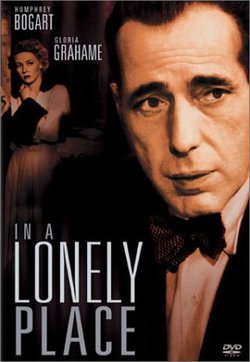
29. IN A LONELY PLACE (1950)
Directed by Nicholas Ray. Starring: Humphrey Bogart, Gloria Grahame.
Nicholas Ray's profound meditation on the darkness of the soul. Humphrey Bogart is troubled screenwriter Dix Steele, a man with a violent temper who may or may not have strangled a young hatcheck girl. Gloria Grahame is his neighbor, a woman who loves Dix, but is terrified of him. A wrenching and powerfully disturbing film. ****
Directed by Nicholas Ray. Starring: Humphrey Bogart, Gloria Grahame.
Nicholas Ray's profound meditation on the darkness of the soul. Humphrey Bogart is troubled screenwriter Dix Steele, a man with a violent temper who may or may not have strangled a young hatcheck girl. Gloria Grahame is his neighbor, a woman who loves Dix, but is terrified of him. A wrenching and powerfully disturbing film. ****
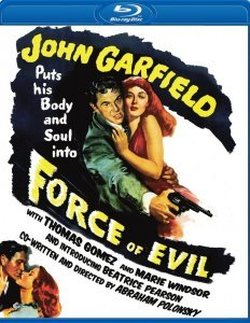
30. FORCE OF EVIL (1949)
Directed by Abraham Polonsky. Starring: John Garfield, Thomas Gomez.
Abraham Polonsky's big, gritty, fast-talking noir is driven by a fantastic script, with performances to match by all, especially John Garfield and Thomas Gomez as the Cain and Abel brothers at the heart of this tragic masterpiece. The story -- on the surface a tale about two brothers caught up in a mob war over the numbers racket -- is really a blatant indictment of capitalism and corruption of the soul. Every aspect is top-notch, with particular nods to the screenplay by Polonsky and Ira Wolfert, taken from Wolfert's novel Tucker's People, George Barnes' terrific noir camerawork, and the direction, in his debut, by Polonsky. The stellar supporting cast includes great work by Beatrice Pearson as Doris, the film's only ray of light, Howland Chamberlain as Gomez' doomed accountant, and noir goddess Marie Windsor in her usual role as sexy vamp. Filled with scorching dialog and scenes that will sear into your memory, Force of Evil is one of the truly great films of the 1940s. ****
Directed by Abraham Polonsky. Starring: John Garfield, Thomas Gomez.
Abraham Polonsky's big, gritty, fast-talking noir is driven by a fantastic script, with performances to match by all, especially John Garfield and Thomas Gomez as the Cain and Abel brothers at the heart of this tragic masterpiece. The story -- on the surface a tale about two brothers caught up in a mob war over the numbers racket -- is really a blatant indictment of capitalism and corruption of the soul. Every aspect is top-notch, with particular nods to the screenplay by Polonsky and Ira Wolfert, taken from Wolfert's novel Tucker's People, George Barnes' terrific noir camerawork, and the direction, in his debut, by Polonsky. The stellar supporting cast includes great work by Beatrice Pearson as Doris, the film's only ray of light, Howland Chamberlain as Gomez' doomed accountant, and noir goddess Marie Windsor in her usual role as sexy vamp. Filled with scorching dialog and scenes that will sear into your memory, Force of Evil is one of the truly great films of the 1940s. ****
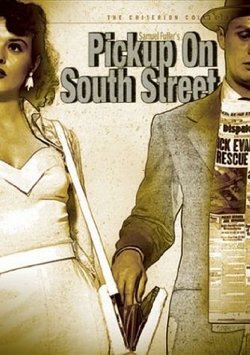
31. PICKUP ON SOUTH STREET (1953)
Directed by Samuel Fuller. Starring: Richard Widmark, Jean Peters, Thelma Ritter.
If Samuel Fuller, director and screenwriter of Pickup on South Street, had to distill his two-fisted masterpiece down to three words, he might have chosen "Honor among thieves." In the film, Richard Widmark shines as yet another in his long line of big-city lowlifes dreaming of hitting the big-time. Widmark is crafty pickpocket Skip McCoy, a sleazy, thieving smartass with a gift for the grift, who -- on a crowded New York subway -- steals Candy's (Jean Peters) wallet. In the wallet is an envelope she was delivering as a favor for her slimy ex-boyfriend, Joey, a commie agent. In the envelope is microfilm of top-secret government information, not simple industrial espionage, as Joey had led Candy to believe. Two G-men witness the crime, having been following Candy. But before the junior J. Edgars can react, Skip is skipping off the train with the wallet, and -- unbeknownst to him -- the microfilm. The G-men then meet with NYC police Captain Dan Tiger (Murvyn Vye) to try and i.d. the thief. To help in that process, Tiger turns to an informant: a little old lady named Moe, played by Thelma Ritter, who's been saving up scratch from her legitimate business front of selling cheap men's neckties on the street and also her informant money so she can buy herself a top-of-the-line funeral with all the trimmings. As she explains to the captain: "Look, Tiger, if I was to be buried in Potter's field, it'd just about kill me." Moe quickly puts the finger on Skip, who doesn't hold it against her. "Moe's alright," he says. "She's gotta eat." When Skip learns what he's got, he tries to put the bite on the commies -- via Candy, who has fallen for Skip -- and that's when things really get interesting. The commies threaten Moe to give up Skip's whereabouts, but she refuses, even at great personal peril, and Skip becomes a sympathetic figure when he stops thinking of himself and does something selfless for Moe. And while, on the surface, the film appears to be a straight-forward, patriotic, anti-communist work, it's much sharper than that. Fuller -- who also wrote the screenplay -- fills Pickup with loads of juicy little details -- like the hilarious way Skip keeps his beer cold at his waterfront shack, or the way Lightning Louie uses chopsticks to pocket cash off the table in his Chinese restaurant. Of the cast, Widmark is great, but it's Ritter who pretty much steals the show with her portrayal of Moe, a complex woman with equal parts vulnerability, charm, and guile. This is a film that requires more than one viewing to fully appreciate. A top-notch, slyly subversive noir. ****
Directed by Samuel Fuller. Starring: Richard Widmark, Jean Peters, Thelma Ritter.
If Samuel Fuller, director and screenwriter of Pickup on South Street, had to distill his two-fisted masterpiece down to three words, he might have chosen "Honor among thieves." In the film, Richard Widmark shines as yet another in his long line of big-city lowlifes dreaming of hitting the big-time. Widmark is crafty pickpocket Skip McCoy, a sleazy, thieving smartass with a gift for the grift, who -- on a crowded New York subway -- steals Candy's (Jean Peters) wallet. In the wallet is an envelope she was delivering as a favor for her slimy ex-boyfriend, Joey, a commie agent. In the envelope is microfilm of top-secret government information, not simple industrial espionage, as Joey had led Candy to believe. Two G-men witness the crime, having been following Candy. But before the junior J. Edgars can react, Skip is skipping off the train with the wallet, and -- unbeknownst to him -- the microfilm. The G-men then meet with NYC police Captain Dan Tiger (Murvyn Vye) to try and i.d. the thief. To help in that process, Tiger turns to an informant: a little old lady named Moe, played by Thelma Ritter, who's been saving up scratch from her legitimate business front of selling cheap men's neckties on the street and also her informant money so she can buy herself a top-of-the-line funeral with all the trimmings. As she explains to the captain: "Look, Tiger, if I was to be buried in Potter's field, it'd just about kill me." Moe quickly puts the finger on Skip, who doesn't hold it against her. "Moe's alright," he says. "She's gotta eat." When Skip learns what he's got, he tries to put the bite on the commies -- via Candy, who has fallen for Skip -- and that's when things really get interesting. The commies threaten Moe to give up Skip's whereabouts, but she refuses, even at great personal peril, and Skip becomes a sympathetic figure when he stops thinking of himself and does something selfless for Moe. And while, on the surface, the film appears to be a straight-forward, patriotic, anti-communist work, it's much sharper than that. Fuller -- who also wrote the screenplay -- fills Pickup with loads of juicy little details -- like the hilarious way Skip keeps his beer cold at his waterfront shack, or the way Lightning Louie uses chopsticks to pocket cash off the table in his Chinese restaurant. Of the cast, Widmark is great, but it's Ritter who pretty much steals the show with her portrayal of Moe, a complex woman with equal parts vulnerability, charm, and guile. This is a film that requires more than one viewing to fully appreciate. A top-notch, slyly subversive noir. ****
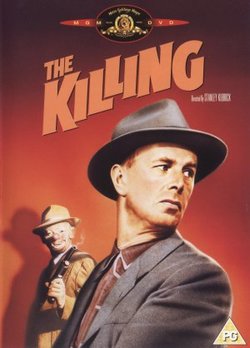
32. THE KILLING (1956)
Directed by Stanley Kubrick. Starring: Sterling Hayden, Elisha Cook Jr.
Stanley Kubrick’s great heist film (co-written by the great noir novelist Jim Thompson) has a lot going for it, not the least of which is Sterling Hayden at its center. Elisha Cook Jr. is superb as an aging sap who’ll do anything for his trashy wife, played by the fabulously sultry Marie Windsor. She’d sell what’s left of her tramp’s soul for a fistful of greenbacks, or a roll in the hay with Vince Edwards. Timothy Carey is there, too, to chew up the scenery. And then there’s the jaw-dropping spectacle of the hairy-backed chess-playing Georgian wrestler Kola Kwariani, rumbling shirtless with half a dozen cops in a racetrack bar. Put it on, Kola! Please, put it on! Kubrick keeps the tension high throughout, using a tight narrative and an out-of-sequence chronology through which he dispenses bits of information, building suspense bit-by-bit, until it all fits together in the end like pieces of a giant puzzle. ****
Directed by Stanley Kubrick. Starring: Sterling Hayden, Elisha Cook Jr.
Stanley Kubrick’s great heist film (co-written by the great noir novelist Jim Thompson) has a lot going for it, not the least of which is Sterling Hayden at its center. Elisha Cook Jr. is superb as an aging sap who’ll do anything for his trashy wife, played by the fabulously sultry Marie Windsor. She’d sell what’s left of her tramp’s soul for a fistful of greenbacks, or a roll in the hay with Vince Edwards. Timothy Carey is there, too, to chew up the scenery. And then there’s the jaw-dropping spectacle of the hairy-backed chess-playing Georgian wrestler Kola Kwariani, rumbling shirtless with half a dozen cops in a racetrack bar. Put it on, Kola! Please, put it on! Kubrick keeps the tension high throughout, using a tight narrative and an out-of-sequence chronology through which he dispenses bits of information, building suspense bit-by-bit, until it all fits together in the end like pieces of a giant puzzle. ****
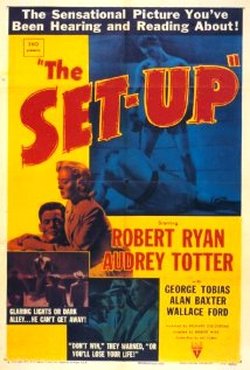
33. THE SET-UP (1949)
Directed by Robert Wise. Starring: Robert Ryan, Audrey Totter
Over-the-hill boxer Stoker Thompson (Robert Ryan), just one pug in a locker-room full of palookas, is 35 going on 50, yet still thinks he's just one punch away from the big time. The fiercely proud prizefighter is determined to beat his next opponent, while his wife, Julie (Audrey Totter) fears for his safety and his future, and begs him to forfeit the bout. Stoker's manager, meanwhile, is so sure he'll lose that he takes money from a mobster for Stoker to take a dive and doesn't even bother to tell him. While Stoker gets laced up in the locker-room, Julie, who can't stand to see him get beat up any more, waits for him back in their seedy hotel, until she gets restless and wanders the streets that are filled with arcades, bars, and chop suey places. The film, which plays out in something close to real-time, is a fine showcase for Ryan, the tall, craggy noir stalwart, so excellent in so many films noir. Ryan, a boxer in real life before becoming an actor, is one of the great underappreciated actors in American film, and this is one of his greatest performances. A riveting, gut-punch of a boxing picture. ****
Directed by Robert Wise. Starring: Robert Ryan, Audrey Totter
Over-the-hill boxer Stoker Thompson (Robert Ryan), just one pug in a locker-room full of palookas, is 35 going on 50, yet still thinks he's just one punch away from the big time. The fiercely proud prizefighter is determined to beat his next opponent, while his wife, Julie (Audrey Totter) fears for his safety and his future, and begs him to forfeit the bout. Stoker's manager, meanwhile, is so sure he'll lose that he takes money from a mobster for Stoker to take a dive and doesn't even bother to tell him. While Stoker gets laced up in the locker-room, Julie, who can't stand to see him get beat up any more, waits for him back in their seedy hotel, until she gets restless and wanders the streets that are filled with arcades, bars, and chop suey places. The film, which plays out in something close to real-time, is a fine showcase for Ryan, the tall, craggy noir stalwart, so excellent in so many films noir. Ryan, a boxer in real life before becoming an actor, is one of the great underappreciated actors in American film, and this is one of his greatest performances. A riveting, gut-punch of a boxing picture. ****
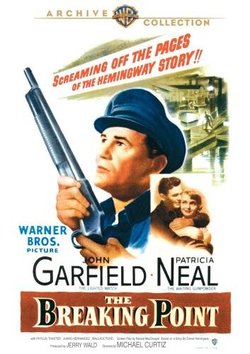
34. THE BREAKING POINT (1950)
Directed by Michael Curtiz. Starring: John Garfield, Patricia Neal, Phyllis Thaxter
Based on Ernest Hemingway's To Have and Have Not, this is much more faithful to the source material than the Bogie-Bacall version, and a grittier film overall, as it better captures the spirit of charter boat captain Harry Morgan (John Garfield in a brilliant performance) wrestling with his inner demons until he reaches his breaking point and finds out what kind of man will emerge. Great complimentary performances from Phyllis Thaxter as Harry's loyal wife, Wallace Ford as a shady lawyer, and Patricia Neal as the sexy dame with a yen for Harry. This is a criminally underseen film, and one of Garfield's best. ****
Directed by Michael Curtiz. Starring: John Garfield, Patricia Neal, Phyllis Thaxter
Based on Ernest Hemingway's To Have and Have Not, this is much more faithful to the source material than the Bogie-Bacall version, and a grittier film overall, as it better captures the spirit of charter boat captain Harry Morgan (John Garfield in a brilliant performance) wrestling with his inner demons until he reaches his breaking point and finds out what kind of man will emerge. Great complimentary performances from Phyllis Thaxter as Harry's loyal wife, Wallace Ford as a shady lawyer, and Patricia Neal as the sexy dame with a yen for Harry. This is a criminally underseen film, and one of Garfield's best. ****
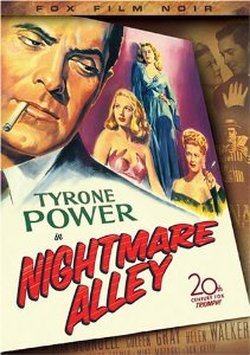
35. NIGHTMARE ALLEY (1947)
Directed by Edmund Goulding. Starring: Tyrone Power, Joan Blondell
Sordid carny noir with a great performance from Tyrone Power at its center. Power plays Stanton Carlisle, a carnival con man who dreams of hitting the big time as a fake clairvoyant. Lucky for him he's got "Mademoiselle" Zeena, a fake mind reader (Joan Blondell), and her pitifully alcoholic husband Pete, working in the next tent. Zeena and Pete at one time were a top-billed act using an ingenious code to make it appear as if Zeena had extraordinary mental powers, until Zeena's infidelity drove Pete to drink and reduced them to a third-rate carnival act. Then one night, Stanton accidentally gives Pete a bottle of wood alcohol instead of moonshine, killing him, and Zeena is forced to team up with Stanton and teach him the code. Their team doesn't last long, however, as Stanton soon ups and marries the younger Molly (Colleen Gray), and the two of them strike out on their own. The next thing you know, Stanton has become "The Great Stanton," and is performing before enraptured audiences in expensive nightclubs. Still not satisfied, he hooks up with scheming Chicago psychoanalyst Lilith Ritter (Helen Walker), who feeds him information about her patients, which Stan uses in his act, pretending to be able to communicate with the dead. Of course, it all comes crashing down around Stanton in a nightmarish conclusion. A brilliantly grim assessment of humanity's place in the cruel circus of life. ****
Directed by Edmund Goulding. Starring: Tyrone Power, Joan Blondell
Sordid carny noir with a great performance from Tyrone Power at its center. Power plays Stanton Carlisle, a carnival con man who dreams of hitting the big time as a fake clairvoyant. Lucky for him he's got "Mademoiselle" Zeena, a fake mind reader (Joan Blondell), and her pitifully alcoholic husband Pete, working in the next tent. Zeena and Pete at one time were a top-billed act using an ingenious code to make it appear as if Zeena had extraordinary mental powers, until Zeena's infidelity drove Pete to drink and reduced them to a third-rate carnival act. Then one night, Stanton accidentally gives Pete a bottle of wood alcohol instead of moonshine, killing him, and Zeena is forced to team up with Stanton and teach him the code. Their team doesn't last long, however, as Stanton soon ups and marries the younger Molly (Colleen Gray), and the two of them strike out on their own. The next thing you know, Stanton has become "The Great Stanton," and is performing before enraptured audiences in expensive nightclubs. Still not satisfied, he hooks up with scheming Chicago psychoanalyst Lilith Ritter (Helen Walker), who feeds him information about her patients, which Stan uses in his act, pretending to be able to communicate with the dead. Of course, it all comes crashing down around Stanton in a nightmarish conclusion. A brilliantly grim assessment of humanity's place in the cruel circus of life. ****
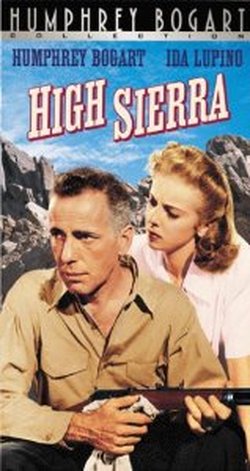
36. HIGH SIERRA (1941)
Directed by Raoul Walsh. Starring: Humphrey Bogart, Ida Lupino
Raoul Walsh directs from a script by John Huston and W.R. Burnett, from Burnett's novel. Humphrey Bogart is hardened criminal Mad Dog Roy Earl, just paroled from prison and leading a gang that's plotting to heist a load of jewels from a Palm Springs resort. Bogart is fantastic as the tough old con with a soft spot for Velma, a girl with a club foot (Joan Leslie), and a scraggly, bad-luck mutt named Pard (played effortlessly by Bogie's own dog, Zero). And then there's Marie, the tough-but-vulnerable moll, played in an unforgettable turn by noir goddess Ida Lupino, who eventually melts the old bandit's heart too. It all culminates in a slam-bang finish high up in the Sierra mountains, as Bogart's defiant snarl echoes through the peaks and crevasses of Mt. Whitney. ****
Directed by Raoul Walsh. Starring: Humphrey Bogart, Ida Lupino
Raoul Walsh directs from a script by John Huston and W.R. Burnett, from Burnett's novel. Humphrey Bogart is hardened criminal Mad Dog Roy Earl, just paroled from prison and leading a gang that's plotting to heist a load of jewels from a Palm Springs resort. Bogart is fantastic as the tough old con with a soft spot for Velma, a girl with a club foot (Joan Leslie), and a scraggly, bad-luck mutt named Pard (played effortlessly by Bogie's own dog, Zero). And then there's Marie, the tough-but-vulnerable moll, played in an unforgettable turn by noir goddess Ida Lupino, who eventually melts the old bandit's heart too. It all culminates in a slam-bang finish high up in the Sierra mountains, as Bogart's defiant snarl echoes through the peaks and crevasses of Mt. Whitney. ****
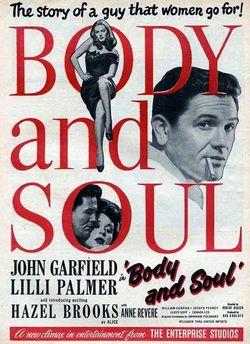
37. BODY AND SOUL (1947)
Directed by Robert Rossen. Starring: John Garfield, Lilli Palmer
John Garfield’s gritty performance still resonates, along with powerful script by Abraham Polonsky and James Wong Howe’s brilliant camerawork, all of which elevate this boxing noir into something else -- a morality tale about the corrupting influence of money -- and capitalism -- on the soul. A classic. “Whattaya gonna do, kill me? Everybody dies.” ****
Directed by Robert Rossen. Starring: John Garfield, Lilli Palmer
John Garfield’s gritty performance still resonates, along with powerful script by Abraham Polonsky and James Wong Howe’s brilliant camerawork, all of which elevate this boxing noir into something else -- a morality tale about the corrupting influence of money -- and capitalism -- on the soul. A classic. “Whattaya gonna do, kill me? Everybody dies.” ****
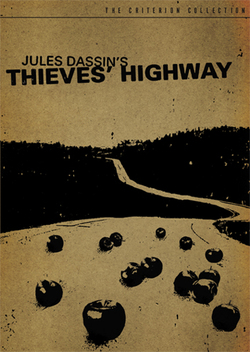
38. THIEVES' HIGHWAY (1949)
Directed by Jules Dassin. Starring: Richard Conte, Lee J. Cobb, Valentina Cortese
Jules Dassin's indictment of postwar American capitalism stars Richard Conte as returning war veteran Nico "Nick" Garcos (Richard Conte), who comes home to find that his father, a fruit trucker, was cheated out of his money and crippled by unscrupulous San Francisco produce king Mike Figlia (Lee J. Cobb). Nick vows revenge, and goes into business with pal Ed Kinney (Millard Mitchell), who bought his father's truck, and the two drive a truckload of golden delicious apples to San Francisco, where he runs into guess who. The femme fatale is Rica, played by Valentine Cortese, who tries to keep Nick occupied while Cobb's goons unload his apples, planning to cheat Nick too. A.I. Bezzerides (Kiss Me Deadly) wrote the novel and the screenplay, and Daryl Zanuck and the Fox machine tried to ruin it all with a cheap, cop-out ending that doesn't work, but until then this a tough, uncompromising noir. ****
Directed by Jules Dassin. Starring: Richard Conte, Lee J. Cobb, Valentina Cortese
Jules Dassin's indictment of postwar American capitalism stars Richard Conte as returning war veteran Nico "Nick" Garcos (Richard Conte), who comes home to find that his father, a fruit trucker, was cheated out of his money and crippled by unscrupulous San Francisco produce king Mike Figlia (Lee J. Cobb). Nick vows revenge, and goes into business with pal Ed Kinney (Millard Mitchell), who bought his father's truck, and the two drive a truckload of golden delicious apples to San Francisco, where he runs into guess who. The femme fatale is Rica, played by Valentine Cortese, who tries to keep Nick occupied while Cobb's goons unload his apples, planning to cheat Nick too. A.I. Bezzerides (Kiss Me Deadly) wrote the novel and the screenplay, and Daryl Zanuck and the Fox machine tried to ruin it all with a cheap, cop-out ending that doesn't work, but until then this a tough, uncompromising noir. ****
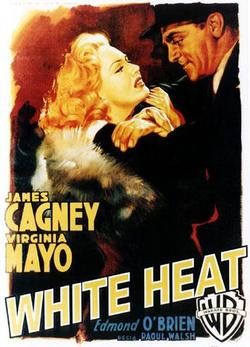
39. WHITE HEAT (1949)
Directed by Raoul Walsh. Starring: James Cagney, Edmund O'Brien, Virginia Mayo
Jimmy Cagney supercharges Raoul Walsh's gangster noir with an epic performance as crazed murderous mama's boy hoodlum Arthur "Cody" Jarrett. Cody, fighting blinding, debilitating headaches that signal the onset of his inherited mental illness and turn him into a whimpering, blubbering man-baby, leads a ruthless gang of criminals (including his mother!) that's been infiltrated by undercover T-Man Philip Evans (Edmund O'Brien). Cody only trusts one person in the whole world, and it's not his wife, Verna (Virginia Mayo), nor right-hand gangster "Big Ed" (Steve Cochran); it's his ma (Margaret Wycherly), who's as tough as any of the gang. But when ma dies while he's in prison, Cody goes berserk in the mess hall, and it's the undercover Evans who soothes the savage beast, so Cody takes Evans with him when he busts out. This is a gritty, pitiless and explosive film, punctuated by one of the most memorable lines in cinema. "Made it, Ma! Top of the world!" ****
Directed by Raoul Walsh. Starring: James Cagney, Edmund O'Brien, Virginia Mayo
Jimmy Cagney supercharges Raoul Walsh's gangster noir with an epic performance as crazed murderous mama's boy hoodlum Arthur "Cody" Jarrett. Cody, fighting blinding, debilitating headaches that signal the onset of his inherited mental illness and turn him into a whimpering, blubbering man-baby, leads a ruthless gang of criminals (including his mother!) that's been infiltrated by undercover T-Man Philip Evans (Edmund O'Brien). Cody only trusts one person in the whole world, and it's not his wife, Verna (Virginia Mayo), nor right-hand gangster "Big Ed" (Steve Cochran); it's his ma (Margaret Wycherly), who's as tough as any of the gang. But when ma dies while he's in prison, Cody goes berserk in the mess hall, and it's the undercover Evans who soothes the savage beast, so Cody takes Evans with him when he busts out. This is a gritty, pitiless and explosive film, punctuated by one of the most memorable lines in cinema. "Made it, Ma! Top of the world!" ****
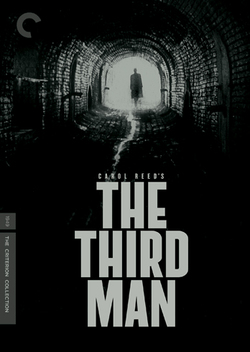
40. THE THIRD MAN (1949)
Directed by Carol Reed. Starring: Joseph Cotten, Alida Valli, Orson Welles
Carol Reed's atmospheric thriller of conscience and betrayal features the director's entire bag of Wellesian cinematic tricks, Robert Krasker's gorgeous black-and-white photography of post-war Vienna, and Anton Karas's unforgettable zither music. Joseph Cotten stars as American pulp western writer Holly Martins, who's come to Vienna seeking his childhood friend, Harry Lime (Orson Welles), who's offered him a job, only to learn that Lime was (supposedly) killed just days earlier by a speeding truck while crossing the street. Martins sticks around, growing more and more suspicious about his friend's death, and falling for Lime's beautiful, fatalistic actress girlfriend, Anna Schmidt (Alida Valli). The chase through the sewers of Vienna is one of noir's most memorable sequences. ****
Directed by Carol Reed. Starring: Joseph Cotten, Alida Valli, Orson Welles
Carol Reed's atmospheric thriller of conscience and betrayal features the director's entire bag of Wellesian cinematic tricks, Robert Krasker's gorgeous black-and-white photography of post-war Vienna, and Anton Karas's unforgettable zither music. Joseph Cotten stars as American pulp western writer Holly Martins, who's come to Vienna seeking his childhood friend, Harry Lime (Orson Welles), who's offered him a job, only to learn that Lime was (supposedly) killed just days earlier by a speeding truck while crossing the street. Martins sticks around, growing more and more suspicious about his friend's death, and falling for Lime's beautiful, fatalistic actress girlfriend, Anna Schmidt (Alida Valli). The chase through the sewers of Vienna is one of noir's most memorable sequences. ****
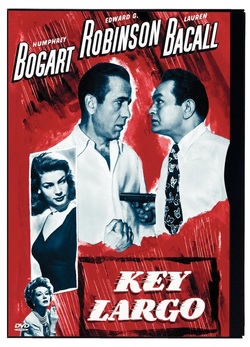
41. KEY LARGO (1948)
Directed by John Huston. Starring: Humphrey Bogart, Lauren Bacall, Edward G. Robinson
A superb ensemble cast highlights John Huston's tale of gangsterism in post-war America. Humphrey Bogart plays Frank McCloud, a war vet visiting the widow (Lauren Bacall) and father (Lionel Barrymore) of a man who died under his command in Italy. They run a hotel in the Florida Keys, and McCloud arrives to find the hotel has only six "guests" -- gangsters posing as tourists. Boss of the outfit is Johnny Rocco, a Capone-like gangster played in a film-stealing performance by Edward G. Robinson. When first we see Robinson, he's sitting in a bath chomping on a cigar. Then he arises to put a high-pantsed stranglehold on the film. Turns out the gang is holding Barrymore and Bacall hostage until an old underworld pal/rival of Rocco's arrives to conclude a big deal. Also along as part of Rocco's entourage is his alcoholic ex-moll Gaye Dawn, played by Claire Trevor in a wonderful performance that earned the noir goddess an Oscar. It all comes to a boil as a giant hurricane hits, amping up the sweaty claustrophobia and threatening to blow the hotel and everyone in it away. ****
Directed by John Huston. Starring: Humphrey Bogart, Lauren Bacall, Edward G. Robinson
A superb ensemble cast highlights John Huston's tale of gangsterism in post-war America. Humphrey Bogart plays Frank McCloud, a war vet visiting the widow (Lauren Bacall) and father (Lionel Barrymore) of a man who died under his command in Italy. They run a hotel in the Florida Keys, and McCloud arrives to find the hotel has only six "guests" -- gangsters posing as tourists. Boss of the outfit is Johnny Rocco, a Capone-like gangster played in a film-stealing performance by Edward G. Robinson. When first we see Robinson, he's sitting in a bath chomping on a cigar. Then he arises to put a high-pantsed stranglehold on the film. Turns out the gang is holding Barrymore and Bacall hostage until an old underworld pal/rival of Rocco's arrives to conclude a big deal. Also along as part of Rocco's entourage is his alcoholic ex-moll Gaye Dawn, played by Claire Trevor in a wonderful performance that earned the noir goddess an Oscar. It all comes to a boil as a giant hurricane hits, amping up the sweaty claustrophobia and threatening to blow the hotel and everyone in it away. ****
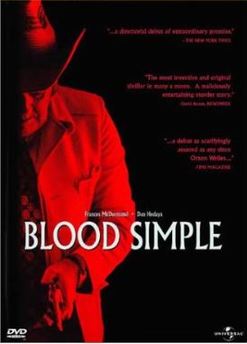
42. BLOOD SIMPLE (1984)
Directed by Joel and Ethan Coen. Starring: Frances McDormand, John Getz
The Coen brothers' audacious, sensational debut is a blood-soaked nightmare in which the characters are trapped in a web of betrayal and double cross. Dan Hedaya plays Marty, swarthy, brooding owner of a small town Texas bar, whose wife, Abby (Frances McDormand) is leaving him. As the film opens on a dark, rainy night, Abby is being driven down a lonely highway by Ray (John Getz), one of Marty's bartenders. After Ray confesses that he's always liked Abby, the two end up in a motel bed, while sleazy cowboy private eye Loren Visser (M. Emmet Walsh in an unforgettable turn), hired by Marty to follow his wife, snaps photos through the window. Visser takes the photos to Marty, needling him. Marty hires Visser to kill the new couple -- and that's when all hell breaks loose. The film keeps ratcheting up the suspense, as guilt and suspicion take hold in the new lovers' minds, while Loren tries to tie up loose ends. False assumptions and paranoia lead to a blood-curdling, heart-pounding climax that is also as darkly comic as noir comes. The Coens make it all work brilliantly, on all levels. A startling debut that signaled a major new force in cinema and neo-noir. ****
Directed by Joel and Ethan Coen. Starring: Frances McDormand, John Getz
The Coen brothers' audacious, sensational debut is a blood-soaked nightmare in which the characters are trapped in a web of betrayal and double cross. Dan Hedaya plays Marty, swarthy, brooding owner of a small town Texas bar, whose wife, Abby (Frances McDormand) is leaving him. As the film opens on a dark, rainy night, Abby is being driven down a lonely highway by Ray (John Getz), one of Marty's bartenders. After Ray confesses that he's always liked Abby, the two end up in a motel bed, while sleazy cowboy private eye Loren Visser (M. Emmet Walsh in an unforgettable turn), hired by Marty to follow his wife, snaps photos through the window. Visser takes the photos to Marty, needling him. Marty hires Visser to kill the new couple -- and that's when all hell breaks loose. The film keeps ratcheting up the suspense, as guilt and suspicion take hold in the new lovers' minds, while Loren tries to tie up loose ends. False assumptions and paranoia lead to a blood-curdling, heart-pounding climax that is also as darkly comic as noir comes. The Coens make it all work brilliantly, on all levels. A startling debut that signaled a major new force in cinema and neo-noir. ****
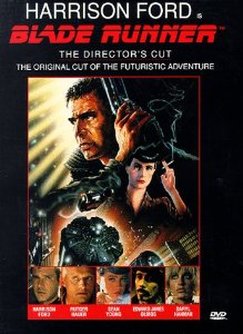
43. BLADE RUNNER (1982)
Directed by Ridley Scott. Starring: Harrison Ford, Rutger Hauer, Sean Young
Ridley Scott's poetic, visually stunning, neo-noir sci-fi masterpiece, with Harrison Ford leading the stellar cast. In a dark, dystopian 2019 Los Angeles filled with flying cars and rainy, smoky streets, Ford plays Deckard, a retired cop/"Blade Runner," whose main talent was in tracking down and "terminating" bioengineered "replicants," who are nearly indistinguishable from humans. Engineered by the Tyrell Corporation to be used as slaves in dangerous "off-world" colonization, the replicants have been designed with short, four-year lifespans. When four replicants rebel, kill the passengers and crew of an "off-world" shuttle, and head for earth to try to extend their lifespans, Deckard is forced out of retirement to hunt them down. Rutger Hauer is brilliant as Roy Batty, the statuesque, platinum blonde leader of the replicants, who only wants more time in a world where humanity has been snuffed out by "progress." Edward James Olmos, Brion James, Darryl Hannah, William Sanderson, and Sean Young stand out as well. Deemed a failure when it was first released, Blade Runner is now, rightfully, viewed as a classic, whether you're seeing the original release, with Ford providing the Chandleresque voice-overs, or the final or "Director's" cuts, which have removed the voice-overs and the tacked-on unambiguously happy ending. ****
Directed by Ridley Scott. Starring: Harrison Ford, Rutger Hauer, Sean Young
Ridley Scott's poetic, visually stunning, neo-noir sci-fi masterpiece, with Harrison Ford leading the stellar cast. In a dark, dystopian 2019 Los Angeles filled with flying cars and rainy, smoky streets, Ford plays Deckard, a retired cop/"Blade Runner," whose main talent was in tracking down and "terminating" bioengineered "replicants," who are nearly indistinguishable from humans. Engineered by the Tyrell Corporation to be used as slaves in dangerous "off-world" colonization, the replicants have been designed with short, four-year lifespans. When four replicants rebel, kill the passengers and crew of an "off-world" shuttle, and head for earth to try to extend their lifespans, Deckard is forced out of retirement to hunt them down. Rutger Hauer is brilliant as Roy Batty, the statuesque, platinum blonde leader of the replicants, who only wants more time in a world where humanity has been snuffed out by "progress." Edward James Olmos, Brion James, Darryl Hannah, William Sanderson, and Sean Young stand out as well. Deemed a failure when it was first released, Blade Runner is now, rightfully, viewed as a classic, whether you're seeing the original release, with Ford providing the Chandleresque voice-overs, or the final or "Director's" cuts, which have removed the voice-overs and the tacked-on unambiguously happy ending. ****
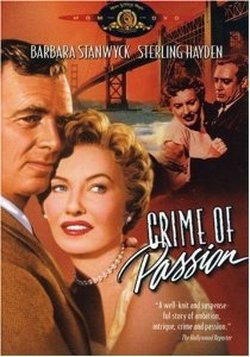
44. CRIME OF PASSION (1957)
Directed by Gerd Oswald. Starring: Babara Stanwyck, Sterling Hayden, Raymond Burr
Unusual, adult, hard-edged, slightly melodramatic, classic noir that’s both progressive and subversive in its feminist depiction of 50s suburban housewife hell. Stanwyck is terrific, as usual, as a talented newspaper columnist determined not to suffer the dull fate of 50s conformity most women aspired to. But then she falls for tough cop Sterling Hayden and replaces her own career with ambition for her hunky hubby, who she’ll go to any lengths for, including adultery and murder. This is grown up stuff handled in a grown up manner, with a tough, noir ending reminiscent of The Maltese Falcon, without the frills. ****
Directed by Gerd Oswald. Starring: Babara Stanwyck, Sterling Hayden, Raymond Burr
Unusual, adult, hard-edged, slightly melodramatic, classic noir that’s both progressive and subversive in its feminist depiction of 50s suburban housewife hell. Stanwyck is terrific, as usual, as a talented newspaper columnist determined not to suffer the dull fate of 50s conformity most women aspired to. But then she falls for tough cop Sterling Hayden and replaces her own career with ambition for her hunky hubby, who she’ll go to any lengths for, including adultery and murder. This is grown up stuff handled in a grown up manner, with a tough, noir ending reminiscent of The Maltese Falcon, without the frills. ****
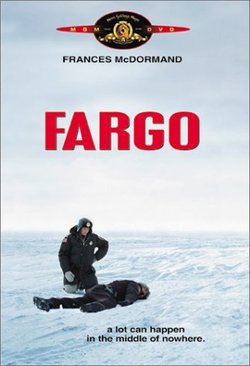
45. FARGO (1996)
Directed by Joel and Ethan Coen. Starring: Frances McDormand, Steve Buscemi
Against a backdrop of endless snowfall, hapless, smiley, terminally nervous Minneapolis car salesman Jerry Lundegaard (William H. Macy) hires two dim bulb thugs (Steve Buscemi, Peter Stormare) to kidnap his wife in the Coen brothers' darkly comic tale of crime and violence amongst the overly polite denizens of the frozen north. Jerry -- in trouble thanks to a convoluted scheme involving a finance fraud scam -- hopes to dig himself out by collecting a huge ransom from his wife's rich, ill-tempered father. It all blows up in Jerry's face when the seemingly simple plot results in a brutal triple homicide, and pregnant, aw-shucks police chief Marge Gunderson (Frances McDormand) begins relentlessly tracking down the killers. With its grotesque murders and cheery detectives, this eerily screwy, scathingly funny neo-noir opens up the realms of darkness concealed beneath a world of white. ****
Directed by Joel and Ethan Coen. Starring: Frances McDormand, Steve Buscemi
Against a backdrop of endless snowfall, hapless, smiley, terminally nervous Minneapolis car salesman Jerry Lundegaard (William H. Macy) hires two dim bulb thugs (Steve Buscemi, Peter Stormare) to kidnap his wife in the Coen brothers' darkly comic tale of crime and violence amongst the overly polite denizens of the frozen north. Jerry -- in trouble thanks to a convoluted scheme involving a finance fraud scam -- hopes to dig himself out by collecting a huge ransom from his wife's rich, ill-tempered father. It all blows up in Jerry's face when the seemingly simple plot results in a brutal triple homicide, and pregnant, aw-shucks police chief Marge Gunderson (Frances McDormand) begins relentlessly tracking down the killers. With its grotesque murders and cheery detectives, this eerily screwy, scathingly funny neo-noir opens up the realms of darkness concealed beneath a world of white. ****
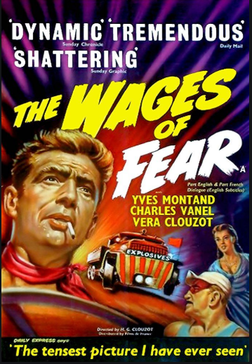
46. THE WAGES OF FEAR (1953)
Directed by Henri-Georges Clouzot. Starring: Yves Montand, Charles Vanel
Henri-Georges Cluzot's anti-capitalist, existentialist thriller is a pulse-pounding ride down a bumpy, mountain road with a truckload of nitro. Make that two truckloads of nitro, as four down-on-their-luck truck drivers, stuck in the dusty, sweltering, isolated Central American village of Las Piedras and desperate to earn a ticket back to civilization, take on a suicide mission of a job (at $2,000 a man) with the big American oil company that seemingly owns the entire banana republic. The job: to transport two truckloads of nitroglycerine across 300 miles of dangerous road to stop an oil fire at a drilling site. The last hour-and-a-half is all white-knuckled suspense as the two teams of truckers try to navigate a series of escalating dangers on the road that are a hundred times more terrifying than any fake CGI effects Hollywood can gin up in today's green-screen-filled box-office blockbusters. Is it noir? It depends on your point of view. What it surely is, though, is one of the bleakest, most gripping and disturbingly nihilistic films ever made. ****
Directed by Henri-Georges Clouzot. Starring: Yves Montand, Charles Vanel
Henri-Georges Cluzot's anti-capitalist, existentialist thriller is a pulse-pounding ride down a bumpy, mountain road with a truckload of nitro. Make that two truckloads of nitro, as four down-on-their-luck truck drivers, stuck in the dusty, sweltering, isolated Central American village of Las Piedras and desperate to earn a ticket back to civilization, take on a suicide mission of a job (at $2,000 a man) with the big American oil company that seemingly owns the entire banana republic. The job: to transport two truckloads of nitroglycerine across 300 miles of dangerous road to stop an oil fire at a drilling site. The last hour-and-a-half is all white-knuckled suspense as the two teams of truckers try to navigate a series of escalating dangers on the road that are a hundred times more terrifying than any fake CGI effects Hollywood can gin up in today's green-screen-filled box-office blockbusters. Is it noir? It depends on your point of view. What it surely is, though, is one of the bleakest, most gripping and disturbingly nihilistic films ever made. ****
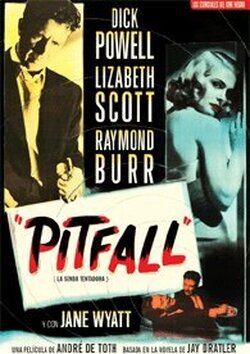
47. PITFALL (1948)
Directed by Andre De Toth. Starring: Dick Powell, Lizabeth Scott, Raymond Burr
Dick Powell is the archetypal average post-war American man living out the American dream in the suburbs. He has a beautiful, loving wife (Jane Wyatt), a little boy, and a boring job as an insurance man. Then one day he meets Mona Stevens (Lizabeth Scott), a sultry, alluring blonde whose boyfriend is serving time for embezzlement. One thing leads to another, and before you know it, Mister Straight Arrow has fallen into a, well, pitfall. Then along comes Raymond Burr, a sleazy private eye who's got his eyes on Mona, and will stop at nothing to get what he wants. A quietly brilliant little morality tale with a dark undercurrent. ****
Directed by Andre De Toth. Starring: Dick Powell, Lizabeth Scott, Raymond Burr
Dick Powell is the archetypal average post-war American man living out the American dream in the suburbs. He has a beautiful, loving wife (Jane Wyatt), a little boy, and a boring job as an insurance man. Then one day he meets Mona Stevens (Lizabeth Scott), a sultry, alluring blonde whose boyfriend is serving time for embezzlement. One thing leads to another, and before you know it, Mister Straight Arrow has fallen into a, well, pitfall. Then along comes Raymond Burr, a sleazy private eye who's got his eyes on Mona, and will stop at nothing to get what he wants. A quietly brilliant little morality tale with a dark undercurrent. ****
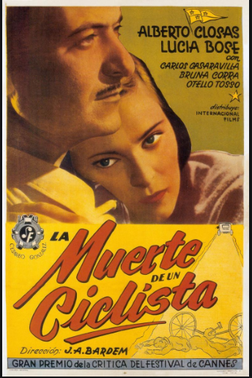
48. DEATH OF A CYCLIST (1955)
Directed by Juan Antonio Bardem. Starring: Lucia Bose, Alberto Closas
Three people are caught in a web of misunderstanding and distrust in Juan Antonio Bardem's Hitchcockian tale of doomed lovers who commit a terrible crime and pay the big price. As the film opens, illicit lovers Juan (Closas) and Maria Jose (Lucia Bose) hit a cyclist while driving on a deserted road, and, rather than reporting the accident, they leave him there to die so their affair can remain in the shadows. They think their crime went undetected, but they are soon plunged into doubt when a potential witness emerges and appears to be toying with them. The ever-rising tension keeps ratcheting up until things come to a screeching head in classic noir fashion. ****
Directed by Juan Antonio Bardem. Starring: Lucia Bose, Alberto Closas
Three people are caught in a web of misunderstanding and distrust in Juan Antonio Bardem's Hitchcockian tale of doomed lovers who commit a terrible crime and pay the big price. As the film opens, illicit lovers Juan (Closas) and Maria Jose (Lucia Bose) hit a cyclist while driving on a deserted road, and, rather than reporting the accident, they leave him there to die so their affair can remain in the shadows. They think their crime went undetected, but they are soon plunged into doubt when a potential witness emerges and appears to be toying with them. The ever-rising tension keeps ratcheting up until things come to a screeching head in classic noir fashion. ****
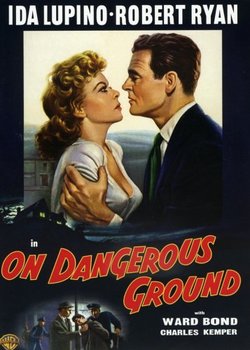
49. ON DANGEROUS GROUND (1951)
Directed by Nicholas Ray. Starring: Ida Lupino, Robert Ryan
Nicholas Ray's powerful story of an embittered big-city cop (Robert Ryan, excellent, as usual), sent to a rural town up north after severely beating several suspects. Detective Jim Wilson, full of rage and hatred after years of dealing with low-life criminals, is assigned to a case far from the city to find the killer of a young girl. There, in a small, snow-covered hamlet, Wilson finds himself paired with Walter Brent, the victim's enraged, rifle-toting father (Ward Bond), whose only plan is to shoot the killer himself on sight. The chase leads the two to the isolated home of Mary, a kind and beautiful blind woman (the lovely and supremely talented Ida Lupino), whose young, mentally handicapped brother is the killer. Despite her blindness, Mary has been caring for her brother since their parents died. Wilson sees himself mirrored in the blindly enraged Brent, and also sees his salvation in Mary. Ray, who co-wrote the script with A.I. Bezzerides, handles it all with his usual deft touch. Brilliant and touching. ***1/2
Directed by Nicholas Ray. Starring: Ida Lupino, Robert Ryan
Nicholas Ray's powerful story of an embittered big-city cop (Robert Ryan, excellent, as usual), sent to a rural town up north after severely beating several suspects. Detective Jim Wilson, full of rage and hatred after years of dealing with low-life criminals, is assigned to a case far from the city to find the killer of a young girl. There, in a small, snow-covered hamlet, Wilson finds himself paired with Walter Brent, the victim's enraged, rifle-toting father (Ward Bond), whose only plan is to shoot the killer himself on sight. The chase leads the two to the isolated home of Mary, a kind and beautiful blind woman (the lovely and supremely talented Ida Lupino), whose young, mentally handicapped brother is the killer. Despite her blindness, Mary has been caring for her brother since their parents died. Wilson sees himself mirrored in the blindly enraged Brent, and also sees his salvation in Mary. Ray, who co-wrote the script with A.I. Bezzerides, handles it all with his usual deft touch. Brilliant and touching. ***1/2
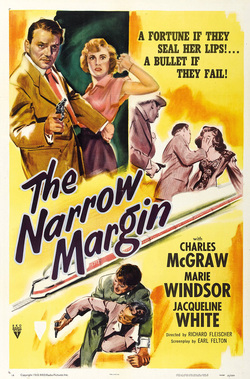
50. THE NARROW MARGIN (1952)
Directed by Richard Fleischer. Starring: Charles McGraw, Marie Windsor
Tense, taut thriller about a hard-boiled cop (gravel-voiced noir god Charles McGraw) assigned to bring a mob boss's widow (sultry noir goddess Marie Windsor) from Chicago to L.A. by train to testify before a grand jury. Also aboard the train are mob assassins determined to get her. Fantastic, low-budget, pulpish noir, flawlessly directed by Richard Fleischer, with a well-executed twist and two of noir's best in McGraw and Windsor going at it. While on the way to pick up their witness, McGraw bets his partner (Don Beddoe) what kind of dame she'll be: "She's the sixty-cent special," McGraw snaps. "Cheap, flashy. Strictly poison under the gravy." Noir doesn't get much better than this. ***1/2
Directed by Richard Fleischer. Starring: Charles McGraw, Marie Windsor
Tense, taut thriller about a hard-boiled cop (gravel-voiced noir god Charles McGraw) assigned to bring a mob boss's widow (sultry noir goddess Marie Windsor) from Chicago to L.A. by train to testify before a grand jury. Also aboard the train are mob assassins determined to get her. Fantastic, low-budget, pulpish noir, flawlessly directed by Richard Fleischer, with a well-executed twist and two of noir's best in McGraw and Windsor going at it. While on the way to pick up their witness, McGraw bets his partner (Don Beddoe) what kind of dame she'll be: "She's the sixty-cent special," McGraw snaps. "Cheap, flashy. Strictly poison under the gravy." Noir doesn't get much better than this. ***1/2
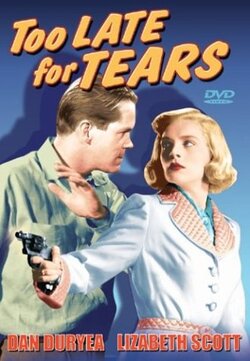
51. TOO LATE FOR TEARS (1949)
Directed by Byron Haskin. Starring: Lizabeth Scott, Dan Duryea, Don Defore
Lizabeth Scott plays a social climbing wife who will stop at nothing to rise above her middle-class circumstances. Jane Palmer (Scott) and her honest hubby, Alan (Arthur Kennedy), are in their convertible, on their way to a party in the Hollywood Hills one night when someone in a passing car tosses a suitcase full of cash into their back seat. Another convertible -- the one the cash was meant for -- comes speeding up behind them, chasing them down out of the hills. The couple lose their follower and head home to their apartment, where they count the money. Alan wants to turn it in to the cops, but Jane talks him out of it, for now. Alan puts the suitcase full of money in a locker at Union Station. A couple of days later, while Alan's at work, Danny (Dan Duryea) shows up, claiming to be a detective, and quickly learns Jane's been spending the money. Jane tries to kill Danny, but her plan fails, so she moves to plan B: she'll split the money with him, but first she has to take care of her husband. It isn't long before the criminal -- played beautifully by Duryea -- realizes his sexy victim-turned-accomplice has more of a stomach for evil than he does. This noir, which relates to the ambitions the middle class had during the post-war years, features one of noir's more despicable femme fatales, and Lizabeth Scott delivers a fine performance dripping with silky villainy. ****
Directed by Byron Haskin. Starring: Lizabeth Scott, Dan Duryea, Don Defore
Lizabeth Scott plays a social climbing wife who will stop at nothing to rise above her middle-class circumstances. Jane Palmer (Scott) and her honest hubby, Alan (Arthur Kennedy), are in their convertible, on their way to a party in the Hollywood Hills one night when someone in a passing car tosses a suitcase full of cash into their back seat. Another convertible -- the one the cash was meant for -- comes speeding up behind them, chasing them down out of the hills. The couple lose their follower and head home to their apartment, where they count the money. Alan wants to turn it in to the cops, but Jane talks him out of it, for now. Alan puts the suitcase full of money in a locker at Union Station. A couple of days later, while Alan's at work, Danny (Dan Duryea) shows up, claiming to be a detective, and quickly learns Jane's been spending the money. Jane tries to kill Danny, but her plan fails, so she moves to plan B: she'll split the money with him, but first she has to take care of her husband. It isn't long before the criminal -- played beautifully by Duryea -- realizes his sexy victim-turned-accomplice has more of a stomach for evil than he does. This noir, which relates to the ambitions the middle class had during the post-war years, features one of noir's more despicable femme fatales, and Lizabeth Scott delivers a fine performance dripping with silky villainy. ****
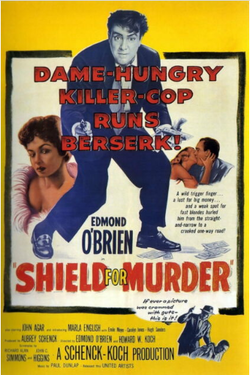
52. SHIELD FOR MURDER (1954)
Directed by Edmond O'Brien, Howard W. Koch. Starring: Edmond O'Brien, John Agar
Edmond O'Brien is a hurtling bowling ball of desperation as "dame-hungry" cop gone sour Barney Nolan. Barney's a 16-year veteran of the force who's had it and decides it's time to get a piece of the American dream for himself, so he guns a bookie down in cold blood and pockets the 25 grand he's carrying. His idea of the American dream turns out to be as 1950s American as it gets: a modest, ranch-style model home in a cookie cutter subdivision. When Barney takes his va-va-va-voom girlfriend, Patty, to see his dream home, he sneaks out to the back yard and buries the boodle while Patty's ogling the radar range and furniture. Things start to unravel, however, when a witness shows up at the precinct -- a deaf mute who saw the entire shooting, except for Barney's face.
O'Brien, who co-directed from a script cowritten by noir specialist John C. Higgins (T-Men, Raw Deal, He Walked By Night), is at his best as he grows more unhinged and desperate with each scene, barreling through the streets in doomed desperation that equals his performance in D.O.A. Film flashes with brilliance as a frantic Barney pummels two sleazy private eyes (including Claude Akins) in the middle of a restaurant while patrons scream and cringe. Later a meet-up at a public pool explodes into a violent chase and shoot-out as terrified locals in swimsuits dive underwater for cover. Rarely has anything like it been done better. This is a breakneck, top of the heap B-movie that deserves to take its place among the very best of the cop-gone-bad subgenre of noir. ***1/2
Directed by Edmond O'Brien, Howard W. Koch. Starring: Edmond O'Brien, John Agar
Edmond O'Brien is a hurtling bowling ball of desperation as "dame-hungry" cop gone sour Barney Nolan. Barney's a 16-year veteran of the force who's had it and decides it's time to get a piece of the American dream for himself, so he guns a bookie down in cold blood and pockets the 25 grand he's carrying. His idea of the American dream turns out to be as 1950s American as it gets: a modest, ranch-style model home in a cookie cutter subdivision. When Barney takes his va-va-va-voom girlfriend, Patty, to see his dream home, he sneaks out to the back yard and buries the boodle while Patty's ogling the radar range and furniture. Things start to unravel, however, when a witness shows up at the precinct -- a deaf mute who saw the entire shooting, except for Barney's face.
O'Brien, who co-directed from a script cowritten by noir specialist John C. Higgins (T-Men, Raw Deal, He Walked By Night), is at his best as he grows more unhinged and desperate with each scene, barreling through the streets in doomed desperation that equals his performance in D.O.A. Film flashes with brilliance as a frantic Barney pummels two sleazy private eyes (including Claude Akins) in the middle of a restaurant while patrons scream and cringe. Later a meet-up at a public pool explodes into a violent chase and shoot-out as terrified locals in swimsuits dive underwater for cover. Rarely has anything like it been done better. This is a breakneck, top of the heap B-movie that deserves to take its place among the very best of the cop-gone-bad subgenre of noir. ***1/2
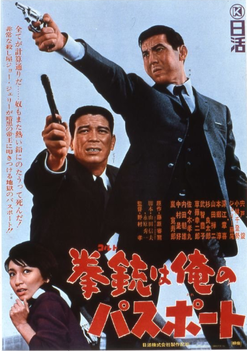
53. A COLT IS MY PASSPORT (1967)
Directed by Takashi Nomura. Starring: Joe Shishido, Jerry Fujio
Stylish, hard-boiled Nikkatsu noodle noir with spaghetti western overtones, starring chipmunk-cheeked tough guy Joe Shishido as a hitman hired by the yakuza to rub out a rival gang's boss, only to be betrayed and targeted by both sides. After pulling off the bump-off, Shishido -- who had his cheekbones surgically augmented in 1957 for some reason, making him look like he has a perpetual case of the mumps -- and his partner (Jerry Fujido) hide out in a cheap trucker hotel outside of Yokohama where, with the help of a fetching hotel maid (Chitose Kobayashi), they plan to make their getaway on a barge bound for foreign shores. Before their ship comes in, however, the bad guys catch up with them, leading to an audacious shootout at a desolate landfill overlooking the docks. Fantastic, gritty film with the final, explosive showdown reminiscent of the best of Sergio Leone. Of particular note is the fabulous score by Harumi Ibe, which mimics Ennio Morricone's spaghetti western scores for Leone. ***1/2
Directed by Takashi Nomura. Starring: Joe Shishido, Jerry Fujio
Stylish, hard-boiled Nikkatsu noodle noir with spaghetti western overtones, starring chipmunk-cheeked tough guy Joe Shishido as a hitman hired by the yakuza to rub out a rival gang's boss, only to be betrayed and targeted by both sides. After pulling off the bump-off, Shishido -- who had his cheekbones surgically augmented in 1957 for some reason, making him look like he has a perpetual case of the mumps -- and his partner (Jerry Fujido) hide out in a cheap trucker hotel outside of Yokohama where, with the help of a fetching hotel maid (Chitose Kobayashi), they plan to make their getaway on a barge bound for foreign shores. Before their ship comes in, however, the bad guys catch up with them, leading to an audacious shootout at a desolate landfill overlooking the docks. Fantastic, gritty film with the final, explosive showdown reminiscent of the best of Sergio Leone. Of particular note is the fabulous score by Harumi Ibe, which mimics Ennio Morricone's spaghetti western scores for Leone. ***1/2
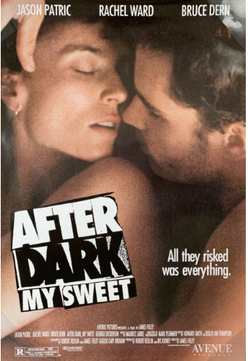
54. AFTER DARK MY SWEET (1990)
Directed by James Foley. Starring: Jason Paric, Rachel Ward, Bruce Dern
Terrific, uncompromising and underappreciated neo-noir based on the Jim Thompson novel of the same name. Jason Patric gives a sensational performance as Collie, the slack-jawed, bestubbled, seemingly punch-drunk ex-pug who escapes from a mental asylum and shambles into a desert town near Palm Springs, and a long-simmering kidnapping plot. Collie is enshrouded in a sense of doom from the moment he meets sultry alcoholic widow Fay (Rachel Ward), who hires him on (and takes him in) to help fix up her run-down estate left to her by her dead husband. Into the picture slithers "Uncle Bud" (Bruce Dern, fantastic, as always), a sleazy ex-cop who has long been hatching a kidnap scheme with Fay, with only the need for a third hand holding them back. They enlist the reluctant Collie, and the three of them put the snatch on a rich man's child, but it all goes wrong from the get-go, with disastrous results. A bit too talky and convoluted for its own good, but a beautifully realized noir nonetheless, with richly nuanced characters, gorgeous cinematography by Mark Plummer, and especially Patric's bravura performance making this a must-see. ***1/2
Directed by James Foley. Starring: Jason Paric, Rachel Ward, Bruce Dern
Terrific, uncompromising and underappreciated neo-noir based on the Jim Thompson novel of the same name. Jason Patric gives a sensational performance as Collie, the slack-jawed, bestubbled, seemingly punch-drunk ex-pug who escapes from a mental asylum and shambles into a desert town near Palm Springs, and a long-simmering kidnapping plot. Collie is enshrouded in a sense of doom from the moment he meets sultry alcoholic widow Fay (Rachel Ward), who hires him on (and takes him in) to help fix up her run-down estate left to her by her dead husband. Into the picture slithers "Uncle Bud" (Bruce Dern, fantastic, as always), a sleazy ex-cop who has long been hatching a kidnap scheme with Fay, with only the need for a third hand holding them back. They enlist the reluctant Collie, and the three of them put the snatch on a rich man's child, but it all goes wrong from the get-go, with disastrous results. A bit too talky and convoluted for its own good, but a beautifully realized noir nonetheless, with richly nuanced characters, gorgeous cinematography by Mark Plummer, and especially Patric's bravura performance making this a must-see. ***1/2
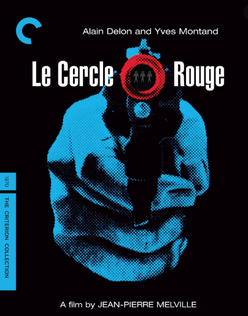
55. LE CERCLE ROUGE (1970)
Directed by Jean-Pierre Melville. Starring: Alain Delon, Andre Bourvil, Yves Montand
Fate brings two crooks, Corey and Vogel, together in the French countryside in Jean-Pierre Melville's cool, understated tale of cops and robbers and the moral codes they live -- and die -- by. Corey (Alain Delon) is a doleful hood who has just been released from prison. Vogel (Gian Maria Volonte) is being taken by train from Marseilles to Paris by veteran cop Inspector Mattei (Andrei Bourvil) when he slips his handcuffs, breaks a window and leaps from the moving train, escaping into open country with Mattei on his tail. Corey, having forcefully taken a lot of cash and a gun from the gangster Rico, a former accomplice who owes him, is on his way to Paris in a large American car when he runs into a roadblock set up to catch Vogel. Corey stops at a roadside diner and allows Vogel to hide in the boot of his car, and drives off, pulls off into a muddy field, gets out of the car and tells Vogel he can get out. After a tense standoff, Vogel realizes Corey is trying to help him, gets back in the boot and they get back on the road, until Corey's pulled over by two of Rico's armed gunmen, who force him to pull over. They order Corey to walk into the woods, intending to shoot him, but Vogel appears behind them, holding Corey's gun, and saves his new partner. The two -- along with alcoholic ex-cop Jansen (Yves Montand) -- become accomplices in an elaborate heist of a swank Place Vendome jewelry store, which ends in exquisitely tragic noir fashion. Melville's stylish, moody noir is a master class in slow burn and an existential meditation on honor among crooks. ***1/2
Directed by Jean-Pierre Melville. Starring: Alain Delon, Andre Bourvil, Yves Montand
Fate brings two crooks, Corey and Vogel, together in the French countryside in Jean-Pierre Melville's cool, understated tale of cops and robbers and the moral codes they live -- and die -- by. Corey (Alain Delon) is a doleful hood who has just been released from prison. Vogel (Gian Maria Volonte) is being taken by train from Marseilles to Paris by veteran cop Inspector Mattei (Andrei Bourvil) when he slips his handcuffs, breaks a window and leaps from the moving train, escaping into open country with Mattei on his tail. Corey, having forcefully taken a lot of cash and a gun from the gangster Rico, a former accomplice who owes him, is on his way to Paris in a large American car when he runs into a roadblock set up to catch Vogel. Corey stops at a roadside diner and allows Vogel to hide in the boot of his car, and drives off, pulls off into a muddy field, gets out of the car and tells Vogel he can get out. After a tense standoff, Vogel realizes Corey is trying to help him, gets back in the boot and they get back on the road, until Corey's pulled over by two of Rico's armed gunmen, who force him to pull over. They order Corey to walk into the woods, intending to shoot him, but Vogel appears behind them, holding Corey's gun, and saves his new partner. The two -- along with alcoholic ex-cop Jansen (Yves Montand) -- become accomplices in an elaborate heist of a swank Place Vendome jewelry store, which ends in exquisitely tragic noir fashion. Melville's stylish, moody noir is a master class in slow burn and an existential meditation on honor among crooks. ***1/2
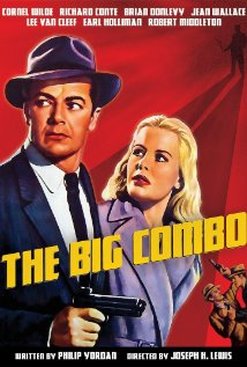
56. THE BIG COMBO (1955)
Directed by Joseph H. Lewis. Starring: Cornel Wilde, Richard Conte
Big, brassy tale of obsessed police lieutenant Leonard Diamond's (Cornell Wilde)crusade to bring down fast-talking, sadistic, and seemingly untouchable gangster Mr. Brown, played with a high-gloss smile by Richard Conte. Diamond's obsession strays to Mr. Brown's suicidal girlfriend, Susan Lowell (Jean Wallace), but his investigation focuses on the gangster's long-missing wife, who, it turns out, got sent to a sanitarium after witnessing her hubby murder his boss on a yacht by tying him to the anchor and dropping him in. The cast also features Brian Donlevy as a hearing-impaired ex-boss who Mr. Brown keeps on the payroll so he can demean him, and Lee Van Cleef and Earl Holliman as the gangster's two button men, but it's Conte's slick performance and the work of legendary noir cinematographer John Alton that drives this one. ***1/2
Directed by Joseph H. Lewis. Starring: Cornel Wilde, Richard Conte
Big, brassy tale of obsessed police lieutenant Leonard Diamond's (Cornell Wilde)crusade to bring down fast-talking, sadistic, and seemingly untouchable gangster Mr. Brown, played with a high-gloss smile by Richard Conte. Diamond's obsession strays to Mr. Brown's suicidal girlfriend, Susan Lowell (Jean Wallace), but his investigation focuses on the gangster's long-missing wife, who, it turns out, got sent to a sanitarium after witnessing her hubby murder his boss on a yacht by tying him to the anchor and dropping him in. The cast also features Brian Donlevy as a hearing-impaired ex-boss who Mr. Brown keeps on the payroll so he can demean him, and Lee Van Cleef and Earl Holliman as the gangster's two button men, but it's Conte's slick performance and the work of legendary noir cinematographer John Alton that drives this one. ***1/2
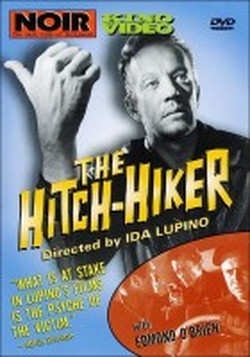
57. THE HITCH-HIKER (1952)
Directed by Ida Lupino. Starring: William Talman, Edmund O'Brien, Frank Lovejoy William Talman delivers one of noir’s most menacing performances as droopy-eyed evil personified in director Ida Lupino’s chilling tale of darkness on the road in post-war America. Based on the true story of psychopathic killer Billy Cook, who went on a murder spree between Missouri and California in 1950-51. Edmond O'Brien and Frank Lovejoy are solid as two fishing buddies, on their way to a fishing trip in a Mexican town on the Gulf of California, who pick up hitch-hiker Emmett Myers (Talman) on the road, only to find out that he's the cold-blooded killer who's been murdering his way across the west. Myers as much as tells them he's going to kill them as soon as he no longer needs them to get to where he's going. The only true noir directed by a woman. ***1/2
Directed by Ida Lupino. Starring: William Talman, Edmund O'Brien, Frank Lovejoy William Talman delivers one of noir’s most menacing performances as droopy-eyed evil personified in director Ida Lupino’s chilling tale of darkness on the road in post-war America. Based on the true story of psychopathic killer Billy Cook, who went on a murder spree between Missouri and California in 1950-51. Edmond O'Brien and Frank Lovejoy are solid as two fishing buddies, on their way to a fishing trip in a Mexican town on the Gulf of California, who pick up hitch-hiker Emmett Myers (Talman) on the road, only to find out that he's the cold-blooded killer who's been murdering his way across the west. Myers as much as tells them he's going to kill them as soon as he no longer needs them to get to where he's going. The only true noir directed by a woman. ***1/2
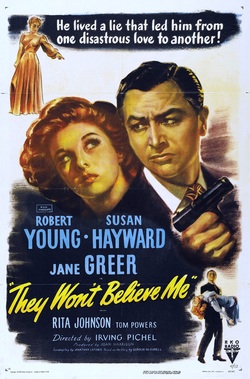
58. THEY WON'T BELIEVE ME (1947)
Directed by Irving Pichel. Starring: Robert Young, Jane Greer, Susan Hayward
Terrific noir about a feckless philanderer (Robert Young) with a rich wife (Rita Johnson) and involved with first one woman (Jane Greer), then another (Susan Hayward), with tragic consequences. Story has often been compared to James M. Cain's novels, with good reason, only in this one it's the male in the femme fatale role. Young, particularly, does extremely well, cast against type as a gutless, cheating louse who attempts to change his ways, but it's too late. Fate, he intones, has dealt him one from the bottom of the deck. Some great twists -- including a knockout final scene -- make this a top notch, and underrated, noir. ***1/2
Directed by Irving Pichel. Starring: Robert Young, Jane Greer, Susan Hayward
Terrific noir about a feckless philanderer (Robert Young) with a rich wife (Rita Johnson) and involved with first one woman (Jane Greer), then another (Susan Hayward), with tragic consequences. Story has often been compared to James M. Cain's novels, with good reason, only in this one it's the male in the femme fatale role. Young, particularly, does extremely well, cast against type as a gutless, cheating louse who attempts to change his ways, but it's too late. Fate, he intones, has dealt him one from the bottom of the deck. Some great twists -- including a knockout final scene -- make this a top notch, and underrated, noir. ***1/2
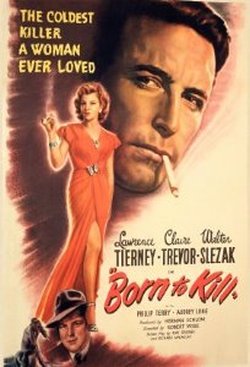
59. BORN TO KILL (1947)
Directed by Robert Wise. Starring: Lawrence Tierney, Claire Trevor
Sam Wilde and Helen Brent (Lawrence Tierney and Claire Trevor) revel in depravity in Robert Wise’s nasty tale of two psychopaths who find each other, for better or worse. Okay, it's always worse. Tierney, never subtle, is all menace, while Trevor matches him sneer for sneer. Walter Slezak, Esther Howard, and Elisha Cook, Jr., provide excellent background work in this dark film about the grimmest corners of the human psyche. As Marty (Cook) tells his unhinged pal Sam, "You can't just go around killing people when the notion strikes you. It's just not feasible." ***1/2
Directed by Robert Wise. Starring: Lawrence Tierney, Claire Trevor
Sam Wilde and Helen Brent (Lawrence Tierney and Claire Trevor) revel in depravity in Robert Wise’s nasty tale of two psychopaths who find each other, for better or worse. Okay, it's always worse. Tierney, never subtle, is all menace, while Trevor matches him sneer for sneer. Walter Slezak, Esther Howard, and Elisha Cook, Jr., provide excellent background work in this dark film about the grimmest corners of the human psyche. As Marty (Cook) tells his unhinged pal Sam, "You can't just go around killing people when the notion strikes you. It's just not feasible." ***1/2
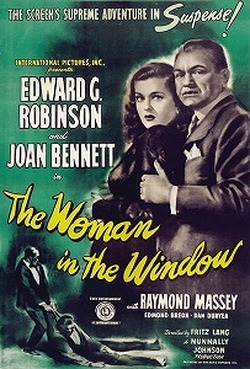
60. THE WOMAN IN THE WINDOW (1944)
Directed by Fritz Lang. Starring: Edward G. Robinson, Joan Bennett
Mild-mannered criminology professor Edward G. Robinson gets in trouble with a beautiful dame (Joan Bennett) when his wife and kids are out of town in this twisting Fritz Lang tale. Dan Duryea is, as usual, eminently watchable in his familiar role as a sleazy blackmailer. The trio reunited a year later with Lang for the superb Scarlet Street. This one coulda been a contender. If only they hadn’t gone with that cheesy surprise ending. ***1/2
Directed by Fritz Lang. Starring: Edward G. Robinson, Joan Bennett
Mild-mannered criminology professor Edward G. Robinson gets in trouble with a beautiful dame (Joan Bennett) when his wife and kids are out of town in this twisting Fritz Lang tale. Dan Duryea is, as usual, eminently watchable in his familiar role as a sleazy blackmailer. The trio reunited a year later with Lang for the superb Scarlet Street. This one coulda been a contender. If only they hadn’t gone with that cheesy surprise ending. ***1/2
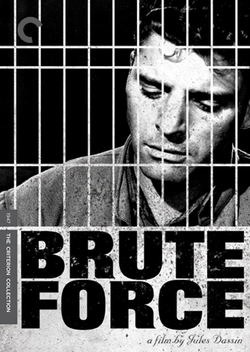
61. BRUTE FORCE (1947)
Directed by Jules Dassin. Starring: Burt Lancaster, Hume Cronyn
Tough Jules Dassin prison noir, starring Burt Lancaster as desperate inmate Joe Collins, a powder keg of a man whose wife needs cancer surgery but won’t go under the knife unless Joe is there with her. Joe plots an elaborate escape, but when it goes wrong, it blows up into an explosive battle between the inmates and guards, led by sadistic Security Chief Hume Cronyn. Fantastic, furious ending. Easily one of the greatest prison movies ever made. ***1/2
Directed by Jules Dassin. Starring: Burt Lancaster, Hume Cronyn
Tough Jules Dassin prison noir, starring Burt Lancaster as desperate inmate Joe Collins, a powder keg of a man whose wife needs cancer surgery but won’t go under the knife unless Joe is there with her. Joe plots an elaborate escape, but when it goes wrong, it blows up into an explosive battle between the inmates and guards, led by sadistic Security Chief Hume Cronyn. Fantastic, furious ending. Easily one of the greatest prison movies ever made. ***1/2
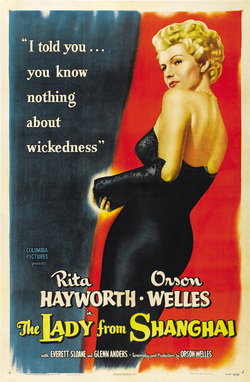
62. THE LADY FROM SHANGHAI (1947)
Directed by Orson Welles. Starring: Rita Hayworth, Orson Welles
Orson Welles' technical mastery highlights this rambling, convoluted tale of lies, deceipt, and murder. Rita Hayworth is Elsa Bannister, beautiful wife of famed disabled criminal defense attorney Arthur Bannister (Everett Sloan), who lures seaman Michael O'Hara (Welles) into her web. The Bannisters hire Michael as crew on their yacht, then set sail from New York to San Francisco via the Panama Canal. Also aboard for the cruise is Bannister's partner, George Grisby, who proposes that Michael "murder" him in a plot to fake his own death, assuring Michael that, since there would be no body, Michael would never be convicted of murder. Of course, the reality is a lot more sinister, and it all ends in the famous hall-of-mirrors shoot-out. A Wellesian classic. ***1/2
Directed by Orson Welles. Starring: Rita Hayworth, Orson Welles
Orson Welles' technical mastery highlights this rambling, convoluted tale of lies, deceipt, and murder. Rita Hayworth is Elsa Bannister, beautiful wife of famed disabled criminal defense attorney Arthur Bannister (Everett Sloan), who lures seaman Michael O'Hara (Welles) into her web. The Bannisters hire Michael as crew on their yacht, then set sail from New York to San Francisco via the Panama Canal. Also aboard for the cruise is Bannister's partner, George Grisby, who proposes that Michael "murder" him in a plot to fake his own death, assuring Michael that, since there would be no body, Michael would never be convicted of murder. Of course, the reality is a lot more sinister, and it all ends in the famous hall-of-mirrors shoot-out. A Wellesian classic. ***1/2
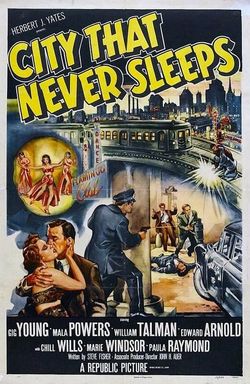
63. CITY THAT NEVER SLEEPS (1953)
Directed by John H. Auer. Starring: Gig Young, William Talman, Marie Windsor
Interesting tale of a night in the life of second-generation Chicago beat cop Johnny Kelly (Gig Young), who’s about to make the worst decision of his life, i.e., leave the police force and his wife for nightclub dancer Sally “Angel Face” Connors (Mala Powers). Needing cash to head west, Johnny’s made a deal with corrupt lawyer Penrod Biddel (Edward Arnold) to “arrest” his slick henchman, Hayes Stewart (the great William Talman), only instead of taking Stewart to jail, Johnny’s supposed to drive him to Indiana, where Stewart’s wanted for manslaughter. Stewart, though, is no fool, but he is fooling around with Biddel’s wife (sultry-eyed noir siren Marie Windsor). Throw in Johnny’s kid brother, Stubby, who’s been hanging around Stewart and is in danger of making a life-changing mistake himself, a “mechanical man” mime who’s in love with Angel Face, and Chill Wills as a veteran cop who rides along with Johnny on his fateful night dispensing pearls of wisdom, and you’ve got one great film. ***1/2
Directed by John H. Auer. Starring: Gig Young, William Talman, Marie Windsor
Interesting tale of a night in the life of second-generation Chicago beat cop Johnny Kelly (Gig Young), who’s about to make the worst decision of his life, i.e., leave the police force and his wife for nightclub dancer Sally “Angel Face” Connors (Mala Powers). Needing cash to head west, Johnny’s made a deal with corrupt lawyer Penrod Biddel (Edward Arnold) to “arrest” his slick henchman, Hayes Stewart (the great William Talman), only instead of taking Stewart to jail, Johnny’s supposed to drive him to Indiana, where Stewart’s wanted for manslaughter. Stewart, though, is no fool, but he is fooling around with Biddel’s wife (sultry-eyed noir siren Marie Windsor). Throw in Johnny’s kid brother, Stubby, who’s been hanging around Stewart and is in danger of making a life-changing mistake himself, a “mechanical man” mime who’s in love with Angel Face, and Chill Wills as a veteran cop who rides along with Johnny on his fateful night dispensing pearls of wisdom, and you’ve got one great film. ***1/2
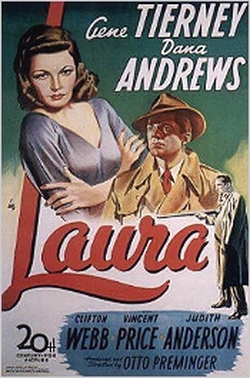
64. LAURA (1944)
Directed by Otto Preminger. Starring: Gene Tierney, Dana Andrews
Otto Preminger's mannered tale of obsession and murder is definitely style-over-substance. Dana Andrews is Mark McPherson, a cynical cop investigating the brutal shotgun slaying of beautiful advertising exec Laura Hunt (Gene Tierney). As the plot thickens, McPherson becomes obsessed with the victim. There is a by now well-known plot twist. Clifton Webb steals the show as creepy, decadent dandy Waldo Lydecker. ***1/2
Directed by Otto Preminger. Starring: Gene Tierney, Dana Andrews
Otto Preminger's mannered tale of obsession and murder is definitely style-over-substance. Dana Andrews is Mark McPherson, a cynical cop investigating the brutal shotgun slaying of beautiful advertising exec Laura Hunt (Gene Tierney). As the plot thickens, McPherson becomes obsessed with the victim. There is a by now well-known plot twist. Clifton Webb steals the show as creepy, decadent dandy Waldo Lydecker. ***1/2
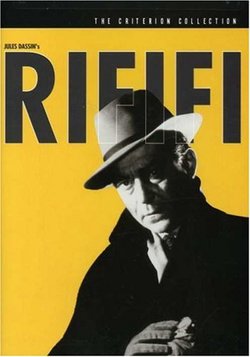
65. RIFIFI (1955)
Directed by Jules Dassin. Starring: Jean Servais, Carl Mohner
American director Jules Dassin directed this heist noir after being blacklisted from Hollywood and moving to France. Aging gangster Tony "le Stephanois" (Jean Servais) has served a five-year prison sentence for a jewel heist and is out on the street and down on his luck. His friend Jo approaches him about going in on a robbery. Tony declines, but then learns that his old girlfriend, Mado, has taken up with gangster nightclub owner Pierre Grutter, causing Tony to change his mind about the proposed robbery. Tony, Jo, Mario, and Cesar plan an almost impossible theft -- the burglary of an exclusive jewelry shop on the Rue de Rivoli. There is a half-hour heist scene depicting the crime in detail, as the gang gets away with the loot. But when the ruthless Grutter finds out that Tony and his pals have committed the robbery, he decides to steal the jewels from them. What follows is a series of brutal murders and the kidnapping of Jo's young son, and a memorable final scene with Tony driving maniacally through the streets of Paris in a desperate attempt to rescue the boy and bring him home. ***1/2
Directed by Jules Dassin. Starring: Jean Servais, Carl Mohner
American director Jules Dassin directed this heist noir after being blacklisted from Hollywood and moving to France. Aging gangster Tony "le Stephanois" (Jean Servais) has served a five-year prison sentence for a jewel heist and is out on the street and down on his luck. His friend Jo approaches him about going in on a robbery. Tony declines, but then learns that his old girlfriend, Mado, has taken up with gangster nightclub owner Pierre Grutter, causing Tony to change his mind about the proposed robbery. Tony, Jo, Mario, and Cesar plan an almost impossible theft -- the burglary of an exclusive jewelry shop on the Rue de Rivoli. There is a half-hour heist scene depicting the crime in detail, as the gang gets away with the loot. But when the ruthless Grutter finds out that Tony and his pals have committed the robbery, he decides to steal the jewels from them. What follows is a series of brutal murders and the kidnapping of Jo's young son, and a memorable final scene with Tony driving maniacally through the streets of Paris in a desperate attempt to rescue the boy and bring him home. ***1/2
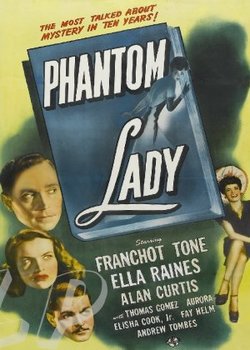
66. PHANTOM LADY (1944)
Directed by Robert Siodmak. Starring: Franchot Tone, Ella Raines, Alan Curtis
Great until Franchot Tone’s character comes in, staring maniacally at his murderous hands. His hackneyed crack-brain -- who just had to kill Curtis’ wife because she was laughing at him, and kept on laughing! -- drags this otherwise great noir down a notch. Beautiful photography of New York’s rain-soaked streets. Elisha Cook Jr.’s feverish jazz drummer scene is off-the-charts fantastic. Ella Raines is gorgeous as always as the secretary, doggedly working to clear her boss’ (Alan Curtis) name, the guy who just wants to build model cities with “children’s play yards everywhere for everyone.” ***1/2
Directed by Robert Siodmak. Starring: Franchot Tone, Ella Raines, Alan Curtis
Great until Franchot Tone’s character comes in, staring maniacally at his murderous hands. His hackneyed crack-brain -- who just had to kill Curtis’ wife because she was laughing at him, and kept on laughing! -- drags this otherwise great noir down a notch. Beautiful photography of New York’s rain-soaked streets. Elisha Cook Jr.’s feverish jazz drummer scene is off-the-charts fantastic. Ella Raines is gorgeous as always as the secretary, doggedly working to clear her boss’ (Alan Curtis) name, the guy who just wants to build model cities with “children’s play yards everywhere for everyone.” ***1/2
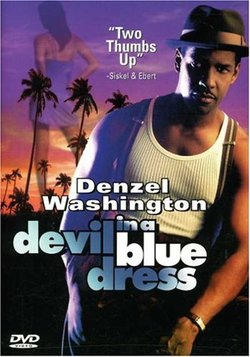
67. DEVIL IN A BLUE DRESS (1995)
Directed by Carl Franklin. Starring: Denzel Washington, Jennifer Beals
Fine Carl Franklin adaptation of the Walter Mosley novel about a black private eye caught up in a case that involves corruption at the highest levels of power in the city. The film opens in 1948 Los Angeles, with World War II vet Ezekiel "Easy" Rawlins (Denzel Washington) having been unfairly laid off from an aircraft manufacturer, so he becomes a private investigator to pay the mortgage on his house, despite having no training for the job. He accepts $100 from the shady DeWitt Albright (Tom Sizemore) to find Daphne Monet (Jennifer Beals), a mysterious woman who's been involved with a wealthy mayoral candidate. This is an engrossing, atmospheric, and complicated story of blackmail, race, and politics depicting a side of post-war American life largely ignored by Hollywood. There are inevitable parallels to Chinatown, but, while Devil doesn't quite reach those lofty heights, this is an important and well-made film, with good performances throughout, particularly by Washington, Sizemore, and Don Cheadle -- who nearly steals the movie with his portrayal of Easy's live-wire, trigger-happy buddy Mouse. The excellent period recreation and costumes add to the impressive production, which include Tak Fujimoto's terrific camerawork. A stylish neo-noir that captures not only L.A. in the forties, but the racial divide, and the color barrier that was in full force at the time. ***1/2
Directed by Carl Franklin. Starring: Denzel Washington, Jennifer Beals
Fine Carl Franklin adaptation of the Walter Mosley novel about a black private eye caught up in a case that involves corruption at the highest levels of power in the city. The film opens in 1948 Los Angeles, with World War II vet Ezekiel "Easy" Rawlins (Denzel Washington) having been unfairly laid off from an aircraft manufacturer, so he becomes a private investigator to pay the mortgage on his house, despite having no training for the job. He accepts $100 from the shady DeWitt Albright (Tom Sizemore) to find Daphne Monet (Jennifer Beals), a mysterious woman who's been involved with a wealthy mayoral candidate. This is an engrossing, atmospheric, and complicated story of blackmail, race, and politics depicting a side of post-war American life largely ignored by Hollywood. There are inevitable parallels to Chinatown, but, while Devil doesn't quite reach those lofty heights, this is an important and well-made film, with good performances throughout, particularly by Washington, Sizemore, and Don Cheadle -- who nearly steals the movie with his portrayal of Easy's live-wire, trigger-happy buddy Mouse. The excellent period recreation and costumes add to the impressive production, which include Tak Fujimoto's terrific camerawork. A stylish neo-noir that captures not only L.A. in the forties, but the racial divide, and the color barrier that was in full force at the time. ***1/2
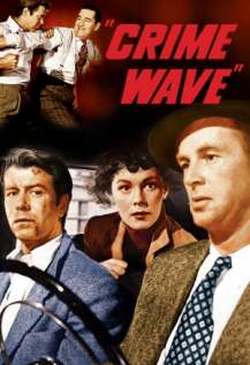
68. CRIME WAVE (1954)
Directed by Andre De Toth. Starring: Sterling Hayden, Gene Nelson
Sterling Hayden chews his way through a thousand toothpicks and André de Toth's brilliant direction featuring some of noir's finest location shooting (showing off 1952 Los Angeles) make this one stand out. The film opens with three brutal crooks (Ted de Corsia, Charles Buchinsky -- later changed to Bronson -- and Ned Young), just busted out of the big house, committing a gas station holdup during which they gun down a cop. Desperate, the killers make their way to the home of former jail buddy Steve Lacey (Gene Nelson), who is now married and trying to stay straight. Lacey's reluctantly caught in the middle, as tough-as-nails Police Lieutenant Sims puts the squeeze on him while the killers threaten his pretty wife, Ellen (Phyllis Kirk), promising to kill her if he doesn't help them in a bank heist. Timothy Carey -- one of the true oddballs of noir -- rounds out the cast, mugging his way through another part, but it's De Toth and cinematographer Bert Glennon's location camerawork that make this sing. ***1/2
Directed by Andre De Toth. Starring: Sterling Hayden, Gene Nelson
Sterling Hayden chews his way through a thousand toothpicks and André de Toth's brilliant direction featuring some of noir's finest location shooting (showing off 1952 Los Angeles) make this one stand out. The film opens with three brutal crooks (Ted de Corsia, Charles Buchinsky -- later changed to Bronson -- and Ned Young), just busted out of the big house, committing a gas station holdup during which they gun down a cop. Desperate, the killers make their way to the home of former jail buddy Steve Lacey (Gene Nelson), who is now married and trying to stay straight. Lacey's reluctantly caught in the middle, as tough-as-nails Police Lieutenant Sims puts the squeeze on him while the killers threaten his pretty wife, Ellen (Phyllis Kirk), promising to kill her if he doesn't help them in a bank heist. Timothy Carey -- one of the true oddballs of noir -- rounds out the cast, mugging his way through another part, but it's De Toth and cinematographer Bert Glennon's location camerawork that make this sing. ***1/2
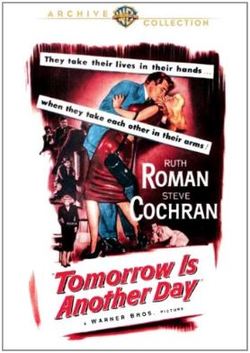
69. TOMORROW IS ANOTHER DAY (1951)
Directed by Felix E. Feist. Starring: Steve Cochran, Ruth Roman
Bill Clark (Steve Cochran) has spent 18 years behind bars. Still a young man upon his release, he's a newborn in a strange, fast, unforgiving world. He heads to New York for a fresh start, and immediately falls for dime-a-dance girl Catherine (Ruth Roman), but their budding romance is interrupted when Catherine's ex-boyfriend, a cop, shows up and is shot and killed during an altercation. The two have no alternative but to take it on the lam, so they head west, eventually falling in with a group of "Grapes of Wrath" farmers, and they begin a new life. Only this is noir, so the past is bound to catch up with them. A hard-as-nails road picture with what feels like a tacked on soft ending. ***1/2
Directed by Felix E. Feist. Starring: Steve Cochran, Ruth Roman
Bill Clark (Steve Cochran) has spent 18 years behind bars. Still a young man upon his release, he's a newborn in a strange, fast, unforgiving world. He heads to New York for a fresh start, and immediately falls for dime-a-dance girl Catherine (Ruth Roman), but their budding romance is interrupted when Catherine's ex-boyfriend, a cop, shows up and is shot and killed during an altercation. The two have no alternative but to take it on the lam, so they head west, eventually falling in with a group of "Grapes of Wrath" farmers, and they begin a new life. Only this is noir, so the past is bound to catch up with them. A hard-as-nails road picture with what feels like a tacked on soft ending. ***1/2
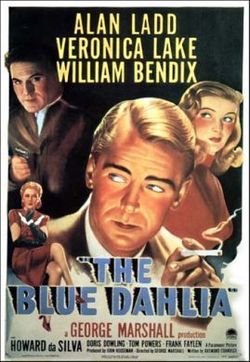
70. THE BLUE DAHLIA (1946)
Directed by George Marshall. Starring: Alan Ladd, Veronica Lake
Raymond Chandler scripted this atmospheric, hard-boiled noir about a Navy flier (Alan Ladd) who returns home from the war to find his wife has been unfaithful and contributed to the death of their small child by being drunk when he died. Ladd plays Jimmy Morrison, who argues with his drunken floozy of a wife (Doris Dowling) within minutes of his return from the war, packs a bag and flees out into the rain, where he is immediately picked up by Veronica Lake. Some guys have all the luck. Lake plays Joyce Harwood, who just happens to be the estranged wife of Eddie Harwood (Howard Da Silva), the shady nightclub owner who's been dallying with Helen, Jimmy's wife. When Helen ends up murdered, Jimmy becomes Suspect #1, which means, of course, that he must solve the case to clear his name. Hugh Beaumont and William Bendix are Jimmy's loyal Navy pals, George and Buzz, the latter carrying a metal plate in his head that causes him headaches, violent spells and fits of amnesia. Chandler's script is weakened by the fact that the Navy objected to war hero Buzz being the killer, as Chandler wrote it. Instead, the plot was changed, and the new ending -- featuring a surprise murderer -- feels off kilter. Still, this is a tough, superior noir, and Ladd and Lake have that chemistry thing. ***1/2
Directed by George Marshall. Starring: Alan Ladd, Veronica Lake
Raymond Chandler scripted this atmospheric, hard-boiled noir about a Navy flier (Alan Ladd) who returns home from the war to find his wife has been unfaithful and contributed to the death of their small child by being drunk when he died. Ladd plays Jimmy Morrison, who argues with his drunken floozy of a wife (Doris Dowling) within minutes of his return from the war, packs a bag and flees out into the rain, where he is immediately picked up by Veronica Lake. Some guys have all the luck. Lake plays Joyce Harwood, who just happens to be the estranged wife of Eddie Harwood (Howard Da Silva), the shady nightclub owner who's been dallying with Helen, Jimmy's wife. When Helen ends up murdered, Jimmy becomes Suspect #1, which means, of course, that he must solve the case to clear his name. Hugh Beaumont and William Bendix are Jimmy's loyal Navy pals, George and Buzz, the latter carrying a metal plate in his head that causes him headaches, violent spells and fits of amnesia. Chandler's script is weakened by the fact that the Navy objected to war hero Buzz being the killer, as Chandler wrote it. Instead, the plot was changed, and the new ending -- featuring a surprise murderer -- feels off kilter. Still, this is a tough, superior noir, and Ladd and Lake have that chemistry thing. ***1/2
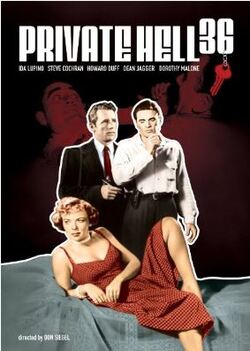
71. PRIVATE HELL 36 (1954)
Directed by Don Siegel. Starring: Steve Cochran, Howard Duff, Ida Lupino
Honest L.A. police detectives Cal Bruner (Steve Cochran) and Jack Farnham (Howard Duff) are partners and best friends, but they go bad one night when they decide to keep a pile of loot they find on a murdered counterfeiter, then are assigned by their police captain (Dean Jagger) to look for the missing cash. Things get worse when Bruner gets romantically involved with money-hungry nightclub singer Lili Marlowe (Ida Lupino, who also cowrote the script). Farnham then gets a dose of conscience and wants to turn the money in, but Bruner wants to keep it all. Well-written, and stylishly directed by Don Siegel, this is a nice little gem of a noir. ***1/2
Directed by Don Siegel. Starring: Steve Cochran, Howard Duff, Ida Lupino
Honest L.A. police detectives Cal Bruner (Steve Cochran) and Jack Farnham (Howard Duff) are partners and best friends, but they go bad one night when they decide to keep a pile of loot they find on a murdered counterfeiter, then are assigned by their police captain (Dean Jagger) to look for the missing cash. Things get worse when Bruner gets romantically involved with money-hungry nightclub singer Lili Marlowe (Ida Lupino, who also cowrote the script). Farnham then gets a dose of conscience and wants to turn the money in, but Bruner wants to keep it all. Well-written, and stylishly directed by Don Siegel, this is a nice little gem of a noir. ***1/2
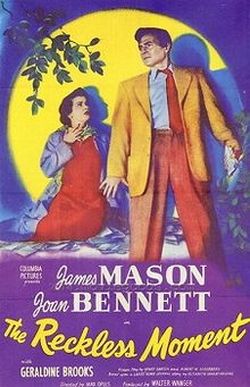
72. THE RECKLESS MOMENT (1949)
Directed by Max Ophuls. Starring: James Mason, Joan Bennett
California housewife Lucia Harper (Joan Bennett) attempts to cover up what she believes to be her daughter, Bea's (Geraldine Brooks), accidental killing of Darby, a slimy ex-lover. Martin Donnelly (James Mason), a smooth-talker involved in organized crime, shows up with a package of love letters from Bea to Darby, and blackmail on his mind. With her husband out of town and this being the 1940s, Lucia has no choice but to give in to his demands, and brings him along on a desperate quest to raise the money that takes them from bank to loan office to pawn shop. Along the way, Donnelly develops sympathy -- and perhaps more -- for Lucia, but when his ruthless boss shows up to pressure him into finishing the job, Donnelly makes a decision that sets up the film's startling climax. ***1/2
Directed by Max Ophuls. Starring: James Mason, Joan Bennett
California housewife Lucia Harper (Joan Bennett) attempts to cover up what she believes to be her daughter, Bea's (Geraldine Brooks), accidental killing of Darby, a slimy ex-lover. Martin Donnelly (James Mason), a smooth-talker involved in organized crime, shows up with a package of love letters from Bea to Darby, and blackmail on his mind. With her husband out of town and this being the 1940s, Lucia has no choice but to give in to his demands, and brings him along on a desperate quest to raise the money that takes them from bank to loan office to pawn shop. Along the way, Donnelly develops sympathy -- and perhaps more -- for Lucia, but when his ruthless boss shows up to pressure him into finishing the job, Donnelly makes a decision that sets up the film's startling climax. ***1/2
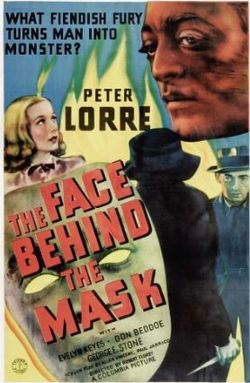
73. THE FACE BEHIND THE MASK (1941)
Directed by Robert Florey. Starring: Peter Lorre
Peter Lorre is outstanding in Robert Florey's nightmare vision of the American Dream gone horribly wrong. Lorre is Janos Szabo, an ebullient, eager Hungarian immigrant who arrives in New York with hardly a dime to his name, yet full of hopes and dreams. He's thrilled just to make a friend, have a roof over his head, and get a job washing dishes. A skilled watchmaker, he believes in himself and in the dream of America. Soon, he writes to his sweetheart back home, he'll be rich and will send for her. On his first night in his new country, though, his high-rise apartment building catches on fire, and Janos is horribly disfigured. His face has become that of a monster. In a moment, his entire life and everything he hoped for has gone up in flames. Now homeless, unable to find work due to his face -- or what's left of it -- he contemplates suicide, only to be stopped by Dinky (George E. Stone), a small-time thief who takes him under his wing. Soon, Janos is using his skilled hands not to make beautiful timepieces, but to disable alarms for a gang of thieves, of which he becomes the leader. He visits a plastic surgeon and has a mask of his former face made, and the gang's criminal exploits become famous. But when he meets Helen (Evelyn Keyes), a beautiful blind girl who only sees the good in him, Janos sees a way out. He falls in love with Helen, and announces he's leaving the gang, but the gang has other ideas. A sad and beautiful tragedy. ***1/2
Directed by Robert Florey. Starring: Peter Lorre
Peter Lorre is outstanding in Robert Florey's nightmare vision of the American Dream gone horribly wrong. Lorre is Janos Szabo, an ebullient, eager Hungarian immigrant who arrives in New York with hardly a dime to his name, yet full of hopes and dreams. He's thrilled just to make a friend, have a roof over his head, and get a job washing dishes. A skilled watchmaker, he believes in himself and in the dream of America. Soon, he writes to his sweetheart back home, he'll be rich and will send for her. On his first night in his new country, though, his high-rise apartment building catches on fire, and Janos is horribly disfigured. His face has become that of a monster. In a moment, his entire life and everything he hoped for has gone up in flames. Now homeless, unable to find work due to his face -- or what's left of it -- he contemplates suicide, only to be stopped by Dinky (George E. Stone), a small-time thief who takes him under his wing. Soon, Janos is using his skilled hands not to make beautiful timepieces, but to disable alarms for a gang of thieves, of which he becomes the leader. He visits a plastic surgeon and has a mask of his former face made, and the gang's criminal exploits become famous. But when he meets Helen (Evelyn Keyes), a beautiful blind girl who only sees the good in him, Janos sees a way out. He falls in love with Helen, and announces he's leaving the gang, but the gang has other ideas. A sad and beautiful tragedy. ***1/2
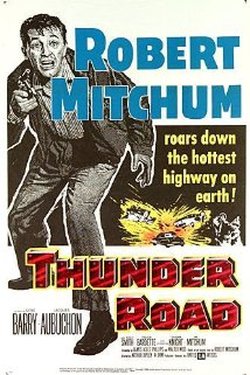
74. THUNDER ROAD (1958)
Directed by Arthur Ripley. Starring: Robert Mitchum, Gene Barry
Robert Mitchum is the pinnacle of cool in this hard-charging hillbilly noir about a Korean war vet running moonshine through the mountains of Kentucky and Tennessee in his souped-up hot rod. Mitchum produced, co-wrote the screenplay and stars as Lucas Doolin, who's keeping the family moonshine business going while dodging the feds ("revenooers") and outside gangsters, plus trying to keep little brother Robin (Mitchum's son, James!) from following in his footsteps and becoming a moonshine runner. All this while juggling two women, including a dreamy-voiced nightclub singer played by Keely Smith. Spectacular driving stunts roar throughout this film, which is more entertaining than any B-movie has a right to be. ***1/2
Directed by Arthur Ripley. Starring: Robert Mitchum, Gene Barry
Robert Mitchum is the pinnacle of cool in this hard-charging hillbilly noir about a Korean war vet running moonshine through the mountains of Kentucky and Tennessee in his souped-up hot rod. Mitchum produced, co-wrote the screenplay and stars as Lucas Doolin, who's keeping the family moonshine business going while dodging the feds ("revenooers") and outside gangsters, plus trying to keep little brother Robin (Mitchum's son, James!) from following in his footsteps and becoming a moonshine runner. All this while juggling two women, including a dreamy-voiced nightclub singer played by Keely Smith. Spectacular driving stunts roar throughout this film, which is more entertaining than any B-movie has a right to be. ***1/2
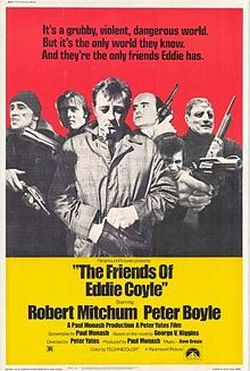
75. THE FRIENDS OF EDDIE COYLE (1973)
Directed by Peter Yates. Starring: Robert Mitchum, Peter Boyle
Robert Mitchum stars as Eddie Coyle (aka "Eddie Fingers"), an aging delivery truck driver/gun runner for the Boston mob. Eddie's facing a prison term for a truck hijacking set up by Dillon (Peter Boyle), who owns a local bar. Eddie's last chance to get a lighter sentence is ATF agent Dave Foley (Richard Jordan), who wants Eddie to become an informer. But, unbeknownst to Eddie, Dillon is an informer for Foley. Mitchum has perhaps never been better than he is playing the doomed Eddie Coyle, a man without a future in Peter Yates' excellent character study, adapted from the fantastic George V. Higgins novel. ***1/2
Directed by Peter Yates. Starring: Robert Mitchum, Peter Boyle
Robert Mitchum stars as Eddie Coyle (aka "Eddie Fingers"), an aging delivery truck driver/gun runner for the Boston mob. Eddie's facing a prison term for a truck hijacking set up by Dillon (Peter Boyle), who owns a local bar. Eddie's last chance to get a lighter sentence is ATF agent Dave Foley (Richard Jordan), who wants Eddie to become an informer. But, unbeknownst to Eddie, Dillon is an informer for Foley. Mitchum has perhaps never been better than he is playing the doomed Eddie Coyle, a man without a future in Peter Yates' excellent character study, adapted from the fantastic George V. Higgins novel. ***1/2
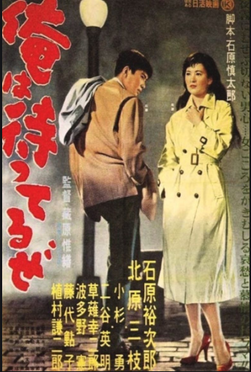
76. I AM WAITING (1957)
Directed by Koreyoshi Kurahara. Starring: Yujiro Ishihara, Mie Kitahara
Dreams die hard in this haunting Nikkatsu noir about hope, the loss of same, and redemption. On a rainy, lonely ol' night by the Yokohama piers, ex-boxer-turned restaurant manager Joji (baby-faced Yujiro Ishihara) saves Saeko (Mie Kitahara), a beautiful, forlorn "canary that's forgotten how to sing" from suicide. Next thing you know, Saeko's working and living in Joji's joint, and the two are falling for each other, but their dark pasts keep getting in the way. See, Joji killed a guy with his fists in a bar fight, and Saeko's on the run from her gangster boss who's forcing her to keep working for him, even though her singing voice is supposedly shot from illness. Oh yeah, and Joji is waiting to hear from his brother, who left for Brazil a year ago to buy a farm and was supposed to send for him. Koreyoshi Kurahara, in his directorial debut, uses expressionist lighting, creative flashback, and bold camerawork to create an atmospheric mystery that was one of Nikkatsu's earliest successes, and for good reason. ***1/2
Directed by Koreyoshi Kurahara. Starring: Yujiro Ishihara, Mie Kitahara
Dreams die hard in this haunting Nikkatsu noir about hope, the loss of same, and redemption. On a rainy, lonely ol' night by the Yokohama piers, ex-boxer-turned restaurant manager Joji (baby-faced Yujiro Ishihara) saves Saeko (Mie Kitahara), a beautiful, forlorn "canary that's forgotten how to sing" from suicide. Next thing you know, Saeko's working and living in Joji's joint, and the two are falling for each other, but their dark pasts keep getting in the way. See, Joji killed a guy with his fists in a bar fight, and Saeko's on the run from her gangster boss who's forcing her to keep working for him, even though her singing voice is supposedly shot from illness. Oh yeah, and Joji is waiting to hear from his brother, who left for Brazil a year ago to buy a farm and was supposed to send for him. Koreyoshi Kurahara, in his directorial debut, uses expressionist lighting, creative flashback, and bold camerawork to create an atmospheric mystery that was one of Nikkatsu's earliest successes, and for good reason. ***1/2
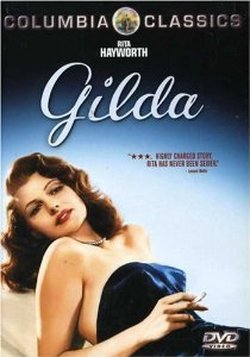
77. GILDA (1946)
Directed by Arthur Ripley. Starring: Rita Hayworth, Glenn Ford
Iconic Rita Hayworth performance still has the Wow! factor. Rita is the vampish Gilda, sultry ex-pat nightclub performer stranded in Buenos Aires, who marries shady casino owner Ballin Mundson (George Macready), who has just hired down-on-his luck gambler Johnny Farrell (Glenn Ford, in one of his more smoldering performances). Johnny and Gilda have a past, though, which ended badly, leading to a volcanic love-hate dynamic that threatens to blow the top off the whole sordid triangle. And it is a triangle, what with those barely disguised homoerotic discussions of Mundson's "little friend" -- a retractable switchblade hidden inside the tip of his cane. The film is beautifully lit (by Rudolph Mate) and designed (by Van Nest Polglase), and the story features the most prominent men's room attendant in noir. Sure, he's great at dispensing pearls of wisdom, but those urinal cakes aren't going to change themselves, Uncle Pio! ***1/2
Directed by Arthur Ripley. Starring: Rita Hayworth, Glenn Ford
Iconic Rita Hayworth performance still has the Wow! factor. Rita is the vampish Gilda, sultry ex-pat nightclub performer stranded in Buenos Aires, who marries shady casino owner Ballin Mundson (George Macready), who has just hired down-on-his luck gambler Johnny Farrell (Glenn Ford, in one of his more smoldering performances). Johnny and Gilda have a past, though, which ended badly, leading to a volcanic love-hate dynamic that threatens to blow the top off the whole sordid triangle. And it is a triangle, what with those barely disguised homoerotic discussions of Mundson's "little friend" -- a retractable switchblade hidden inside the tip of his cane. The film is beautifully lit (by Rudolph Mate) and designed (by Van Nest Polglase), and the story features the most prominent men's room attendant in noir. Sure, he's great at dispensing pearls of wisdom, but those urinal cakes aren't going to change themselves, Uncle Pio! ***1/2
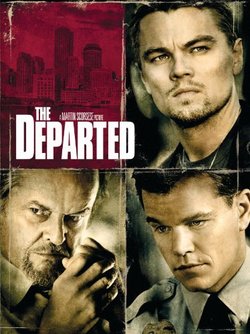
78. THE DEPARTED (2006)
Directed by Martin Scorsese. Starring: Jack Nicholson, Leonardo DiCaprio, Matt Damon
Martin Scorsese's explosive remake of the moody Hong Kong thriller Infernal Affairs features a powerhouse cast, a dynamite script, and a veritable van-load of intensity. Jack Nicholson (in full-blown over-the-top JACK! mode) stars as South Boston Irish mobster Frank Costello, who grooms clean-cut Colin Sullivan (Matt Damon) from childhood to join the Massachusetts State Police and be his mole inside the Special Investigations Unit, which is run by father-figure Captain Queenan (Martin Sheen) and his right-hand, Sgt. Dignam (Mark Wahlberg). Sullivan's mirror image is rookie cop Billy Costigan (Leonardo DiCaprio), who's spent his life running away from his troubled family, only to be forced, upon graduation from the trooper's academy, into going undercover and infiltrating Costello's mob. No one, besides Queenan and Dignan, even know that Costigan is a cop. As Sullivan works his way up the ranks of the SIU, alerting Costello to impending police operations at every turn, Costigan worms his way closer to the volatile Costello and his murderous henchman French (Ray Winstone), risking his life daily, and struggling with his isolation. Both bosses are aware they have "rats" in their respective nests, and seek to root them out. In the original, the two moles -- burrowing in opposite directions -- each have their own love interest, but in The Departed they are conflated into one -- idealistic police psychiatrist Dr. Madolyn Madden (Vera Farmiga). She is wooed by Sullivan and the two move in together, even as she begins to treat the ever-more vulnerable Costigan, and begins to fall for him. Scorsese and sreenwriter William Monahan follow closely the main plot lines from their labyrinthine source material, but make it their own with a script that is darkly and humorously obscene and much more bloody and intense than the original, not to mention nearly an hour longer. Critics were split over which version they preferred. For me, it's not even a question; while the original is very good, The Departed is the bigger and better film, more gritty, much more menacing, and without Chan Kwong-wing's sappy TV-movieish score. While this may merely be a product of cultural differences, for me The Departed is an instance in which the remake outshines the original. ***1/2
Directed by Martin Scorsese. Starring: Jack Nicholson, Leonardo DiCaprio, Matt Damon
Martin Scorsese's explosive remake of the moody Hong Kong thriller Infernal Affairs features a powerhouse cast, a dynamite script, and a veritable van-load of intensity. Jack Nicholson (in full-blown over-the-top JACK! mode) stars as South Boston Irish mobster Frank Costello, who grooms clean-cut Colin Sullivan (Matt Damon) from childhood to join the Massachusetts State Police and be his mole inside the Special Investigations Unit, which is run by father-figure Captain Queenan (Martin Sheen) and his right-hand, Sgt. Dignam (Mark Wahlberg). Sullivan's mirror image is rookie cop Billy Costigan (Leonardo DiCaprio), who's spent his life running away from his troubled family, only to be forced, upon graduation from the trooper's academy, into going undercover and infiltrating Costello's mob. No one, besides Queenan and Dignan, even know that Costigan is a cop. As Sullivan works his way up the ranks of the SIU, alerting Costello to impending police operations at every turn, Costigan worms his way closer to the volatile Costello and his murderous henchman French (Ray Winstone), risking his life daily, and struggling with his isolation. Both bosses are aware they have "rats" in their respective nests, and seek to root them out. In the original, the two moles -- burrowing in opposite directions -- each have their own love interest, but in The Departed they are conflated into one -- idealistic police psychiatrist Dr. Madolyn Madden (Vera Farmiga). She is wooed by Sullivan and the two move in together, even as she begins to treat the ever-more vulnerable Costigan, and begins to fall for him. Scorsese and sreenwriter William Monahan follow closely the main plot lines from their labyrinthine source material, but make it their own with a script that is darkly and humorously obscene and much more bloody and intense than the original, not to mention nearly an hour longer. Critics were split over which version they preferred. For me, it's not even a question; while the original is very good, The Departed is the bigger and better film, more gritty, much more menacing, and without Chan Kwong-wing's sappy TV-movieish score. While this may merely be a product of cultural differences, for me The Departed is an instance in which the remake outshines the original. ***1/2
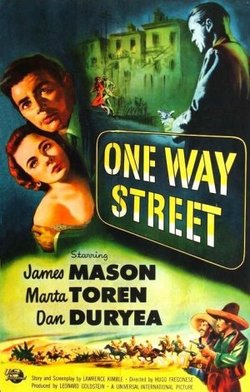
79. ONE WAY STREET (1950)
Directed by Hugo Fregonese. Starring: James Mason, Marta Toren, Dan Duryea
Starts with a bang, as, after a bank robbery, fatalistic mob doctor Frank Matson (James Mason) is summoned by mob boss John Wheeler (Dan Duryea) to treat one of his henchmen, Ollie (William Conrad), and brazenly steals the $200 grand they stole plus Wheeler's girlfriend, Laura (the luminous Marta Toren), who's in love with the doc. How does he do it, you ask? By giving Wheeler a couple of pills for his headache, and then telling him they're poison; he'll phone once they're safe and tell the gangster where to pick up the antidote. The couple flee to Mexico with the loot, where they eventually find an idyllic life, but Wheeler and Ollie are lurking. Matson and Laura return to Los Angeles to make a deal with Wheeler: Matson will return the money if he'll let the doc and Laura alone. But Wheeler, Ollie, and fate, have other plans. ***1/2
Directed by Hugo Fregonese. Starring: James Mason, Marta Toren, Dan Duryea
Starts with a bang, as, after a bank robbery, fatalistic mob doctor Frank Matson (James Mason) is summoned by mob boss John Wheeler (Dan Duryea) to treat one of his henchmen, Ollie (William Conrad), and brazenly steals the $200 grand they stole plus Wheeler's girlfriend, Laura (the luminous Marta Toren), who's in love with the doc. How does he do it, you ask? By giving Wheeler a couple of pills for his headache, and then telling him they're poison; he'll phone once they're safe and tell the gangster where to pick up the antidote. The couple flee to Mexico with the loot, where they eventually find an idyllic life, but Wheeler and Ollie are lurking. Matson and Laura return to Los Angeles to make a deal with Wheeler: Matson will return the money if he'll let the doc and Laura alone. But Wheeler, Ollie, and fate, have other plans. ***1/2
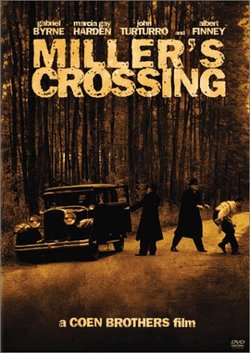
80. MILLER'S CROSSING (1990)
Directed by Joel and Ethan Coen. Starring: Gabriel Byrne, Albert Finney
The Coen Brothers' dark, moody and stylish paen to the gangster film of the 1930's and film noir of the 1940s is based on elements from two Dashiell Hammett novels: The Glass Key and Red Harvest. The Coens' typically complex plot unspools in an unnamed Eastern city in the 1930s, where dim but ambitious Italian gangster Johnny Caspar (Jon Polito) has a problem named Bernie Bernbaum (John Turturro). Caspar wants approval from the city’s Irish political boss, Leo (Albert Finney), to rub out the cause of his complaint, but Leo’s not giving in. He’s fallen in love with Bernie’s sister, Verna (Marcia Gay Harden), who wants Bernie protected. Leo’s cool, brainy aide-de-camp Tom (Gabriel Byrne) sees that Leo is making a big mistake, and it’s up to Tom to save him as his empire begins to crumble. The complication is that Tom also is in love with Verna, though he’s loath to admit it. Filled with brilliant performances by virtually the entire cast, this is a darkly humorous, bullet-riddled tommy gun burst of a movie. ***1/2
Directed by Joel and Ethan Coen. Starring: Gabriel Byrne, Albert Finney
The Coen Brothers' dark, moody and stylish paen to the gangster film of the 1930's and film noir of the 1940s is based on elements from two Dashiell Hammett novels: The Glass Key and Red Harvest. The Coens' typically complex plot unspools in an unnamed Eastern city in the 1930s, where dim but ambitious Italian gangster Johnny Caspar (Jon Polito) has a problem named Bernie Bernbaum (John Turturro). Caspar wants approval from the city’s Irish political boss, Leo (Albert Finney), to rub out the cause of his complaint, but Leo’s not giving in. He’s fallen in love with Bernie’s sister, Verna (Marcia Gay Harden), who wants Bernie protected. Leo’s cool, brainy aide-de-camp Tom (Gabriel Byrne) sees that Leo is making a big mistake, and it’s up to Tom to save him as his empire begins to crumble. The complication is that Tom also is in love with Verna, though he’s loath to admit it. Filled with brilliant performances by virtually the entire cast, this is a darkly humorous, bullet-riddled tommy gun burst of a movie. ***1/2
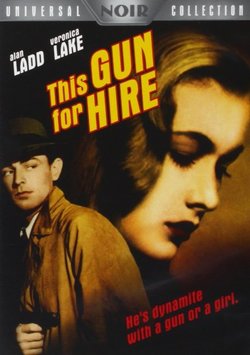
81. THIS GUN FOR HIRE (1942)
Directed by Frank Tuttle. Starring: Alan Ladd, Veronica Lake
Based on the 1936 novel by Graham Greene, this is a bit silly but wildly entertaining noir, with loads of chemistry between Alan Ladd’s hit man and Veronica Lake. Ladd plays Philip Raven, a near cypher, who appears to have no life other than his job, which is to assassinate people. When Raven is double-crossed by his latest employer, Willard Gates (Laird Cregar), he sets out to get revenge, meeting the sweetly innocent Ellen Graham (Lake) along the way. The film's climax during a gas attack drill is brilliantly and uniquely staged. This is the film that made Ladd (who received fourth billing) a star. ***1/2
Directed by Frank Tuttle. Starring: Alan Ladd, Veronica Lake
Based on the 1936 novel by Graham Greene, this is a bit silly but wildly entertaining noir, with loads of chemistry between Alan Ladd’s hit man and Veronica Lake. Ladd plays Philip Raven, a near cypher, who appears to have no life other than his job, which is to assassinate people. When Raven is double-crossed by his latest employer, Willard Gates (Laird Cregar), he sets out to get revenge, meeting the sweetly innocent Ellen Graham (Lake) along the way. The film's climax during a gas attack drill is brilliantly and uniquely staged. This is the film that made Ladd (who received fourth billing) a star. ***1/2
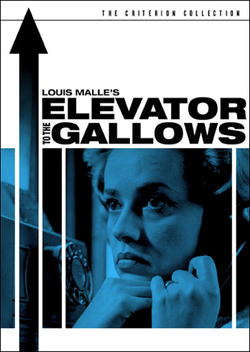
82. ELEVATOR TO THE GALLOWS (1958)
Directed by Louis Malle. Starring: Jeanne Moreau, Maurice Ronet
Florence Carala (Jeanne Moreau) and Julien Tavernier (Maurice Ronet) are illicit lovers who plan to kill Florence's husband, Simon, a wealthy industrialist who is also Julien's boss. Julien scales the outside of their office building on a rope shoots Simon in his office without being seen, and arranges the room to make it look like suicide. But he forgets to remove the rope, only remembering it when he sees it from the street as he is about to drive away and looks up. Leaving his car running, he rushes back into the building (now closed as it is past office hours), and begins ascending to his floor in the elevator, when the security guard -- not knowing anyone is still in the building -- switches off the power to the elevators, trapping Julien inside. Meanwhile, as Florence waits impatiently for her lover, a young criminal steals Julien's car and goes on a crime spree. It all comes together beautifully with a twist. Malle's directorial debut, which features a tense, jazzy score by Miles Davis, has a rich undercurrent of fatalistic noir irony. ***1/2
Directed by Louis Malle. Starring: Jeanne Moreau, Maurice Ronet
Florence Carala (Jeanne Moreau) and Julien Tavernier (Maurice Ronet) are illicit lovers who plan to kill Florence's husband, Simon, a wealthy industrialist who is also Julien's boss. Julien scales the outside of their office building on a rope shoots Simon in his office without being seen, and arranges the room to make it look like suicide. But he forgets to remove the rope, only remembering it when he sees it from the street as he is about to drive away and looks up. Leaving his car running, he rushes back into the building (now closed as it is past office hours), and begins ascending to his floor in the elevator, when the security guard -- not knowing anyone is still in the building -- switches off the power to the elevators, trapping Julien inside. Meanwhile, as Florence waits impatiently for her lover, a young criminal steals Julien's car and goes on a crime spree. It all comes together beautifully with a twist. Malle's directorial debut, which features a tense, jazzy score by Miles Davis, has a rich undercurrent of fatalistic noir irony. ***1/2
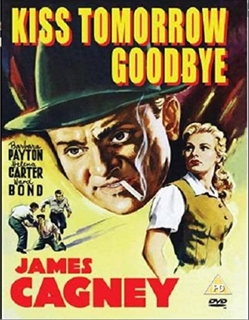
83. KISS TOMORROW GOODBYE (1950)
Directed by Gordon Douglas. Starring: James Cagney, Barbara Payton
Scorching James Cagney performance drives this brutal gangster tale based on the novel by Horace McCoy. Film was unfavorably compared to 1949's White Heat, which is too bad, because this is a terrific film in its own right. Everyone is corruptible and no one is trustworthy -- especially Cagney's mad dog killer Ralph Cotter, who busts his way out of a chain gang, gunning down his accomplice (Neville Brand) on the way. Then he woos his dead partner's sister (Barbara Payton, looking lovely shortly before the booze, fast living, and accompanying headlines sunk her career) -- if you can call blackmailing her and then beating her black and blue "wooing" -- and quickly gets back in the gangster business. Ralph and his gang hold up a supermarket and Ralph kills the owner, then manages to outwit crooked cops Ward Bond and Barton MacLane (who were tipped off by a crooked garage owner) when they try to shake him down. Are you getting the picture? Everyone is corruptible. Film was banned in Ohio upon its release. ***1/2
Directed by Gordon Douglas. Starring: James Cagney, Barbara Payton
Scorching James Cagney performance drives this brutal gangster tale based on the novel by Horace McCoy. Film was unfavorably compared to 1949's White Heat, which is too bad, because this is a terrific film in its own right. Everyone is corruptible and no one is trustworthy -- especially Cagney's mad dog killer Ralph Cotter, who busts his way out of a chain gang, gunning down his accomplice (Neville Brand) on the way. Then he woos his dead partner's sister (Barbara Payton, looking lovely shortly before the booze, fast living, and accompanying headlines sunk her career) -- if you can call blackmailing her and then beating her black and blue "wooing" -- and quickly gets back in the gangster business. Ralph and his gang hold up a supermarket and Ralph kills the owner, then manages to outwit crooked cops Ward Bond and Barton MacLane (who were tipped off by a crooked garage owner) when they try to shake him down. Are you getting the picture? Everyone is corruptible. Film was banned in Ohio upon its release. ***1/2
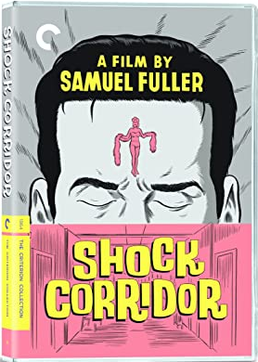
84. SHOCK CORRIDOR (1963)
Directed by Samuel Fuller. Starring: Peter Breck, Constance Towers
Surreal, big-mouthed film noir with a lot to say about the good ol' U.S. of A. from film's original excitable boy, Samuel Fuller. Fuller novices may find his work to be nothing more than lurid, unintentionally hilarious exploitation B-films. Under more careful scrutiny, however, Fuller's brilliant, subversive nature reveals itself, and the masterpiece emerges. This is especially true in the case of Shock Corridor, Fuller's 1963 missile launch against social injustice, racism, militarism, and sexual repression in post-war America.
Peter Breck (most recognizable as Barbara Stanwyck's hot-tempered middle son Nick Barkley in the 1960s TV western The Big Valley) plays Johnny Barrett, an ambitious reporter chasing fame in the form of a Pulitzer Prize, who has himself committed to a mental hospital to investigate a murder. To accomplish this, Johnny pretends to be possessed by crazed incestuous urges for his sister. To play the part of sis, he's recruited his girlfriend, Cathy (Constance Towers), a voluptuous exotic dancer who's very much in love with Johnny. Cathy is the only person in on the scheme who exhibits any reluctance or common sense about Johnny's plan, telling him, "You've got to be crazy! You want to be committed to an insane asylum to solve a murder!" Johnny's publisher and his psychiatrist pal -- who coaches him to appear insane -- are all gung-ho for the idea. But as Johnny closes in on the killer, insanity closes in on him, just as Cathy feared. Pretty soon, he's starting to believe that she really is his sister.
With its over-the-top performances and wildly stylized effects, there's no doubt that Shock Corridor ventures into the realm of pulp sensationalism. One of the most memorable scenes has Johnny wander accidentally into the women's Nymphomaniac ward. As he realizes where he is, he gasps, "Nymphos!" just before the hyper-excited females swarm him, wrestling him to the ground in a writhing sex attack.
But there's a lot more going on than just cheap thrills. Fuller, a former newspaperman and World War II vet who'd seen the madness of the world for himself when he helped liberate a German concentration camp, looked around the country he'd fought for and saw a nuthouse full of racists, warmongers, and citizens so repressed they'd driven themselves nearly mad trying to conform to postwar American ideals. Shock Corridor was the result, and it is a thundering pulp tour de force. ***1/2
Directed by Samuel Fuller. Starring: Peter Breck, Constance Towers
Surreal, big-mouthed film noir with a lot to say about the good ol' U.S. of A. from film's original excitable boy, Samuel Fuller. Fuller novices may find his work to be nothing more than lurid, unintentionally hilarious exploitation B-films. Under more careful scrutiny, however, Fuller's brilliant, subversive nature reveals itself, and the masterpiece emerges. This is especially true in the case of Shock Corridor, Fuller's 1963 missile launch against social injustice, racism, militarism, and sexual repression in post-war America.
Peter Breck (most recognizable as Barbara Stanwyck's hot-tempered middle son Nick Barkley in the 1960s TV western The Big Valley) plays Johnny Barrett, an ambitious reporter chasing fame in the form of a Pulitzer Prize, who has himself committed to a mental hospital to investigate a murder. To accomplish this, Johnny pretends to be possessed by crazed incestuous urges for his sister. To play the part of sis, he's recruited his girlfriend, Cathy (Constance Towers), a voluptuous exotic dancer who's very much in love with Johnny. Cathy is the only person in on the scheme who exhibits any reluctance or common sense about Johnny's plan, telling him, "You've got to be crazy! You want to be committed to an insane asylum to solve a murder!" Johnny's publisher and his psychiatrist pal -- who coaches him to appear insane -- are all gung-ho for the idea. But as Johnny closes in on the killer, insanity closes in on him, just as Cathy feared. Pretty soon, he's starting to believe that she really is his sister.
With its over-the-top performances and wildly stylized effects, there's no doubt that Shock Corridor ventures into the realm of pulp sensationalism. One of the most memorable scenes has Johnny wander accidentally into the women's Nymphomaniac ward. As he realizes where he is, he gasps, "Nymphos!" just before the hyper-excited females swarm him, wrestling him to the ground in a writhing sex attack.
But there's a lot more going on than just cheap thrills. Fuller, a former newspaperman and World War II vet who'd seen the madness of the world for himself when he helped liberate a German concentration camp, looked around the country he'd fought for and saw a nuthouse full of racists, warmongers, and citizens so repressed they'd driven themselves nearly mad trying to conform to postwar American ideals. Shock Corridor was the result, and it is a thundering pulp tour de force. ***1/2
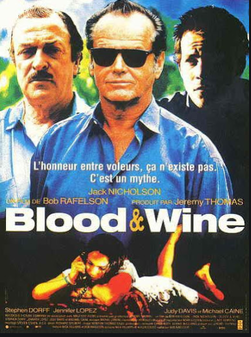
85. BLOOD & WINE (1996)
Directed by Bob Rafelson. Starring: Jack Nicholson, Michael Caine, Stephen Dorff, Judy Davis, Jennifer Lopez
Bob Rafelson's richly-textured crime film boasts a great cast doing great work inhabiting fully dimensional characters. Jack Nicholson and Michael Caine -- as jewel thieves Alex Gates and Vic Spansky -- are partners in a jewel heist that ends up going wrong. Nicholson's Gates is a Florida wine merchant whose business is going broke, whose marriage to his wife (Judy Davis) has gone sour, and whose step-son (Stephen Dorff) hates him. Caine's Vic is a tubercular ex-pat Brit whose life of crime has left him disappointed and broke. Together, they devise a plot to steal a million-dollar necklace from some rich folks, whose nanny (Jennifer Lopez) Gates is having an affair with. Things get very complicated, especially after the theft -- which Alex and Vic manage to pull off successfully. There is sudden violence and blood, and truly great performances by Nicholson and Caine, especially, with excellent work also turned in by everyone involved. ***1/2
Directed by Bob Rafelson. Starring: Jack Nicholson, Michael Caine, Stephen Dorff, Judy Davis, Jennifer Lopez
Bob Rafelson's richly-textured crime film boasts a great cast doing great work inhabiting fully dimensional characters. Jack Nicholson and Michael Caine -- as jewel thieves Alex Gates and Vic Spansky -- are partners in a jewel heist that ends up going wrong. Nicholson's Gates is a Florida wine merchant whose business is going broke, whose marriage to his wife (Judy Davis) has gone sour, and whose step-son (Stephen Dorff) hates him. Caine's Vic is a tubercular ex-pat Brit whose life of crime has left him disappointed and broke. Together, they devise a plot to steal a million-dollar necklace from some rich folks, whose nanny (Jennifer Lopez) Gates is having an affair with. Things get very complicated, especially after the theft -- which Alex and Vic manage to pull off successfully. There is sudden violence and blood, and truly great performances by Nicholson and Caine, especially, with excellent work also turned in by everyone involved. ***1/2
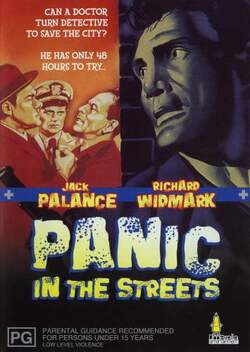
86. PANIC IN THE STREETS (1950)
Directed by Elia Kazan. Starring: Richard Widmark, Jack Palance
Elia Kazan's heart-pounding thriller, shot exclusively on location in New Orleans, features a great, twitchy performance by Jack Palance as Blackie, a gangster who is wanted for murder, and who also has the plague. Richard Widmark is Dr. Clinton Reed, a U.S. Public Health Service Lieutenant Commander on a desperate hunt to track him down in 48 hours before he causes an outbreak. Reed must also convince skeptical city officials -- including Police Captain Warren (Paul Douglas) -- that if they notify the press they will cause a panic. Very well acted, particularly by Widmark and Palance, who was making his film debut. ***1/2
Directed by Elia Kazan. Starring: Richard Widmark, Jack Palance
Elia Kazan's heart-pounding thriller, shot exclusively on location in New Orleans, features a great, twitchy performance by Jack Palance as Blackie, a gangster who is wanted for murder, and who also has the plague. Richard Widmark is Dr. Clinton Reed, a U.S. Public Health Service Lieutenant Commander on a desperate hunt to track him down in 48 hours before he causes an outbreak. Reed must also convince skeptical city officials -- including Police Captain Warren (Paul Douglas) -- that if they notify the press they will cause a panic. Very well acted, particularly by Widmark and Palance, who was making his film debut. ***1/2
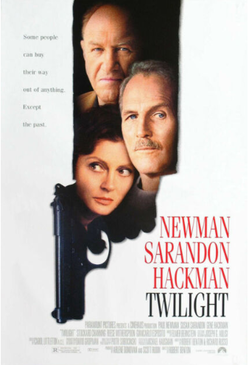
87. TWILIGHT (1998)
Directed by Robert Benton. Starring: Paul Newman, Susan Sarandon, Gene Hackman
Retired L.A. cop-turned-private eye Harry Ross (Paul Newman) is hired by aging movie stars Jack and Catherine Ames (Susan Sarandon and Gene Hackman) to find their wayward daughter, Mel, (Reese Witherspoon), who's run off to Mexico with a sleazy loser (Liev Schreiber). During a struggle, Harry takes a bullet in the upper thigh. The plot picks up two years later, with Harry living in the Ames' guest quarters. Jack is dying of cancer, and keeps Harry around to pass the time playing cards and run errands. Then Jack asks Harry to do him a favor -- deliver a package to an address in Los Angeles -- which embroils Harry in a 20-year-old case involving the disappearance of Catherine's first husband. The stellar cast is rounded out by James Garner, Swoosie Kurtz, M. Emmet Walsh, Giancarlo Esposito, and Margo Martindale in this subdued mystery co-written by Richard Russo. Excellent. ***1/2
Directed by Robert Benton. Starring: Paul Newman, Susan Sarandon, Gene Hackman
Retired L.A. cop-turned-private eye Harry Ross (Paul Newman) is hired by aging movie stars Jack and Catherine Ames (Susan Sarandon and Gene Hackman) to find their wayward daughter, Mel, (Reese Witherspoon), who's run off to Mexico with a sleazy loser (Liev Schreiber). During a struggle, Harry takes a bullet in the upper thigh. The plot picks up two years later, with Harry living in the Ames' guest quarters. Jack is dying of cancer, and keeps Harry around to pass the time playing cards and run errands. Then Jack asks Harry to do him a favor -- deliver a package to an address in Los Angeles -- which embroils Harry in a 20-year-old case involving the disappearance of Catherine's first husband. The stellar cast is rounded out by James Garner, Swoosie Kurtz, M. Emmet Walsh, Giancarlo Esposito, and Margo Martindale in this subdued mystery co-written by Richard Russo. Excellent. ***1/2
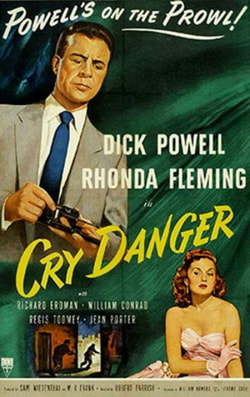
88. CRY DANGER (1951)
Directed by Robert Parrish. Starring: Dick Powell, Rhonda Fleming
Dick Powell continued his transformation from 30s laughing boy crooner to tough noir guy and is great, as usual. He plays Rocky Mulloy, fresh from serving five years of a life sentence for robbery and murder. He’s been sprung by a disabled marine, who figures if he clears Rocky with a false alibi, the grateful ex-con will split the loot from his robbery with him. Rocky keeps telling everyone he’s innocent, but no one believes him. But Rocky knows who pulled the job: his best friend, Danny, who was also found guilty of the crime and is still in prison. Rocky, out to find the missing loot, moves into the trailer park where Danny’s fetching wife, Nancy (Rhonda Fleming), lives. William Conrad adds heft as a sleazy gangster. Satisfying noir actioner, elevated by the ever smooth and eminently watchable Powell, as well as the nearly edible Fleming as the, er, flemme fatale. ***
Directed by Robert Parrish. Starring: Dick Powell, Rhonda Fleming
Dick Powell continued his transformation from 30s laughing boy crooner to tough noir guy and is great, as usual. He plays Rocky Mulloy, fresh from serving five years of a life sentence for robbery and murder. He’s been sprung by a disabled marine, who figures if he clears Rocky with a false alibi, the grateful ex-con will split the loot from his robbery with him. Rocky keeps telling everyone he’s innocent, but no one believes him. But Rocky knows who pulled the job: his best friend, Danny, who was also found guilty of the crime and is still in prison. Rocky, out to find the missing loot, moves into the trailer park where Danny’s fetching wife, Nancy (Rhonda Fleming), lives. William Conrad adds heft as a sleazy gangster. Satisfying noir actioner, elevated by the ever smooth and eminently watchable Powell, as well as the nearly edible Fleming as the, er, flemme fatale. ***
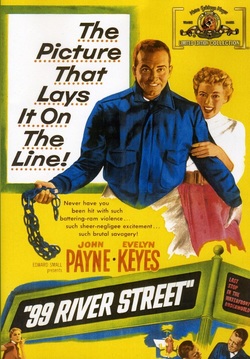
89. 99 RIVER STREET (1953)
Directed by Phil Karlson. Starring: John Payne, Evelyn Keyes
Action-packed pulp-noir starring John Payne as Ernie Driscoll, ex-pug-turned-cabbie who is framed for the murder of his cheating wife (Peggie Castle). Evelyn Keyes is the perky actress who stands by Ernie as he tracks down the real killer, a slimy and menacing jewel thief played by Victor Rawlins. Bursting with noir atmosphere, plot twists and hard-punching fight scenes, this one's a load of fun. ***
Directed by Phil Karlson. Starring: John Payne, Evelyn Keyes
Action-packed pulp-noir starring John Payne as Ernie Driscoll, ex-pug-turned-cabbie who is framed for the murder of his cheating wife (Peggie Castle). Evelyn Keyes is the perky actress who stands by Ernie as he tracks down the real killer, a slimy and menacing jewel thief played by Victor Rawlins. Bursting with noir atmosphere, plot twists and hard-punching fight scenes, this one's a load of fun. ***
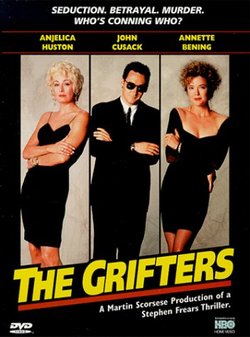
90. THE GRIFTERS (1990)
Directed by Stephen Frears. Starring: John Cusack, Anjelica Huston, Annette Bening
Stephen Frears' excellent adaptation -- written by Donald Westlake -- of the Jim Thompson pulp novel. Anjelica Huston is stunning as veteran con artist Lily Dillon, who works for brutal bookmaker Bobo Justus (Pat Hingle), making large cash bets at race tracks to lower the odds of longshots. John Cusack is her estranged son, Roy, a small-time Los Angeles grifter, who is dating Myra Langtry (Annette Bening in her star-making performance), who used to play long cons with her partner, Cole, rooking wealthy marks in business cons. But Cole went nuts, leaving Lily dangling, going to bed with her landlord to pay the rent. Lily's looking for a replacement for Cole, and she thinks Roy could be the one. But Lily and Myra take an instant disliking to each other, and when Myra accuses Roy of having an incestuous interest in his mother, Roy strikes her, and the couple break up. When Myra finds out that Lily has been stealing from Bobo for years, stashing her siphoned loot in the trunk of her car, she blabs the news, sending Lily on the run, with Myra following. Myra catches up to Lily late one night at a quiet desert motel, and the result is explosive, as is the climactic scene involving Roy and, well, you'll just have to see it. ***
Directed by Stephen Frears. Starring: John Cusack, Anjelica Huston, Annette Bening
Stephen Frears' excellent adaptation -- written by Donald Westlake -- of the Jim Thompson pulp novel. Anjelica Huston is stunning as veteran con artist Lily Dillon, who works for brutal bookmaker Bobo Justus (Pat Hingle), making large cash bets at race tracks to lower the odds of longshots. John Cusack is her estranged son, Roy, a small-time Los Angeles grifter, who is dating Myra Langtry (Annette Bening in her star-making performance), who used to play long cons with her partner, Cole, rooking wealthy marks in business cons. But Cole went nuts, leaving Lily dangling, going to bed with her landlord to pay the rent. Lily's looking for a replacement for Cole, and she thinks Roy could be the one. But Lily and Myra take an instant disliking to each other, and when Myra accuses Roy of having an incestuous interest in his mother, Roy strikes her, and the couple break up. When Myra finds out that Lily has been stealing from Bobo for years, stashing her siphoned loot in the trunk of her car, she blabs the news, sending Lily on the run, with Myra following. Myra catches up to Lily late one night at a quiet desert motel, and the result is explosive, as is the climactic scene involving Roy and, well, you'll just have to see it. ***
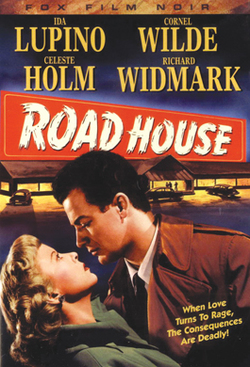
91. ROAD HOUSE (1948)
Directed by Jean Negulesco. Starring: Ida Lupino, Cornel Wilde, Richard Widmark
Ida Lupino as the smoldering chanteuse Lily Stevens elevates this potboiler, set in a Midwestern road house, complete with bowling alley. Richard Widmark is Jefty, the owner of the joint who's crazy about Lily, but when Lily chooses Jefty's boyhood chum Pete (Cornell Wilde) instead, Jefty goes nuts, as noir characters played by Widmark are wont to do. Lupino, proving she could do it all, torches the joint when she sings the Johnny Mercer classic "One For My Baby (and One More For the Road)." ***
Directed by Jean Negulesco. Starring: Ida Lupino, Cornel Wilde, Richard Widmark
Ida Lupino as the smoldering chanteuse Lily Stevens elevates this potboiler, set in a Midwestern road house, complete with bowling alley. Richard Widmark is Jefty, the owner of the joint who's crazy about Lily, but when Lily chooses Jefty's boyhood chum Pete (Cornell Wilde) instead, Jefty goes nuts, as noir characters played by Widmark are wont to do. Lupino, proving she could do it all, torches the joint when she sings the Johnny Mercer classic "One For My Baby (and One More For the Road)." ***
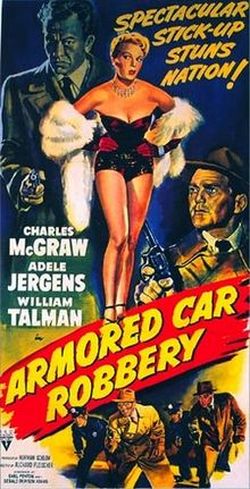
92. ARMORED CAR ROBBERY (1950)
Directed by Richard Fleischer. Starring: Charles McGraw, William Talman
Noir stalwarts Charles McGraw and William Talman deliver the goods in this solid, no-nonsense heist film. Talman is tough crook Dave Purvus, who hatches a plot to rob an armored car at Wrigley Field in Los Angeles (yes, there used to be one in LA, too) and escape with more than just the loot. He’s been sneaking around on the sly with greedy burlesque queen Yvonne LeDoux, who just happens to be the estranged wife of one of his crew, Benny McBride, who’s still in love with the no-good dame. The heist turns into a shootout in the streets when hardnosed police detective Jim Cordell and his partner respond to the call. Cordell’s partner is killed. Dragnets and roadblocks ensue, and the remaining gang have to hole up in a hideout by the docks. More shootouts, a motorboat, and some lipstick get involved in the plot, until it all comes to a satisfying touchdown beneath the wheels of a landing plane. ***
Directed by Richard Fleischer. Starring: Charles McGraw, William Talman
Noir stalwarts Charles McGraw and William Talman deliver the goods in this solid, no-nonsense heist film. Talman is tough crook Dave Purvus, who hatches a plot to rob an armored car at Wrigley Field in Los Angeles (yes, there used to be one in LA, too) and escape with more than just the loot. He’s been sneaking around on the sly with greedy burlesque queen Yvonne LeDoux, who just happens to be the estranged wife of one of his crew, Benny McBride, who’s still in love with the no-good dame. The heist turns into a shootout in the streets when hardnosed police detective Jim Cordell and his partner respond to the call. Cordell’s partner is killed. Dragnets and roadblocks ensue, and the remaining gang have to hole up in a hideout by the docks. More shootouts, a motorboat, and some lipstick get involved in the plot, until it all comes to a satisfying touchdown beneath the wheels of a landing plane. ***
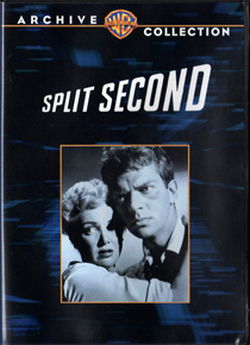
93. SPLIT SECOND (1953)
Directed by Dick Powell. Starring: Stephan McNally
Dick Powell, in his directorial debut, gives us a tense noir about a desperate killer on the run in the Nevada desert. Sam Hurley (Stephan McNally) busts out of the big house with his buddy, Bart (Paul Kelly), who gets gutshot during the escape. The two meet up with a mute accomplice, "Dummy," take several hostages, and hole up in an abandoned mining town while they wait for a doctor to arrive and patch Bart up. The catch: the ghost town is ground zero for an A-bomb test, scheduled to go off in a few hours! The script nearly careens into melodrama, with various hostages falling in love, divorcing, or shamelessly throwing themselves at Hurley in a desperate attempt to save themselves, but Powell keeps things humming along as the clock ticks down to a nice, atomic twist at the end, with a mushroom cloud on top. ***
Directed by Dick Powell. Starring: Stephan McNally
Dick Powell, in his directorial debut, gives us a tense noir about a desperate killer on the run in the Nevada desert. Sam Hurley (Stephan McNally) busts out of the big house with his buddy, Bart (Paul Kelly), who gets gutshot during the escape. The two meet up with a mute accomplice, "Dummy," take several hostages, and hole up in an abandoned mining town while they wait for a doctor to arrive and patch Bart up. The catch: the ghost town is ground zero for an A-bomb test, scheduled to go off in a few hours! The script nearly careens into melodrama, with various hostages falling in love, divorcing, or shamelessly throwing themselves at Hurley in a desperate attempt to save themselves, but Powell keeps things humming along as the clock ticks down to a nice, atomic twist at the end, with a mushroom cloud on top. ***
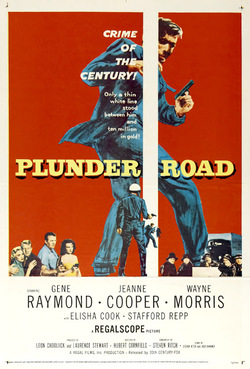
94. PLUNDER ROAD (1957)
Directed by Hubert Cornfield. Starring: Gene Raymond, Elisha Cook Jr.
Low budget noir about a gang that robs a San Francisco-bound train of $10 million in gold, then loads their loot in three different trucks heading in different directions. The plan is to get to L.A., then melt the gold and put it into the bumpers and chrome of their getaway cars. Of course, this being noir, it all fails spectacularly. A sleeper of a heist film with a kicker of an ending. ***
Directed by Hubert Cornfield. Starring: Gene Raymond, Elisha Cook Jr.
Low budget noir about a gang that robs a San Francisco-bound train of $10 million in gold, then loads their loot in three different trucks heading in different directions. The plan is to get to L.A., then melt the gold and put it into the bumpers and chrome of their getaway cars. Of course, this being noir, it all fails spectacularly. A sleeper of a heist film with a kicker of an ending. ***
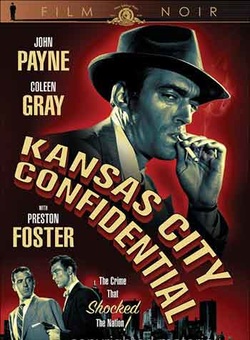
95. KANSAS CITY CONFIDENTIAL (1952)
Directed by Phil Karlson. Starring: John Payne, Coleen Gray
Imaginative, bare-knuckled tale of an ex-con (John Payne), an ex-war hero whose medals won't buy him a cup of coffee, who gets framed for a bank robbery and must solve the case himself to clear his name. Payne continued his reinvention from light romantic lead to two-fisted tough guy in noirs and westerns with a straight-forward performance as Joe Rolfe, a hard-luck delivery driver determined to clear his name. The imaginative part comes in the crime's set-up, which Quentin Tarantino borrowed liberally from for Reservoir Dogs. An embittered former police captain recruits a veritable who's-who of 50s and 60s heavies (Jack Elam, Neville Brand, Lee Van Cleef) to knock off an armored car as it picks up the loot from a bank. The catch: all the crooks wear masks from the first time they meet, so they won't be able to rat each other out later. Phil Karlson's direction eschews standard noir flourishes and focuses instead on the characters' sweaty faces. According to Karlson, he and Payne dreamt up the story one night while "loaded on Scotch." One of the better heist noirs. ***
Directed by Phil Karlson. Starring: John Payne, Coleen Gray
Imaginative, bare-knuckled tale of an ex-con (John Payne), an ex-war hero whose medals won't buy him a cup of coffee, who gets framed for a bank robbery and must solve the case himself to clear his name. Payne continued his reinvention from light romantic lead to two-fisted tough guy in noirs and westerns with a straight-forward performance as Joe Rolfe, a hard-luck delivery driver determined to clear his name. The imaginative part comes in the crime's set-up, which Quentin Tarantino borrowed liberally from for Reservoir Dogs. An embittered former police captain recruits a veritable who's-who of 50s and 60s heavies (Jack Elam, Neville Brand, Lee Van Cleef) to knock off an armored car as it picks up the loot from a bank. The catch: all the crooks wear masks from the first time they meet, so they won't be able to rat each other out later. Phil Karlson's direction eschews standard noir flourishes and focuses instead on the characters' sweaty faces. According to Karlson, he and Payne dreamt up the story one night while "loaded on Scotch." One of the better heist noirs. ***
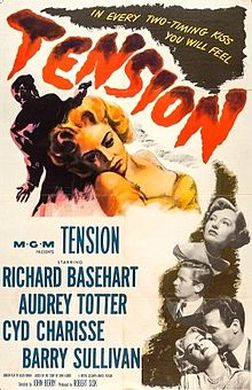
96. TENSION (1949)
Directed by John Berry. Starring: Richard Basehart, Audrey Totter, Cyd Charise
Police lieutenant Collier Bonnabel (Barry Sullivan) of the Homicide squad explains that he only knows one way to solve a case: by applying pressure to all the suspects until one of them snaps under the tension. To illustrate, he cites a murder case involving bespectacled milquetoast Warren Quimby (Richard Basehart). The story is told in flashback. Quimby is night manager of a drugstore in Culver City, and married to Claire, a floozy played by Audrey Totter. When Claire leaves Quimby for her latest conquest, Barney Deager, a rich beach bum, Quimby tries to get her back but is beaten up and humiliated by Deager, so he decides to get even by killing him. Quimby rents an apartment under a fake identity to carry out his goofy plan, but complications ensue when he meets his fetching new neighbor, Mary (Cyd Charisse), while using his new identity. While much of this never rises to the level of believable, it's still a good example of noirish post-war disillusionment. ***
Directed by John Berry. Starring: Richard Basehart, Audrey Totter, Cyd Charise
Police lieutenant Collier Bonnabel (Barry Sullivan) of the Homicide squad explains that he only knows one way to solve a case: by applying pressure to all the suspects until one of them snaps under the tension. To illustrate, he cites a murder case involving bespectacled milquetoast Warren Quimby (Richard Basehart). The story is told in flashback. Quimby is night manager of a drugstore in Culver City, and married to Claire, a floozy played by Audrey Totter. When Claire leaves Quimby for her latest conquest, Barney Deager, a rich beach bum, Quimby tries to get her back but is beaten up and humiliated by Deager, so he decides to get even by killing him. Quimby rents an apartment under a fake identity to carry out his goofy plan, but complications ensue when he meets his fetching new neighbor, Mary (Cyd Charisse), while using his new identity. While much of this never rises to the level of believable, it's still a good example of noirish post-war disillusionment. ***
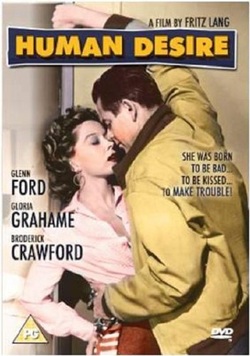
97. HUMAN DESIRE (1954)
Directed by Fritz Lang. Starring: Glenn Ford, Gloria Grahame, Broderick Crawford
Fritz Lang's follow-up to 1953's The Big Heat (which also starred Glenn Ford and Gloria Grahame) is this remake of Jean Renoir's La Bete Humaine (based on Zola's novel), and it's as cold and dark as any of his work. Here, Broderick Crawford plays brutish railroad supervisor Carl Buckley, who gets fired from his job, then persuades his sexy wife Vicki (Grahame) to plead with rich, old magnate John Owens for her hubby's job. But when the hot-tempered Carl suspects Vicki of going too far with Owens, he smacks her around, then jealously stabs Owens to death in a train compartment. Into this melodrama comes locomotive engineer/Korean War vet Jeff Warren (Ford), who spots Vicki in the vicinity of the murder, but shields her at the inquest. Soon, the two are having a steamy affair, and Vicki is scheming to have Jeff kill the increasingly violent and unstable Carl. Another excellent, highly polished example of Lang's craft. ***
Directed by Fritz Lang. Starring: Glenn Ford, Gloria Grahame, Broderick Crawford
Fritz Lang's follow-up to 1953's The Big Heat (which also starred Glenn Ford and Gloria Grahame) is this remake of Jean Renoir's La Bete Humaine (based on Zola's novel), and it's as cold and dark as any of his work. Here, Broderick Crawford plays brutish railroad supervisor Carl Buckley, who gets fired from his job, then persuades his sexy wife Vicki (Grahame) to plead with rich, old magnate John Owens for her hubby's job. But when the hot-tempered Carl suspects Vicki of going too far with Owens, he smacks her around, then jealously stabs Owens to death in a train compartment. Into this melodrama comes locomotive engineer/Korean War vet Jeff Warren (Ford), who spots Vicki in the vicinity of the murder, but shields her at the inquest. Soon, the two are having a steamy affair, and Vicki is scheming to have Jeff kill the increasingly violent and unstable Carl. Another excellent, highly polished example of Lang's craft. ***
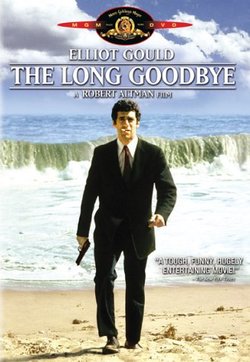
98. THE LONG GOODBYE (1973)
Directed by Robert Altman. Starring: Elliot Gould, Jim Bouton
Robert Altman's revisioning of Raymond Chandler's novel -- and the private eye genre in general -- is either a meandering mess and a nose-thumb at the idea of Chandler's Marlowe, or a brilliant work of genius and originality, depending on your point of view. Despite (or perhaps because of) Elliott Gould's virtuoso performance as Chandler's knight-detective Philip Marlowe -- recreated here as a rumpled, incongruous man woefully out of place in modern society -- I tend to fall into both camps at the same time, if that's possible. Sure, it's fun to see Altman pushing against the conventions of the detective story, and Gould is absolutely brilliant as this mumbling, bumbling version of Marlowe (whose most prized possession -- in a world where everyone else is dressed in '70s beach attire -- is his tie), but the movie founders on some of the choices Altman made to drastically change the story from Chandler's original novel, most notably the ending, which flies in the face of Marlowe's core. Still, this is a beautiful, even haunting work, tinged with a melancholia that captures the soul of Marlowe perhaps better than any other Chandler adaptation has -- at least up until that ending. Some odd casting features ex-big league pitcher-turned author Jim Bouton as Terry Lennox, and watch for a young Arnold Schwarzenegger (as if you could miss him) in a minor, uncredited role. ***1/2
Directed by Robert Altman. Starring: Elliot Gould, Jim Bouton
Robert Altman's revisioning of Raymond Chandler's novel -- and the private eye genre in general -- is either a meandering mess and a nose-thumb at the idea of Chandler's Marlowe, or a brilliant work of genius and originality, depending on your point of view. Despite (or perhaps because of) Elliott Gould's virtuoso performance as Chandler's knight-detective Philip Marlowe -- recreated here as a rumpled, incongruous man woefully out of place in modern society -- I tend to fall into both camps at the same time, if that's possible. Sure, it's fun to see Altman pushing against the conventions of the detective story, and Gould is absolutely brilliant as this mumbling, bumbling version of Marlowe (whose most prized possession -- in a world where everyone else is dressed in '70s beach attire -- is his tie), but the movie founders on some of the choices Altman made to drastically change the story from Chandler's original novel, most notably the ending, which flies in the face of Marlowe's core. Still, this is a beautiful, even haunting work, tinged with a melancholia that captures the soul of Marlowe perhaps better than any other Chandler adaptation has -- at least up until that ending. Some odd casting features ex-big league pitcher-turned author Jim Bouton as Terry Lennox, and watch for a young Arnold Schwarzenegger (as if you could miss him) in a minor, uncredited role. ***1/2
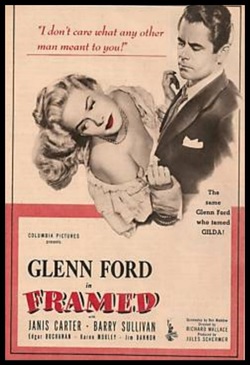
99. FRAMED (1947)
Directed by Richard Wallace. Starring: Glenn Ford, Janis Carter, Barry Sullivan
Superior low-budget noir that starts with a bang when the truck Glenn Ford is driving loses its brakes. He ends up crashed out and broke in a small western town, but his bad luck is just beginning. It turns to poison in the beautiful form of femme fatale Janis Carter, who is arsenic in a pretty package. Standard plot unfolds from there, but good performances -- especially from Carter -- and atmospheric location photography help this potboiler rise above its story, low budget and production values. ***
Directed by Richard Wallace. Starring: Glenn Ford, Janis Carter, Barry Sullivan
Superior low-budget noir that starts with a bang when the truck Glenn Ford is driving loses its brakes. He ends up crashed out and broke in a small western town, but his bad luck is just beginning. It turns to poison in the beautiful form of femme fatale Janis Carter, who is arsenic in a pretty package. Standard plot unfolds from there, but good performances -- especially from Carter -- and atmospheric location photography help this potboiler rise above its story, low budget and production values. ***
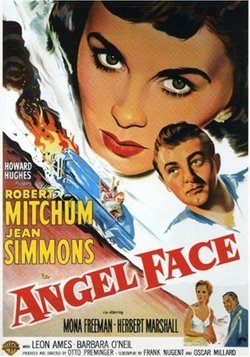
100. ANGEL FACE (1953)
Directed by Otto Preminger. Starring: Robert Mitchum, Jean Simmons
Disturbingly cool tale of passion and murder, with Robert Mitchum as languid ambulance driver Frank Jessup, whose real passion is fixing up and racing hot cars. Frank is in a wholesome, 1950s romance with wholesome nurse Mary (Mona Freeman), until he arrives at the Tremayne mansion, where the second wife of author Herbert Marshall has been affected by gas poisoning. Frank meets Tremayne's daughter, Diane (Jean Simmons), who may or may not be a homicidal maniac, albeit a very pretty one. From that point on, Frank is as doomed as any character in noir. The film plummets toward its inevitable finish, which is as audacious an ending as you're likely to see. Though the story feels, at times, a bit like a rehash of The Postman Always Rings Twice, it is brilliantly executed by Preminger and well acted by all. ***
Directed by Otto Preminger. Starring: Robert Mitchum, Jean Simmons
Disturbingly cool tale of passion and murder, with Robert Mitchum as languid ambulance driver Frank Jessup, whose real passion is fixing up and racing hot cars. Frank is in a wholesome, 1950s romance with wholesome nurse Mary (Mona Freeman), until he arrives at the Tremayne mansion, where the second wife of author Herbert Marshall has been affected by gas poisoning. Frank meets Tremayne's daughter, Diane (Jean Simmons), who may or may not be a homicidal maniac, albeit a very pretty one. From that point on, Frank is as doomed as any character in noir. The film plummets toward its inevitable finish, which is as audacious an ending as you're likely to see. Though the story feels, at times, a bit like a rehash of The Postman Always Rings Twice, it is brilliantly executed by Preminger and well acted by all. ***
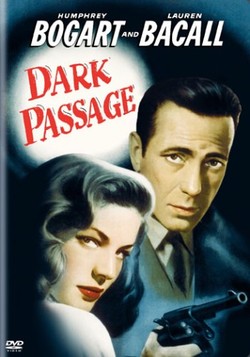
101. DARK PASSAGE (1947)
Directed by Delmer Daves. Starring: Humphrey Bogart, Lauren Bacall
Delmer Daves' use of a subjective camera angle for the first half of this Bogie and Bacall vehicle works better than when it was employed a year earlier by Robert Montgomery in Lady in the Lake. Sometimes far-fetched tale follows fugitive Bogart -- busted out of San Quentin after being framed for his wife's murder -- as he searches San Francisco for the real killer. Script has Bogie almost inexplicably aided by first Bacall, and then a good-hearted cabbie, despite the fact that he's a convicted murderer and fugitive from the law. Agnes Moorhead provides a memorable turn as the harpy from hell. ***
Directed by Delmer Daves. Starring: Humphrey Bogart, Lauren Bacall
Delmer Daves' use of a subjective camera angle for the first half of this Bogie and Bacall vehicle works better than when it was employed a year earlier by Robert Montgomery in Lady in the Lake. Sometimes far-fetched tale follows fugitive Bogart -- busted out of San Quentin after being framed for his wife's murder -- as he searches San Francisco for the real killer. Script has Bogie almost inexplicably aided by first Bacall, and then a good-hearted cabbie, despite the fact that he's a convicted murderer and fugitive from the law. Agnes Moorhead provides a memorable turn as the harpy from hell. ***
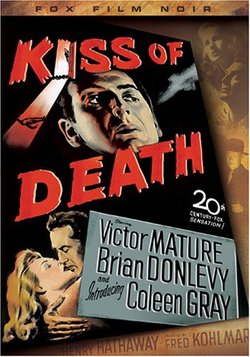
102. KISS OF DEATH (1947)
Directed by Henry Hathaway. Starring: Victor Mature, Coleen Gray, Richard Widmark
Touching, tense drama featuring Victor Mature as an ex-con trying to go straight. Richard Widmark turns in one of his signature giggling psycho performances in his breakout role as bad guy Tommy Udo, who famously delights in pushing a little old lady in a wheelchair down a flight of stairs. Shot on location throughout Manhattan. ***
Directed by Henry Hathaway. Starring: Victor Mature, Coleen Gray, Richard Widmark
Touching, tense drama featuring Victor Mature as an ex-con trying to go straight. Richard Widmark turns in one of his signature giggling psycho performances in his breakout role as bad guy Tommy Udo, who famously delights in pushing a little old lady in a wheelchair down a flight of stairs. Shot on location throughout Manhattan. ***
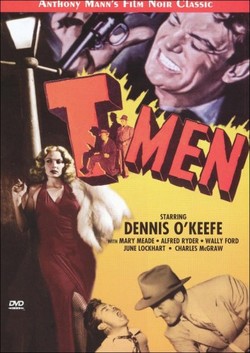
103. T-MEN (1947)
Directed by Anthony Mann. Starring: Dennis O'Keefe, Charles McGraw
Semidocumentary procedural about treasury agents going undercover to crack a counterfeit ring. Shot on location in Detroit and Los Angeles by famed noir cinematographer John Alton, whose brilliant camerawork gives this film a gritty, realistic feel. Charles McGraw wants to know, “Are you getting the whim-whams?” ***
Directed by Anthony Mann. Starring: Dennis O'Keefe, Charles McGraw
Semidocumentary procedural about treasury agents going undercover to crack a counterfeit ring. Shot on location in Detroit and Los Angeles by famed noir cinematographer John Alton, whose brilliant camerawork gives this film a gritty, realistic feel. Charles McGraw wants to know, “Are you getting the whim-whams?” ***
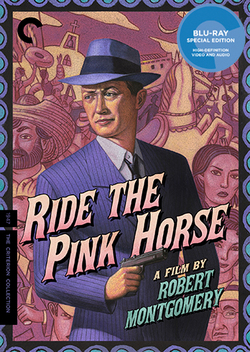
104. RIDE THE PINK HORSE (1947)
Directed by Robert Montgomery. Starring: Robert Montgomery, Wanda Hendrix, Thomas Gomez
Robert Montgomery directs and stars in this odd little off-kilter border noir, based on Dorothy B. Hughes' novel. Montgomery, a veteran of scores of pre-war screwball comedies, channels the same abrasive, hard-jawed, tough guy persona he cultivated playing Chandler's Marlowe in "Lady in the Lake," this time inhabiting the role of hard-edged ex-G.I. Lucky Gagin, who gets off a bus in San Pablo, a New Mexican resort town busy celebrating an annual fiesta in which the "God of Bad Luck" is burned. Gagin is hunting the rich and powerful gangster who killed his war buddy. When he finally catches up to his target, the smarmy, hearing-impaired heavy tells him, "You used to think if you were a square guy, worked hard, played on the level, things would come your way. You found out you were wrong. All you get is pushed around." Gagin is aided in his quest by the operator of the carousel from which the film's title is derived, Pancho (Thomas Gomez, the first Latin American to be nominated for an Oscar for his performance), a big-bellied, silver-tongued souse with a heart of gold, and Pila (Wanda Hendrix), an otherworldly, big-eyed country bumpkin Indian girl who Gagin derisively calls "Sitting Bull." Upon first meeting Gagin, Pila foresees the pugnacious gringo dead, and, despite his surliness, she spends the rest of the movie trying to save him from that vision. While "Pink Horse" doesn't rise to the level of Orson Welles' border noir, "Touch of Evil," it has its moments, such as the shocking and powerful scene in which two brutal thugs mercilessly beat Pancho behind the carousel while dozens of kids watch in horror from the rotating horses. ***
Directed by Robert Montgomery. Starring: Robert Montgomery, Wanda Hendrix, Thomas Gomez
Robert Montgomery directs and stars in this odd little off-kilter border noir, based on Dorothy B. Hughes' novel. Montgomery, a veteran of scores of pre-war screwball comedies, channels the same abrasive, hard-jawed, tough guy persona he cultivated playing Chandler's Marlowe in "Lady in the Lake," this time inhabiting the role of hard-edged ex-G.I. Lucky Gagin, who gets off a bus in San Pablo, a New Mexican resort town busy celebrating an annual fiesta in which the "God of Bad Luck" is burned. Gagin is hunting the rich and powerful gangster who killed his war buddy. When he finally catches up to his target, the smarmy, hearing-impaired heavy tells him, "You used to think if you were a square guy, worked hard, played on the level, things would come your way. You found out you were wrong. All you get is pushed around." Gagin is aided in his quest by the operator of the carousel from which the film's title is derived, Pancho (Thomas Gomez, the first Latin American to be nominated for an Oscar for his performance), a big-bellied, silver-tongued souse with a heart of gold, and Pila (Wanda Hendrix), an otherworldly, big-eyed country bumpkin Indian girl who Gagin derisively calls "Sitting Bull." Upon first meeting Gagin, Pila foresees the pugnacious gringo dead, and, despite his surliness, she spends the rest of the movie trying to save him from that vision. While "Pink Horse" doesn't rise to the level of Orson Welles' border noir, "Touch of Evil," it has its moments, such as the shocking and powerful scene in which two brutal thugs mercilessly beat Pancho behind the carousel while dozens of kids watch in horror from the rotating horses. ***
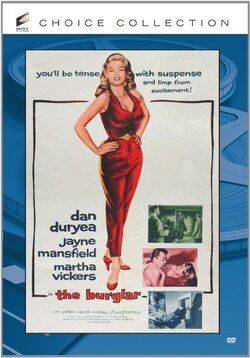
105. THE BURGLAR (1957)
Directed by Paul Wendkos. Starring: Dan Duryea, Jayne Mansfield
Dan Duryea finally gets a starring vehicle, and brother does he run with it in this gritty little gem based on David Goodis' novel (he also wrote the script) about a jewel heist with broader themes of love and loyalty. Always a great character actor but usually playing the slick heavy, Duryea plays Nat, a sad-eyed career crook with a past and a soft spot for his little "sister," Gladden, played deliciously by Jayne Mansfield. The two are part of a small gang of thieves who steal a valuable necklace from a fake spiritualist, and then have to lay low until things cool down before fencing their boodle. Things begin to go awry when Charlie, a crooked cop (Stewart Bradley) gets wise to the scheme and attempts to cut himself in for the whole prize. As tensions -- sexual and other -- mount amongst the bickering family of thieves, Charlie and his partner, Della (Martha Vickers) go to work on Nat and Gladden. A real treat for noir fans. ***1/2
Directed by Paul Wendkos. Starring: Dan Duryea, Jayne Mansfield
Dan Duryea finally gets a starring vehicle, and brother does he run with it in this gritty little gem based on David Goodis' novel (he also wrote the script) about a jewel heist with broader themes of love and loyalty. Always a great character actor but usually playing the slick heavy, Duryea plays Nat, a sad-eyed career crook with a past and a soft spot for his little "sister," Gladden, played deliciously by Jayne Mansfield. The two are part of a small gang of thieves who steal a valuable necklace from a fake spiritualist, and then have to lay low until things cool down before fencing their boodle. Things begin to go awry when Charlie, a crooked cop (Stewart Bradley) gets wise to the scheme and attempts to cut himself in for the whole prize. As tensions -- sexual and other -- mount amongst the bickering family of thieves, Charlie and his partner, Della (Martha Vickers) go to work on Nat and Gladden. A real treat for noir fans. ***1/2
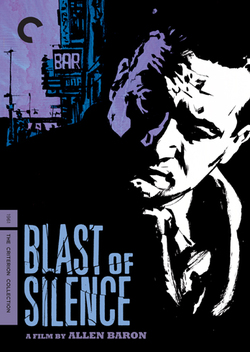
106. BLAST OF SILENCE (1961)
Directed by Allen Baron. Starring: Allen Baron
Bleak, low-budget portrait of a misanthropic hit man on a job during Christmas season in Manhattan. The scenes of paid killer Frankie Bono (Allen Baron, who also wrote and directed) walking alone through the crowded city surrounded by Christmas music are particularly haunting. Told almost exclusively in narration, with a brassy jazz score, this is as desolate as it gets. ***1/2
Directed by Allen Baron. Starring: Allen Baron
Bleak, low-budget portrait of a misanthropic hit man on a job during Christmas season in Manhattan. The scenes of paid killer Frankie Bono (Allen Baron, who also wrote and directed) walking alone through the crowded city surrounded by Christmas music are particularly haunting. Told almost exclusively in narration, with a brassy jazz score, this is as desolate as it gets. ***1/2
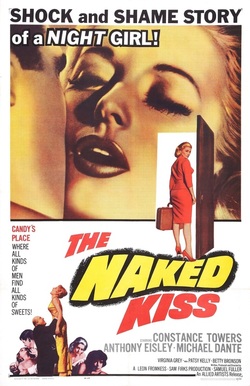
107. THE NAKED KISS (1964)
Directed by Samuel Fuller. Starring: Constance Towers
Sam Fuller's low-budget shocker is a hard look at the nightmarish world of prostitution and perversion, with Constance Towers portraying a call girl trying to go straight, with every card in the deck stacked against her. Towers gives an emotionally raw performance as Kelly, a bald-headed beauty who, at the film's outset, is beating her drunken pimp into submission after he stole from her and then cut all her hair off when she was unconscious. But when the tables are turned, Kelly only takes the $75 the pimp owes her out of a roll of $800. Fleeing town (we later learn the pimp put an acid-hit out on her), she lands in the small town of Grantville, where she attempts to turn her life around, becoming a nurse in a hospital for handicapped kids. She's an angel of mercy, and not just for the children, but for other young women teetering on the brink of disaster. But just as she's about to live out her dreams and marry the wealthy scion of Grantville's founding fathers, it all comes crashing down around her in a lurid nightmare scenario. Fuller never pulls his punches, and he certainly doesn't here. Though the story takes some ludicrous turns at times, The Naked Kiss still has the power to shock 50 years after its release. ***
Directed by Samuel Fuller. Starring: Constance Towers
Sam Fuller's low-budget shocker is a hard look at the nightmarish world of prostitution and perversion, with Constance Towers portraying a call girl trying to go straight, with every card in the deck stacked against her. Towers gives an emotionally raw performance as Kelly, a bald-headed beauty who, at the film's outset, is beating her drunken pimp into submission after he stole from her and then cut all her hair off when she was unconscious. But when the tables are turned, Kelly only takes the $75 the pimp owes her out of a roll of $800. Fleeing town (we later learn the pimp put an acid-hit out on her), she lands in the small town of Grantville, where she attempts to turn her life around, becoming a nurse in a hospital for handicapped kids. She's an angel of mercy, and not just for the children, but for other young women teetering on the brink of disaster. But just as she's about to live out her dreams and marry the wealthy scion of Grantville's founding fathers, it all comes crashing down around her in a lurid nightmare scenario. Fuller never pulls his punches, and he certainly doesn't here. Though the story takes some ludicrous turns at times, The Naked Kiss still has the power to shock 50 years after its release. ***
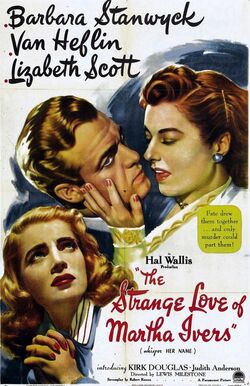
108. THE STRANGE LOVE OF MARTHA IVERS (1946)
Directed by Lewis Milestone. Starring: Barbara Stanwyck, Van Heflin, Kirk Douglas
Haunting, dark melodrama spans decades telling the story of three children whose lives are inextricably bound by a murder. Young orphan Martha Ivers -- played as a grownup by Barbara Stanwyck -- is being raised by her rich, cruel aunt (Judith Anderson) in a giant, shadowy mansion. 13-year-old Martha keeps trying to run away with ne'er-do-well scamp Sam Masterson (played as an adult by Van Heflin), but is constantly thwarted by the long reach of her aunt, who owns enough of the Pennsylvania factory town of Iverstown to control the police. One stormy night, Martha is returned home by the cops after another foiled escape attempt, but aunty goes too far when she starts whaling on Martha's kitty with her cane. Aunty winds up dead, the murder witnessed by Walter O'Neil, the wimpy son of Martha's tutor, who -- also in the mansion that night -- seizes upon this fact to secure half of Martha's inherited fortune for his son by blackmailing the girl. Years later, when Walter (played as an adult by Kirk Douglas, in his first film role) is the D.A. and married to Martha in a loveless marriage, the two frame an innocent shlub for the crime, and the shlub is hanged. Meanwhile, Sam -- who had vanished that night after (Martha and Walter assume) witnessing the crime -- drifts back into town. He's a combat veteran and somewhat mysterious gambler now, just passing through, but his car gets banged up and he's stuck in Iverstown until it gets fixed. While waiting, he meets fetching jailbird Toni Marachek (played fetchingly by Lizabeth Scott), who has troubles of her own. Walter assumes Sam is there to blackmail them over the murder, but really, all Sam wants to do is get his car back and head west with the sultry Toni. But Martha, still obsessing over Sam, has other ideas. In the film's climax, Martha pleads with Sam to murder Walter and take his place beside the throne. All three leads are terrific, but it is Stanwyck who again brings the chills as a cold-blooded murderess. ***1/2
Directed by Lewis Milestone. Starring: Barbara Stanwyck, Van Heflin, Kirk Douglas
Haunting, dark melodrama spans decades telling the story of three children whose lives are inextricably bound by a murder. Young orphan Martha Ivers -- played as a grownup by Barbara Stanwyck -- is being raised by her rich, cruel aunt (Judith Anderson) in a giant, shadowy mansion. 13-year-old Martha keeps trying to run away with ne'er-do-well scamp Sam Masterson (played as an adult by Van Heflin), but is constantly thwarted by the long reach of her aunt, who owns enough of the Pennsylvania factory town of Iverstown to control the police. One stormy night, Martha is returned home by the cops after another foiled escape attempt, but aunty goes too far when she starts whaling on Martha's kitty with her cane. Aunty winds up dead, the murder witnessed by Walter O'Neil, the wimpy son of Martha's tutor, who -- also in the mansion that night -- seizes upon this fact to secure half of Martha's inherited fortune for his son by blackmailing the girl. Years later, when Walter (played as an adult by Kirk Douglas, in his first film role) is the D.A. and married to Martha in a loveless marriage, the two frame an innocent shlub for the crime, and the shlub is hanged. Meanwhile, Sam -- who had vanished that night after (Martha and Walter assume) witnessing the crime -- drifts back into town. He's a combat veteran and somewhat mysterious gambler now, just passing through, but his car gets banged up and he's stuck in Iverstown until it gets fixed. While waiting, he meets fetching jailbird Toni Marachek (played fetchingly by Lizabeth Scott), who has troubles of her own. Walter assumes Sam is there to blackmail them over the murder, but really, all Sam wants to do is get his car back and head west with the sultry Toni. But Martha, still obsessing over Sam, has other ideas. In the film's climax, Martha pleads with Sam to murder Walter and take his place beside the throne. All three leads are terrific, but it is Stanwyck who again brings the chills as a cold-blooded murderess. ***1/2
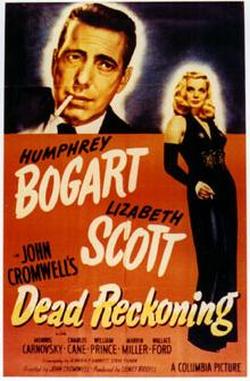
109. DEAD RECKONING (1947)
Directed by John Cromwell. Starring: Humphrey Bogart, Lizabeth Scott
Talky post-war potboiler about a paratrooper captain getting involved in a murder case while searching for his missing war buddy. Humphrey Bogart is Captain "Rip" Murdock, on the way to Washington by train with his pal, Sergeant Johnny Drake. But when Johnny finds out he's to receive the Medal of Honor, he takes off. On a mission to find out what's cooking with Johnny, Rip goes AWOL and follows the clues to "Gulf City," somewhere in the south. That's where he finds a charbroiled corpse from a car wreck -- Johnny. Then there's Johnny's old flame, Coral (Lizabeth Scott), and a slick gangster named Martinelli (Morris Carnovsky) and his brain-addled thug, Krause (Marvin Miller), all mixed up in a murder case from before the war. Rip investigates, and falls for Coral, while at the same time suspecting her. There's a dopey scene in which Rip tells Coral his views on women -- they should be shrunk down and stuffed in their man's pocket so they won't "interrupt" him while he's having fun with the boys -- until he's ready for her to be life-size, that is. It's all told in flashback, with a heavy voice-over by Bogie, and the ending has dialog lifted almost word-for-word from The Maltese Falcon, a much better film. Still, Bogie's fun to watch, and so is Scott, once you take her out of your pocket. ***
Directed by John Cromwell. Starring: Humphrey Bogart, Lizabeth Scott
Talky post-war potboiler about a paratrooper captain getting involved in a murder case while searching for his missing war buddy. Humphrey Bogart is Captain "Rip" Murdock, on the way to Washington by train with his pal, Sergeant Johnny Drake. But when Johnny finds out he's to receive the Medal of Honor, he takes off. On a mission to find out what's cooking with Johnny, Rip goes AWOL and follows the clues to "Gulf City," somewhere in the south. That's where he finds a charbroiled corpse from a car wreck -- Johnny. Then there's Johnny's old flame, Coral (Lizabeth Scott), and a slick gangster named Martinelli (Morris Carnovsky) and his brain-addled thug, Krause (Marvin Miller), all mixed up in a murder case from before the war. Rip investigates, and falls for Coral, while at the same time suspecting her. There's a dopey scene in which Rip tells Coral his views on women -- they should be shrunk down and stuffed in their man's pocket so they won't "interrupt" him while he's having fun with the boys -- until he's ready for her to be life-size, that is. It's all told in flashback, with a heavy voice-over by Bogie, and the ending has dialog lifted almost word-for-word from The Maltese Falcon, a much better film. Still, Bogie's fun to watch, and so is Scott, once you take her out of your pocket. ***
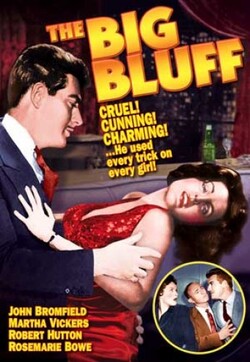
110. THE BIG BLUFF (1955)
Directed by W. Lee Wilder. Starring: Martha Vickers, John Bromfield, Rosemarie Bowe
Billy Wilder's less-talented brother, W. Lee Wilder, produced and directed this fabulous no-budget B-flick about a gigolo (John Bromfield) and his no-good girlfriend (Rosemarie Bowe) and their attempt to swindle a terminally ill socialite (Martha Vickers) out of her fortune. The fabulous part comes at the end, in the form of one of the all-time great plot twists. ***
Directed by W. Lee Wilder. Starring: Martha Vickers, John Bromfield, Rosemarie Bowe
Billy Wilder's less-talented brother, W. Lee Wilder, produced and directed this fabulous no-budget B-flick about a gigolo (John Bromfield) and his no-good girlfriend (Rosemarie Bowe) and their attempt to swindle a terminally ill socialite (Martha Vickers) out of her fortune. The fabulous part comes at the end, in the form of one of the all-time great plot twists. ***
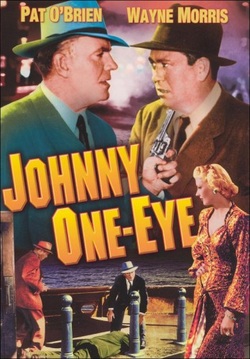
111. JOHNNY ONE-EYE (1950)
Directed by Robert Florey. Starring: Pat O'Brien
Sappy, zero-budget tale about former gangster turned legit Martin Martin (Pat O'Brien), whose past comes back to haunt him when his former partner, the craven Dane Cory (played by big lug Wayne Morris), sets him up to take the rap for a killing they were involved in many years ago. When Martin pays Cory a visit to try to persuade him not to rat him out, a shootout ensues, leaving Cory's henchman dead and Martin badly wounded. Stumbling around with a bullet in his shoulder, Martin takes refuge in an abandoned building next door to the apartment building where Cory's girlfriend -- a burlesque star known as "Beautiful Mama" -- lives with her little girl, figuring Cory will show sooner or later. While he's hiding out and waiting, Martin adopts an injured dog he names Johnny One-Eye. Call me a sap, but I think I have something in my eye. ***
Directed by Robert Florey. Starring: Pat O'Brien
Sappy, zero-budget tale about former gangster turned legit Martin Martin (Pat O'Brien), whose past comes back to haunt him when his former partner, the craven Dane Cory (played by big lug Wayne Morris), sets him up to take the rap for a killing they were involved in many years ago. When Martin pays Cory a visit to try to persuade him not to rat him out, a shootout ensues, leaving Cory's henchman dead and Martin badly wounded. Stumbling around with a bullet in his shoulder, Martin takes refuge in an abandoned building next door to the apartment building where Cory's girlfriend -- a burlesque star known as "Beautiful Mama" -- lives with her little girl, figuring Cory will show sooner or later. While he's hiding out and waiting, Martin adopts an injured dog he names Johnny One-Eye. Call me a sap, but I think I have something in my eye. ***
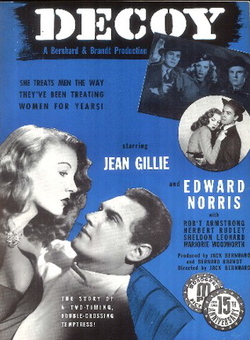
112. DECOY (1946)
Directed by Jack Bernhard. Starring: Jean Gillie
Lurid, low-budget noir, notable for having one of noir’s most evil femme fatales. Margot Shelby (Jean Gillie), moll to gangster Frankie Olins, will stop at nothing to get her greedy hands on the 400 grand that Frankie stole in a bank robbery. That includes seducing good-guy Dr. Lloyd Craig into resurrecting Frankie after his execution by cyanide gas for killing a bank guard during the holdup. The good Doctor, once an upstanding, caring, hard-working physician to the poor, soon finds himself so entranced by Margot’s wiles that he’s stealing Frankie’s corpse from the prison and reviving him with an antidote called "methylene blue," so Margot can wheedle out of him where he buried the loot. Not very good but highly entertaining at times. Macabre plot and depravity of the femme fatale, as played by Gillie, set this one apart despite some amateurish performances and sets. **1/2
Directed by Jack Bernhard. Starring: Jean Gillie
Lurid, low-budget noir, notable for having one of noir’s most evil femme fatales. Margot Shelby (Jean Gillie), moll to gangster Frankie Olins, will stop at nothing to get her greedy hands on the 400 grand that Frankie stole in a bank robbery. That includes seducing good-guy Dr. Lloyd Craig into resurrecting Frankie after his execution by cyanide gas for killing a bank guard during the holdup. The good Doctor, once an upstanding, caring, hard-working physician to the poor, soon finds himself so entranced by Margot’s wiles that he’s stealing Frankie’s corpse from the prison and reviving him with an antidote called "methylene blue," so Margot can wheedle out of him where he buried the loot. Not very good but highly entertaining at times. Macabre plot and depravity of the femme fatale, as played by Gillie, set this one apart despite some amateurish performances and sets. **1/2
